We earn commissions if you shop through the links below. Read more
Resume Writing Business
Back to All Business Ideas

13 Steps to Starting a Profitable Resume Writing Service
Written by: Carolyn Young
Carolyn Young is a business writer who focuses on entrepreneurial concepts and the business formation. She has over 25 years of experience in business roles, and has authored several entrepreneurship textbooks.
Edited by: David Lepeska
David has been writing and learning about business, finance and globalization for a quarter-century, starting with a small New York consulting firm in the 1990s.
Published on February 26, 2022

Investment range
$1,950 - $6,700
Revenue potential
$40,000 - $100,000 p.a.
Time to build
0 – 3 months
Profit potential
$36,000 - $90,000 p.a.
Industry trend
These are the key elements to think about when starting your resume-writing business:
- Skill and certification — Ensure you have strong writing skills, an understanding of various industries, and the ability to tailor resumes to specific job roles. Consider obtaining certifications such as Certified Professional Resume Writer (CPRW) or Nationally Certified Resume Writer (NCRW) to enhance your credibility.
- Computer and software — Invest in a reliable computer and software for word processing (e.g., Microsoft Word) and design (e.g., Adobe InDesign). Develop a library of resume templates, cover letter templates, and other resources to streamline your process.
- Niche — Decide on the types of services you will offer, such as resume writing, cover letter writing, LinkedIn profile optimization, career coaching, and interview preparation.
- Register your business — A limited liability company (LLC) is the best legal structure for new businesses because it is fast and simple. Form your business immediately using ZenBusiness LLC formation service or hire one of the best LLC services on the market.
- Legal business aspects — Register for taxes, open a business bank account, and get an EIN .
- Website and online presence — Create a professional website showing your services, portfolio, client testimonials, and contact information. Maintain active social media profiles to engage with potential clients. Use cloud storage (e.g., Google Drive, Dropbox) for easy access to client documents and secure backup.
Interactive Checklist at your fingertips—begin your resume writing business today!
You May Also Wonder:
How profitable can a resume writing business be?
You can make $100 to $400 per resume, and your expenses will be very low, so it can be very profitable once you get going and start to get a lot of customers.
How can I get professional resume writing certification?
You can get certification through the National Resume Writers Association for about $500. It requires 10 hours of continuing education which can be from a variety of sources.
How can I attract clients and market my resume writing services?
To attract clients and market your resume writing services, create a professional website or online portfolio showcasing your expertise and success stories. Utilize social media platforms and professional networking sites to share valuable content, such as resume tips or industry insights.
How can I tailor resumes for specific industries or job positions?
Tailoring resumes for specific industries or job positions involves conducting thorough research on the target industry or position. Analyze job descriptions, industry trends, and desired skills to understand employers’ expectations. Customize the resume’s content, format, and keywords to highlight relevant skills, experiences, and achievements. Showcase how the candidate’s qualifications align with the specific requirements of the industry or position.
How can I handle revisions and edits to meet clients’ expectations?
Establish a clear process for client feedback and revisions. Actively inquire about their preferences, objectives, and any specific requirements. Maintain open lines of communication and promptly address any concerns or requests. Provide clear explanations for suggested changes and work collaboratively to find the best solution.
Can I start resume writing business on the side?
Yes, starting a resume writing business on the side is possible. It allows you to gradually build your client base and refine your skills while maintaining other commitments. However, ensure that you can manage your time effectively and deliver high-quality work to clients.
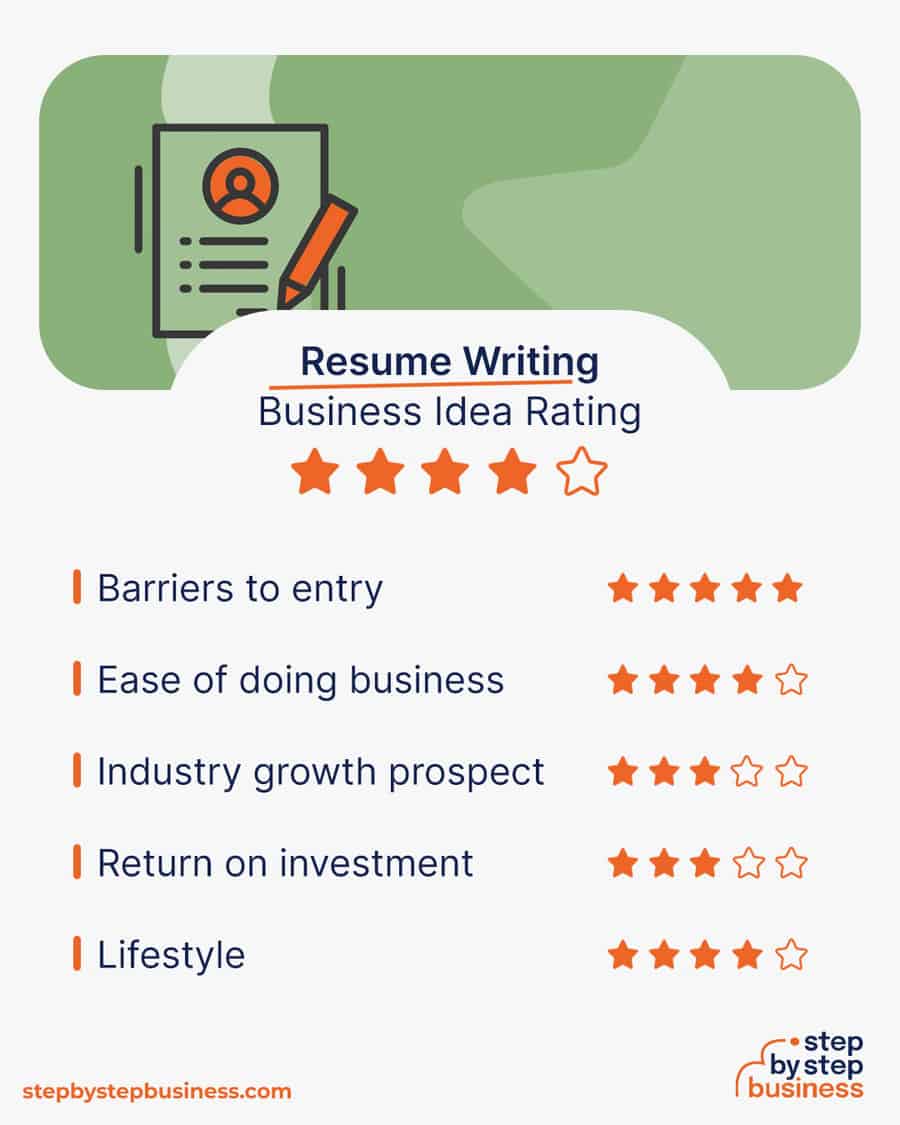
Step 1: Decide if the Business Is Right for You
Pros and cons.
Starting a resume writing business has pros and cons to consider before deciding if it’s right for you.
- Flexibility – Work from home on your own time
- Good Money – $200 per page is serious income
- Valuable Service – Help people get jobs!
- Low Startup Costs – Computer and software needed only
- Competitive Market – Market is saturated with resume writing services
- Repetitive Work – Writing resumes can get old fast
Resume writing industry trends
Industry size and growth.
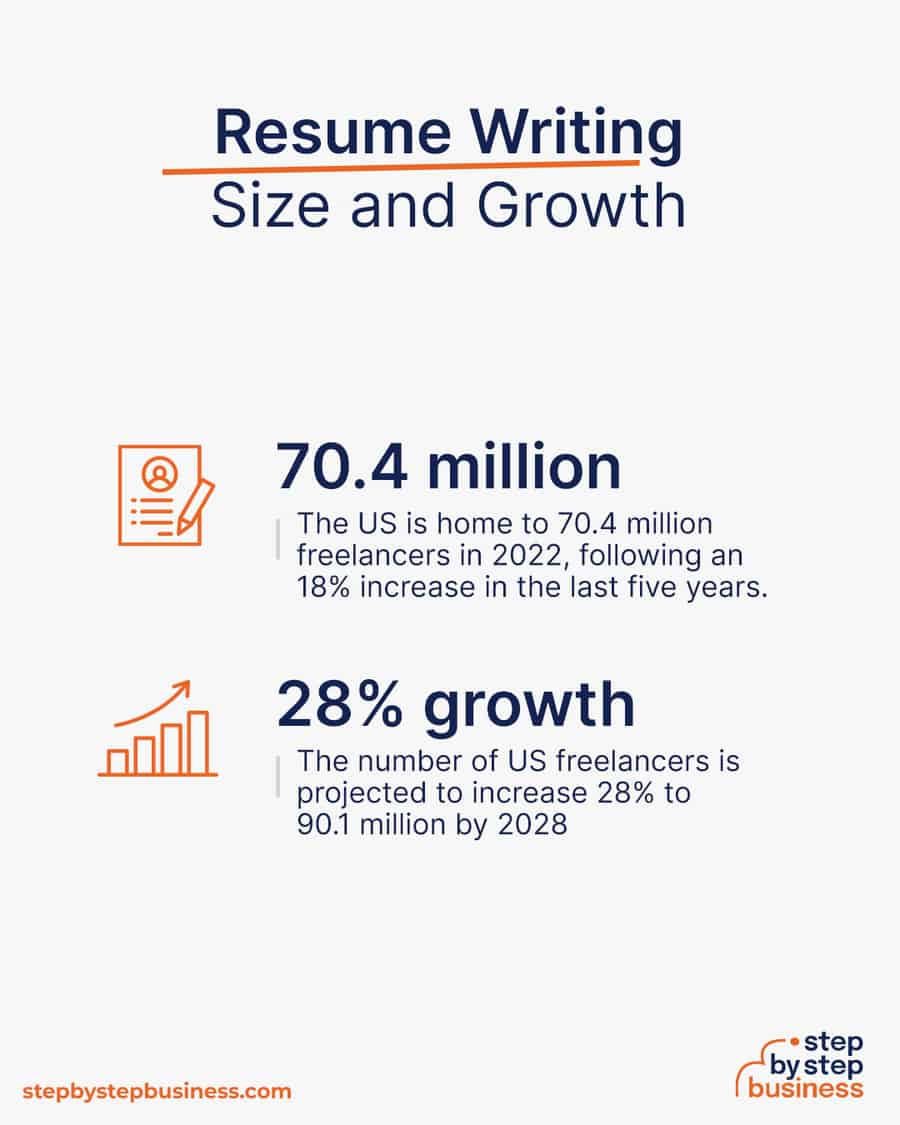
Little information is available on the resume writing industry; however, many resume writers are freelancers, so we will look at the number of US freelancers.
- Industry size and past growth – The US is home to 70.4 million freelancers in 2022, following an 18% increase in the last five years.(( https://www.statista.com/statistics/921593/gig-economy-number-of-freelancers-us/ ))
- Growth forecast – The number of US freelancers is projected to increase 28% to 90.1 million by 2028.
Trends and challenges
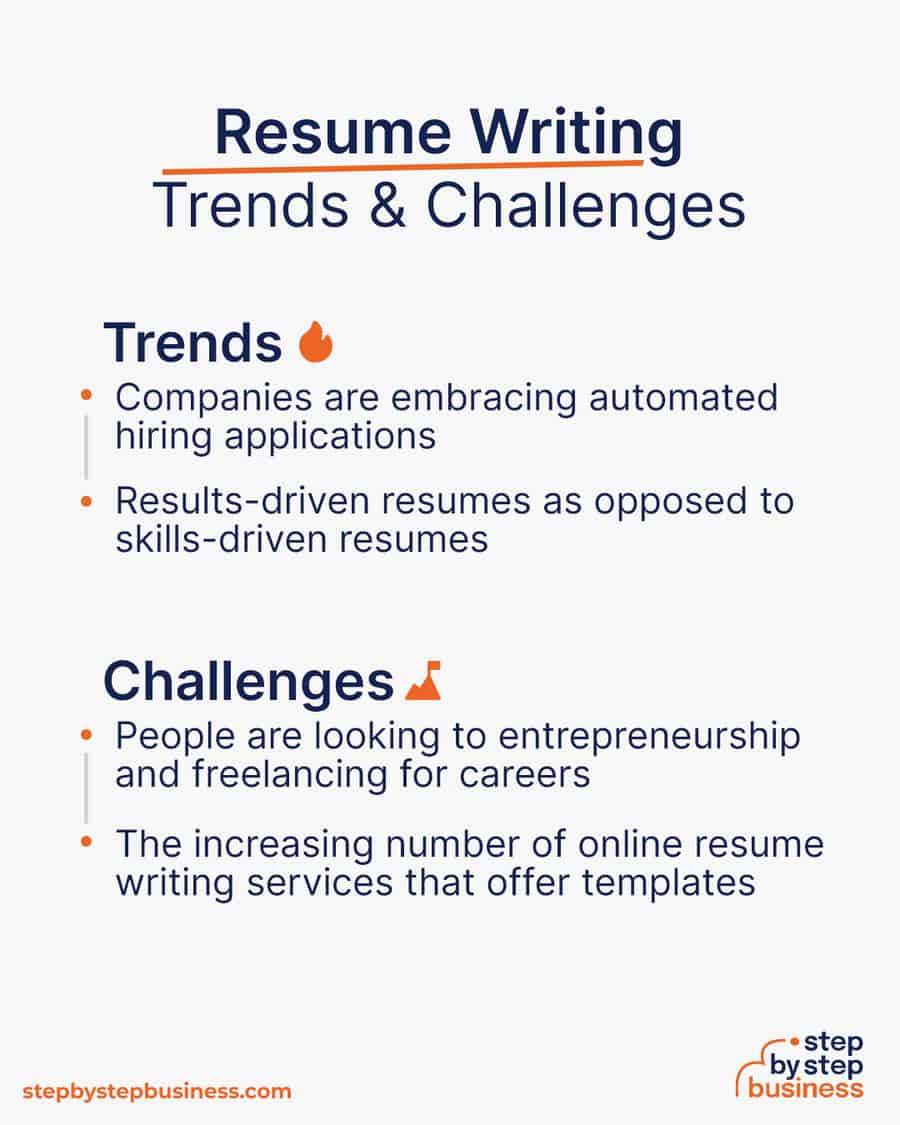
Trends in the resume writing industry include:
- Companies are embracing automated hiring applications, which means resume writers need to be more aware of adding keywords when adding details to resumes.
- Results-driven resumes as opposed to skills-driven resumes are becoming more important to employers. Employers want to see actual achievements, so “spearheaded a marketing campaign that had 30% return on investment” is much better than a bullet mentioning “marketing skills”.
Challenges in the resume writing industry include:
- More and more people are looking to entrepreneurship and freelancing for careers, decreasing the need for traditional resumes. Instead, job seekers are polishing their resumes on sites like LinkedIn and Upwork, which offers another opportunity for resume writers.
- The increasing number of online resume writing services that offer templates for resumes is making the field more competitive.
What kind of people work in resume writing?
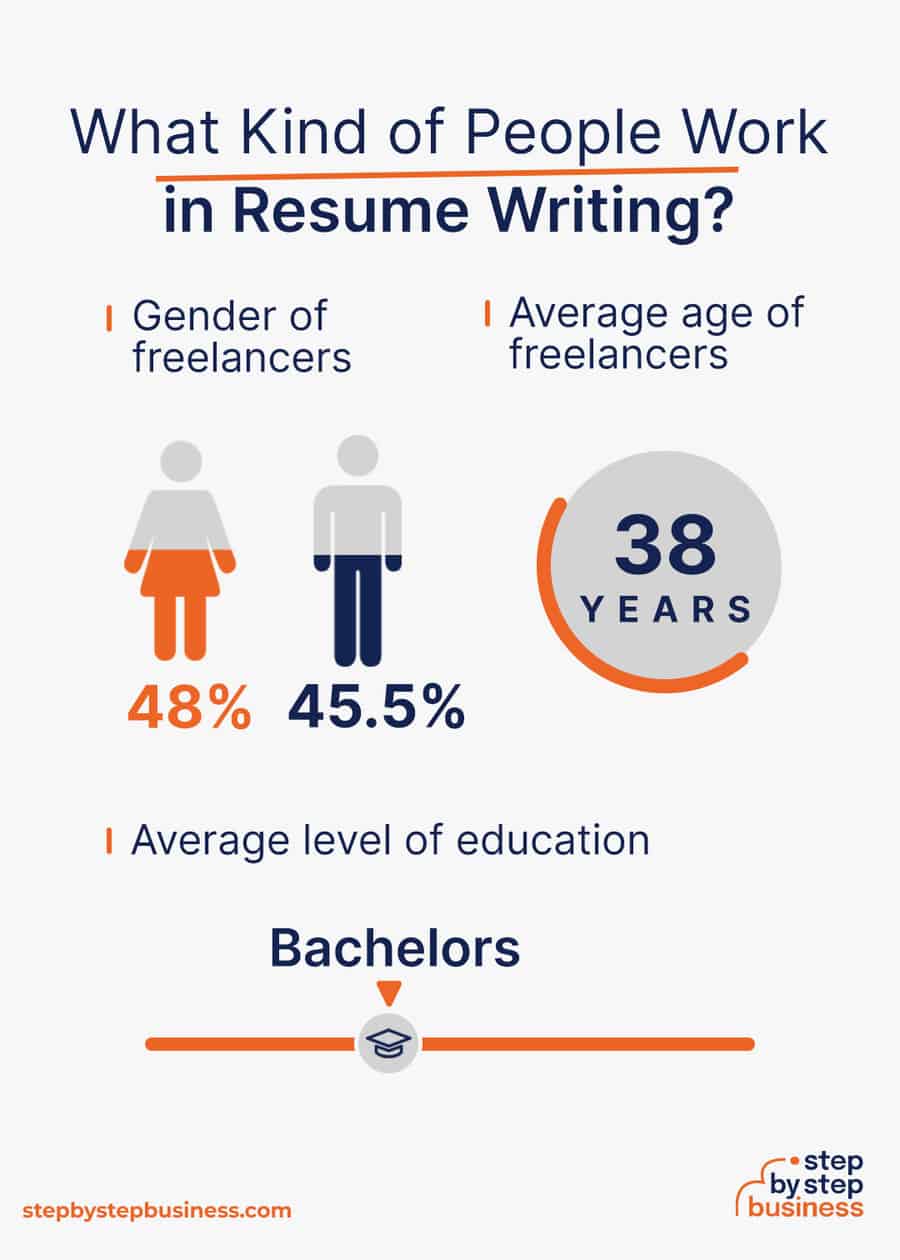
- Gender – 48% of freelancers are female, while 45.5% are male.(( https://www.zippia.com/freelancer-jobs/demographics/ ))
- Average level of education – The average freelancer has a bachelor’s degree.
- Average age – The average US freelancer is 38 years old.
How much does it cost to start a resume writing business?
Startup costs for a resume writing business range from $2,000 to nearly $7,000. The low end assumes you already have a computer and includes the cost of a website and resume writing certification. The high end includes the purchase of a computer.
You can become a certified resume writer through the National Resume Writers Association for about $500. It requires 10 hours of courses with any of the suggested online institutions.
How much can you earn from a resume writing business?
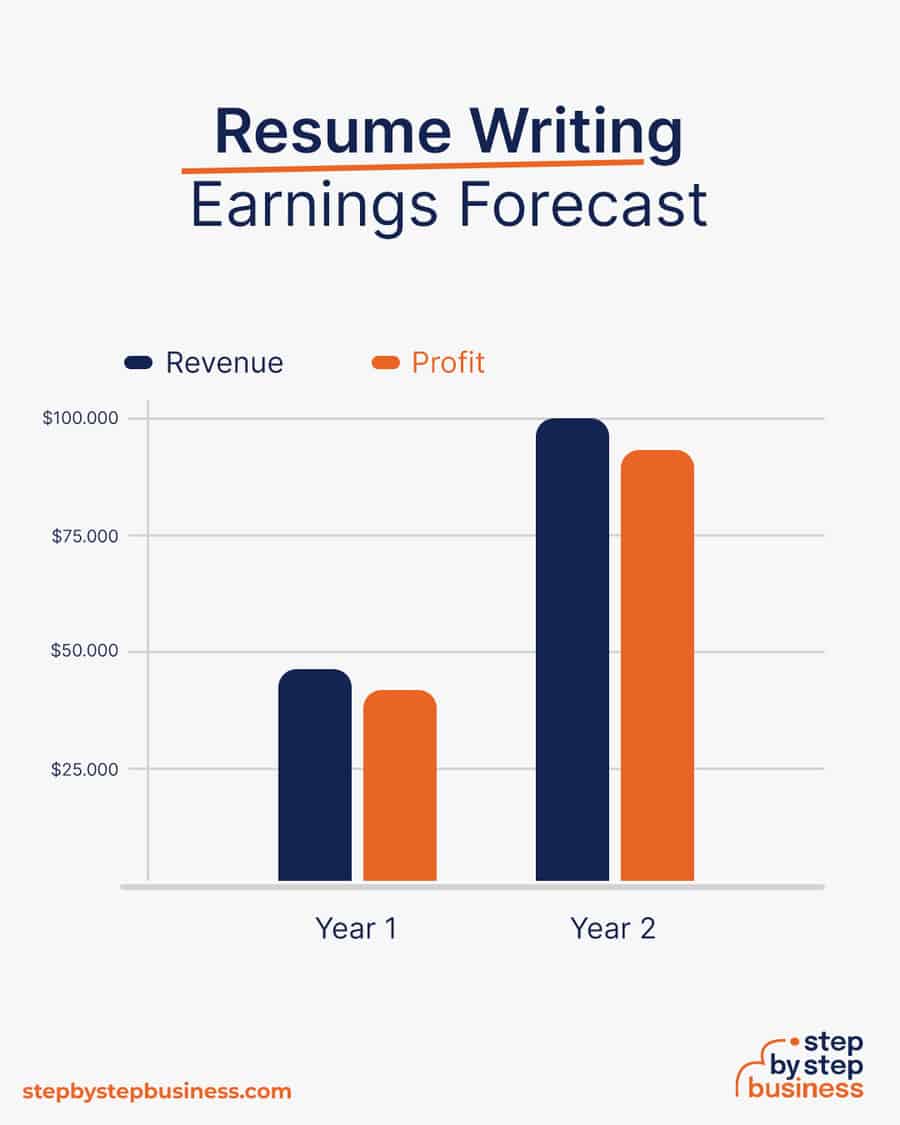
The cost of a professional resume runs from $100 to as high as $400, with the average around $200. Your profit margin should be about 90% after expenses.
In your first year or two, you could work from home and write four $200 resumes per week, bringing in more than $40,000 in annual revenue. This would mean about $36,000 in profit, assuming that 90% margin. As you begin to get referrals, you could do 10 resumes per week. With annual revenue of more than $100,000, you’d make a tidy profit of around $90,000.
What barriers to entry are there?
There are a few barriers to entry for a resume writing business. Your biggest challenges will be:
- Certification and writing strong, appealing resumes
- Competition from resume writing services
Related Business Ideas

How to Become a Freelance Writer: A Beginner’s Guide

13 Easy Steps to Start a Tutoring Business

13 Steps for Starting Your Recruitment Agency
Step 2: hone your idea.
Now that you know what’s involved in starting a resume writing business, it’s a good idea to hone your concept in preparation to enter a competitive market.
Market research will give you the upper hand, even if you’re already positive that you have a perfect product or service. Conducting market research is important, because it can help you understand your customers better, who your competitors are, and your business landscape.
Why? Identify an opportunity
Research resume writing services in your area and online to examine their services, price points, and customer reviews. You’re looking for a market gap to fill. For instance, maybe the market is missing a resume writing service that also offers career coaching.
You might consider targeting a niche market by specializing in a certain aspect of your industry, such as resumes for business managers.
This could jumpstart your word-of-mouth marketing and attract clients right away.
What? Determine your services
Your resume services are fairly straightforward, but you could offer additional services such as:
- Cover letter writing
- Assistance with job applications
- Job interview coaching
- Executive headhunting
How much should you charge for resume writing?
Professional resume writers charge from $100 to $400 per resume. For high-level executive resumes, prices can be even higher. Your expenses will be minimal, limited to marketing costs, so you should aim for a profit margin of about 90%.
Once you know your costs, you can use this Step By Step profit margin calculator to determine your mark-up and final price points. Remember, the prices you use at launch should be subject to change if warranted by the market.
Who? Identify your target market
Your target market will be job seekers who need a great resume professionally written. This is fairly broad, but your best bet for marketing will be LinkedIn. Job seekers network on LinkedIn to look for opportunities.
Where? Choose your business premises
In the early stages, you may want to run your business from home to keep costs low. But as your business grows, you may want to rent out an office to meet clients. Find commercial space to rent in your area on sites such as Craigslist , Crexi , and Instant Offices .
When choosing a commercial space, you may want to follow these rules of thumb:
- Central location accessible via public transport
- Ventilated and spacious, with good natural light
- Flexible lease that can be extended as your business grows
- Ready-to-use space with no major renovations or repairs needed
Step 3: Brainstorm a Resume Writing Business Name
Here are some ideas for brainstorming your business name:
- Short, unique, and catchy names tend to stand out
- Names that are easy to say and spell tend to do better
- Name should be relevant to your product or service offerings
- Ask around — family, friends, colleagues, social media — for suggestions
- Including keywords, such as “resumes” or “resume writing”, boosts SEO
- Name should allow for expansion, for ex: “CareerWorks” over “Healthcare Career Solutions”
- A location-based name can help establish a strong connection with your local community and help with the SEO but might hinder future expansion
Once you’ve got a list of potential names, visit the website of the US Patent and Trademark Office to make sure they are available for registration and check the availability of related domain names using our Domain Name Search tool. Using “.com” or “.org” sharply increases credibility, so it’s best to focus on these.
Find a Domain
Powered by GoDaddy.com
Finally, make your choice among the names that pass this screening and go ahead with domain registration and social media account creation. Your business name is one of the key differentiators that sets your business apart. Once you pick your company name, and start with the branding, it is hard to change the business name. Therefore, it’s important to carefully consider your choice before you start a business entity.
Step 4: Create a Resume Writing Business Plan
Here are the key components of a business plan:

- Executive Summary: Summarize your resume writing business’s objectives, the services it will offer, and how it will meet the career advancement needs of clients.
- Business Overview: Outline the professional writing services you provide, specializing in crafting resumes, cover letters, and LinkedIn profiles.
- Product and Services: Detail the range of services, from entry-level to executive resume writing, including career coaching and interview preparation.
- Market Analysis: Evaluate the job market and the demand for professional resume writing services among job seekers in various industries.
- Competitive Analysis: Identify competing resume writing services and explain your competitive advantages, such as personalized service or niche expertise.
- Sales and Marketing: Describe how you will market your services to job seekers, through online advertising, workshops, or partnerships with career services.
- Management Team: Highlight your qualifications and those of any team members in professional writing, human resources, or career counseling.
- Operations Plan: Outline your process for client consultations, document creation, revisions, and delivery.
- Financial Plan: Provide a breakdown of pricing, costs, and revenue projections for your resume writing services.
- Appendix: Include additional resources such as client testimonials, sample resumes, or detailed market research to support your business plan.
If you’ve never created a business plan, it can be an intimidating task. You might consider hiring a business plan specialist to create a top-notch business plan for you.
Step 5: Register Your Business
Registering your business is an absolutely crucial step — it’s the prerequisite to paying taxes, raising capital, opening a bank account, and other guideposts on the road to getting a business up and running.
Plus, registration is exciting because it makes the entire process official. Once it’s complete, you’ll have your own business!
Choose where to register your company
Your business location is important because it can affect taxes, legal requirements, and revenue. Most people will register their business in the state where they live, but if you’re planning to expand, you might consider looking elsewhere, as some states could offer real advantages when it comes to resume writing businesses.
If you’re willing to move, you could really maximize your business! Keep in mind, it’s relatively easy to transfer your business to another state.
Choose your business structure
Business entities come in several varieties, each with its pros and cons. The legal structure you choose for your resume writing business will shape your taxes, personal liability, and business registration requirements, so choose wisely.
Here are the main options:

- Sole Proprietorship – The most common structure for small businesses makes no legal distinction between company and owner. All income goes to the owner, who’s also liable for any debts, losses, or liabilities incurred by the business. The owner pays taxes on business income on his or her personal tax return.
- General Partnership – Similar to a sole proprietorship, but for two or more people. Again, owners keep the profits and are liable for losses. The partners pay taxes on their share of business income on their personal tax returns.
- Limited Liability Company (LLC) – Combines the characteristics of corporations with those of sole proprietorships or partnerships. Again, the owners are not personally liable for debts.
- C Corp – Under this structure, the business is a distinct legal entity and the owner or owners are not personally liable for its debts. Owners take profits through shareholder dividends, rather than directly. The corporation pays taxes, and owners pay taxes on their dividends, which is sometimes referred to as double taxation.
- S Corp – An S-Corporation refers to the tax classification of the business but is not a business entity. An S-Corp can be either a corporation or an LLC , which just need to elect to be an S-Corp for tax status. In an S-Corp, income is passed through directly to shareholders, who pay taxes on their share of business income on their personal tax returns.
We recommend that new business owners choose LLC as it offers liability protection and pass-through taxation while being simpler to form than a corporation. You can form an LLC in as little as five minutes using an online LLC formation service. They will check that your business name is available before filing, submit your articles of organization , and answer any questions you might have.
Form Your LLC
Choose Your State
We recommend ZenBusiness as the Best LLC Service for 2024

Step 6: Register for Taxes
The final step before you’re able to pay taxes is getting an Employer Identification Number , or EIN. You can file for your EIN online or by mail or fax: visit the IRS website to learn more. Keep in mind, if you’ve chosen to be a sole proprietorship you can simply use your social security number as your EIN.
Once you have your EIN, you’ll need to choose your tax year. Financially speaking, your business will operate in a calendar year (January–December) or a fiscal year, a 12-month period that can start in any month. This will determine your tax cycle, while your business structure will determine which taxes you’ll pay.
The IRS website also offers a tax-payers checklist , and taxes can be filed online.
It is important to consult an accountant or other professional to help you with your taxes to ensure you’re completing them correctly.
Step 7: Fund your Business
Securing financing is your next step and there are plenty of ways to raise capital:

- Bank loans : This is the most common method but getting approved requires a rock-solid business plan and strong credit history.
- SBA-guaranteed loans : The Small Business Administration can act as guarantor, helping gain that elusive bank approval via an SBA-guaranteed loan .
- Government grants : A handful of financial assistance programs help fund entrepreneurs. Visit Grants.gov to learn which might work for you.
- Friends and Family : Reach out to friends and family to provide a business loan or investment in your concept. It’s a good idea to have legal advice when doing so because SEC regulations apply.
- Crowdfunding : Websites like Kickstarter and Indiegogo offer an increasingly popular low-risk option, in which donors fund your vision. Entrepreneurial crowdfunding sites like Fundable and WeFunder enable multiple investors to fund your business.
- Personal : Self-fund your business via your savings or the sale of property or other assets.
Bank and SBA loans are probably the best option, other than friends and family, for funding a resume writing business. You might also try crowdfunding if you have an innovative concept for something like a resume help app.
Step 8: Apply for Licenses and Permits
Starting a resume writing business requires obtaining a number of licenses and permits from local, state, and federal governments.
Federal regulations, licenses, and permits associated with starting your business include doing business as (DBA), health licenses and permits from the Occupational Safety and Health Administration ( OSHA ), trademarks, copyrights, patents, and other intellectual properties, as well as industry-specific licenses and permits.
You may also need state-level and local county or city-based licenses and permits. The license requirements and how to obtain them vary, so check the websites of your state, city, and county governments or contact the appropriate person to learn more.
You could also check this SBA guide for your state’s requirements, but we recommend using MyCorporation’s Business License Compliance Package . They will research the exact forms you need for your business and state and provide them to ensure you’re fully compliant.
This is not a step to be taken lightly, as failing to comply with legal requirements can result in hefty penalties.
If you feel overwhelmed by this step or don’t know how to begin, it might be a good idea to hire a professional to help you check all the legal boxes.
Step 9: Open a Business Bank Account
Before you start making money, you’ll need a place to keep it, and that requires opening a bank account .
Keeping your business finances separate from your personal account makes it easy to file taxes and track your company’s income, so it’s worth doing even if you’re running your resume writing business as a sole proprietorship. Opening a business bank account is quite simple, and similar to opening a personal one. Most major banks offer accounts tailored for businesses — just inquire at your preferred bank to learn about their rates and features.
Banks vary in terms of offerings, so it’s a good idea to examine your options and select the best plan for you. Once you choose your bank, bring in your EIN (or Social Security Number if you decide on a sole proprietorship), articles of incorporation, and other legal documents and open your new account.
Step 10: Get Business Insurance
Business insurance is an area that often gets overlooked yet it can be vital to your success as an entrepreneur. Insurance protects you from unexpected events that can have a devastating impact on your business.
Here are some types of insurance to consider:

- General liability : The most comprehensive type of insurance, acting as a catch-all for many business elements that require coverage. If you get just one kind of insurance, this is it. It even protects against bodily injury and property damage.
- Business Property : Provides coverage for your equipment and supplies.
- Equipment Breakdown Insurance : Covers the cost of replacing or repairing equipment that has broken due to mechanical issues.
- Worker’s compensation : Provides compensation to employees injured on the job.
- Property : Covers your physical space, whether it is a cart, storefront, or office.
- Commercial auto : Protection for your company-owned vehicle.
- Professional liability : Protects against claims from a client who says they suffered a loss due to an error or omission in your work.
- Business owner’s policy (BOP) : This is an insurance plan that acts as an all-in-one insurance policy, a combination of the above insurance types.
Step 11: Prepare to Launch
As opening day nears, prepare for launch by reviewing and improving some key elements of your business.
Essential software and tools
Being an entrepreneur often means wearing many hats, from marketing to sales to accounting, which can be overwhelming. Fortunately, many websites and digital tools are available to help simplify many business tasks.
You may want to use project management software, such as ClickUp , asengana , or Notion , to manage your projects, tasks, and workflows.
- Popular web-based accounting programs for smaller businesses include Quickbooks , Freshbooks , and Xero .
- If you’re unfamiliar with basic accounting, you may want to hire a professional, especially as you begin. The consequences for filing incorrect tax documents can be harsh, so accuracy is crucial.
Develop your website
Website development is crucial because your site is your online presence and needs to convince prospective clients of your expertise and professionalism.
You can create your own website using services like WordPress, Wix, or Squarespace . This route is very affordable, but figuring out how to build a website can be time-consuming. If you lack tech-savvy, you can hire a web designer or developer to create a custom website for your business.
They are unlikely to find your website, however, unless you follow Search Engine Optimization ( SEO ) practices. These are steps that help pages rank higher in the results of top search engines like Google.
Here are some powerful marketing strategies for your future business:
- Offer Free Workshops: Conduct workshops on resume writing at local community centers or online platforms to showcase your expertise, build credibility, and attract potential clients.
- Collaborate with Career Services: Partner with colleges, universities, or career counseling centers to provide your services as an extension of their resources, establishing a trusted presence in educational institutions.
- Social Media Expertise Showcase: Regularly share resume tips, success stories, and industry insights on social media platforms to position yourself as an expert and engage with a broader audience.
- Leverage Testimonials and Case Studies: Showcase client success stories and before-and-after resume transformations on your website and marketing materials to build trust and demonstrate the tangible value of your services.
- Specialize in Niche Markets: Consider specializing in specific industries or job levels to tailor your services, making it easier to target and attract clients looking for expertise in their particular field.
- Create a Referral Program: Encourage satisfied clients to refer friends or colleagues by implementing a referral program, offering discounts or additional services as a token of appreciation for their recommendations.
- Attend Industry-specific Events: Attend conferences, trade shows, or networking events related to the industries you specialize in to connect with potential clients directly and stay updated on industry trends.
- Optimize LinkedIn Presence: Optimize your LinkedIn profile with relevant keywords, recommendations, and regular updates to attract potential clients and showcase your commitment to personal and professional development.
- Collaborate with Job Search Platforms: Partner with job search platforms or career-focused websites to become their recommended resume writing service, increasing your visibility among job seekers.
- Continuous Learning and Certification: Stay updated on industry trends and certifications related to resume writing to ensure your services align with the latest job market demands and enhance your professional credibility.
Focus on USPs

Unique selling propositions, or USPs, are the characteristics of a product or service that sets it apart from the competition. Customers today are inundated with buying options, so you’ll have a real advantage if they are able to quickly grasp how your resume writing business meets their needs or wishes. It’s wise to do all you can to ensure your USPs stand out on your website and in your marketing and promotional materials, stimulating buyer desire.
Global pizza chain Domino’s is renowned for its USP: “Hot pizza in 30 minutes or less, guaranteed.” Signature USPs for your resume writing business could be:
- Brilliant resumes for first-time job seekers
- Professional resumes for executives
- Find a job now! Professional resumes written fast
You may not like to network or use personal connections for business gain. But your personal and professional networks likely offer considerable untapped business potential. Maybe that Facebook friend you met in college is now running a resume writing business, or a LinkedIn contact of yours is connected to dozens of potential clients. Maybe your cousin or neighbor has been in resume writing for years and can offer invaluable insight and industry connections.
The possibilities are endless, so it’s a good idea to review your personal and professional networks and reach out to those with possible links to or interest in resume writing. You’ll probably generate new customers or find companies with which you could establish a partnership.
Step 12: Build Your Team
If you’re starting out small from a home office, you may not need any employees. But as your business grows, you will likely need workers to fill various roles. Potential positions for a resume writing business include:
- Certified Resume Writers – assist with resume preparation
- Receptionist – greet customers, customer service
- General Manager – staff management, accounting
- Marketing Lead – SEO strategies, social media
At some point, you may need to hire all of these positions or simply a few, depending on the size and needs of your business. You might also hire multiple workers for a single role or a single worker for multiple roles, again depending on need.
Free-of-charge methods to recruit employees include posting ads on popular platforms such as LinkedIn, Facebook, or Jobs.com. You might also consider a premium recruitment option, such as advertising on Indeed , Glassdoor , or ZipRecruiter . Further, if you have the resources, you could consider hiring a recruitment agency to help you find talent.
Step 13: Run a Resume Writing Business – Start Making Money!
Countless people are looking for work these days, so if you have some writing skills you could become a certified resume writer and help people land their dream jobs. Getting certified is inexpensive and quick, and with your own resume writing business, you could take advantage of a growing market.
Now that you’ve added business know-how to your own resume, start writing your way to a successful career as a resume entrepreneur!
Leave a Reply Cancel reply
Your email address will not be published. Required fields are marked *
Save my name, email, and website in this browser for the next time I comment.
- Decide if the Business Is Right for You
- Hone Your Idea
- Brainstorm a Resume Writing Business Name
- Create a Resume Writing Business Plan
- Register Your Business
- Register for Taxes
- Fund your Business
- Apply for Licenses and Permits
- Open a Business Bank Account
- Get Business Insurance
- Prepare to Launch
- Build Your Team
- Run a Resume Writing Business - Start Making Money!
Subscribe to Our Newsletter
Featured resources.

12 Education Business Ideas for the Digital Age
David Lepeska
Published on November 4, 2022
American visionary Horace Mann once called education the great equalizer, and this couldn’t be more true today. That’s why people often findreas ...

37 Proven Online Business Ideas for Steady Income
Carolyn Young
Published on August 12, 2022
From selling on Poshmark to operating an online gambling casino, the list of online businesses is endless. The pandemic has caused manyentrepreneurs ...

Discover 38 Profitable Part-Time Business Ideas
Natalie Fell
Published on July 12, 2022
Part-time work enables countless people to make good money while also taking care of priorities, like helping moms care for their children orstudent ...
No thanks, I don't want to stay up to date on industry trends and news.

Start a Business by Helping Others: Resume Writing
Main Sections In This Post Steps To Starting A Resume Writing Business Points to Consider Resources Knowledge Is Power Featured Video
This guide provides a comprehensive view of owning a resume writing business, including a step-by-step outline.
It also offers valuable resources to support you during startup and throughout your resume writing journey. Don’t forget to bookmark and share this helpful post!
Let’s get started with the steps.
Steps to Starting a Resume Writing Business
Below are the steps to starting a resume writing business.
Each step is linked to a specific section, allowing you to jump to your desired section or scroll to follow the steps in order.
- An Overview of What You’re Getting Into
- Resume Writing Business Overview
- Researching Your Resume Writing Business
- Looking at Financials
- Choosing A Business Location
- Creating Your Mission Statement
- Creating A Unique Selling Proposition (USP)
- Choose a Resume Writing Business Name
- Register Your Company
- Create Your Corporate Identity
- Writing a Business Plan
- Banking Considerations
- Getting the Funds for Your Operation
- Software Setup
- Business Insurance Considerations
- Physical Setup
- Creating a Website
- Create an External Support Team
- Hiring Employees
1. An Overview of What You’re Getting Into
Is Starting a Resume Writing Business the Right Step for You?
The Key Factor: Passion for Success
There is a key factor to succeeding in business, and that factor is you! Understanding how you feel about owning and running a resume writing business is important.
Passion is a crucial element for success in your own business. Passion is the driving force you need.
The Power of Passion
When you’re passionate about your business and problems arise, you look for solutions. On the other hand, without it, you’ll look for a way out.
How passionate are you about owning your own resume writing business?
An Interesting Perspective
Imagine you were granted 5 wishes for anything you want. No restrictions! Now an important question: Would you start a resume writing business with one of your wishes in this situation?
If your answer is yes, it shows that you are passionate about owning and operating a resume writing business and are heading in the right direction.
Explore Your Desires
However, if your answer is no, it prompts another question: What would you prefer to do instead? Perhaps, you should pursue that path instead.
Passion is Paramount
In summary, you need to be passionate about the business you are starting to increase your chances of success. Without passion, you may be fitting an uphill battle.
For More, See How Passion Affects Your Business . Also, see, Considerations Before You Start Your Business to identify key points for a new business owner.
2. Gaining an Overview of Owning a Resume Writing Business
Next, let’s spend some time on key issues to give you an overview of what to expect from owning and running your business.
a.) A Quick Overview of Owning a Resume Writing Business
What is a Resume Writing Business?
A resume writing business focuses on helping individuals create professional and effective resumes.
These documents are essential when job application, highlighting a person’s skills, experiences, and qualifications.
Such a business aims to craft a resume that stands out to potential employers, enhancing applicants’ chances of securing an interview.
Day-to-Day Tasks in Running a Resume Writing Business
Client Consultation: Meeting with clients is essential. This can be face-to-face, over the phone, or via video conferencing. During these consultations, the writer gathers information about the client’s work history, skills, and goals.
Research: Stay updated on industry trends and hiring manager preferences. This might include knowing which keywords are vital for specific sectors or understanding the latest resume formats that attract attention.
Writing and Editing: Draft the resume, highlighting the client’s strengths and relevant experience. After the initial draft, editing ensures clarity, precision, and professionalism.
Feedback and Revisions: Once a draft is prepared, it’s shared with the client. They might have feedback or require changes. It’s crucial to incorporate these edits to meet client satisfaction.
Marketing and Networking: For sustained business growth, connecting with professionals, attending industry events, and advertising services is essential.
Continuous Learning: The job market and industry standards change. Stay updated with courses, workshops, or reading materials related to resume writing and career development.
Administrative Duties: Manage appointments, handle billing, and keep track of client records. Efficiency in these tasks ensures smooth business operations.
A resume writing business requires a balance of writing expertise, interpersonal skills, and administrative efficiency.
b.) A Key Points To Succeeding in a Resume Writing Business
Building a Strong Customer Base: In the initial phase, attracting clients can be challenging. Taping into various networks, offering promotional rates, and showcasing testimonials are essential to build trust and credibility.
Fostering Relationships: Strengthen ties with customers, suppliers, and employees. Mutual respect and collaboration pave the way for long-term business relationships.
Aligning Services with Customer Needs: Ensure that the resumes you craft cater to your clientele’s specific needs and aspirations.
Acting on Customer Feedback: Listening is half the job. When clients provide feedback, evaluate and implement suggestions that fit within your business model and enhance service quality.
Prioritizing Customer Service: Remember, satisfied clients become brand ambassadors. Service excellence ensures repeat business and referrals.
Delivering Value: Every resume should give clients a competitive edge in the job market. This tangible value is what will set you apart.
Team Building: Hire individuals who complement your business vision. Their skills and dedication can be game-changers in propelling your business forward.
Staff Management and Well-being: Foster a culture of respect, collaboration, and growth. A motivated team increases productivity and reduces turnover.
Financial Prudence: Monitor cash flow meticulously. Ensure revenue streams are steady and manage expenses judiciously.
Cost Efficiency: While keeping costs in check is vital, never compromise on the quality of your service.
Adapting to Change: The corporate world, technology, and even resume trends evolve. Stay ahead of the curve by being flexible and open to change.
Managing Revenue Fluctuations: There might be peak hiring seasons and slower months. Prepare for these fluctuations by diversifying services or introducing packages.
Navigating Competition: Both new and old competitors will challenge your market position. Stand out by refining your unique selling proposition and staying informed about industry trends.
Strategic Marketing: Raise awareness about your business through targeted advertising. Whether you opt for DIY methods or hire experts, ensure your message resonates with potential clients.
In conclusion, the success of a resume writing business lies in a combination of strategy, adaptability, and a commitment to excellence.
A clear focus on value and relationships will ensure long-term growth and sustainability.
c.) Making Your Resume Writing Business stand out
Brand Identity: Develop a unique brand image, logo, and voice. This consistency helps in easy recognition and establishing trust among potential clients.
Specialization: Consider focusing on specific industries or career stages. Specialized services for tech professionals or executive-level candidates can set you apart.
Workshops and Seminars: Organize free or paid sessions on job search strategies, interview techniques, or personal branding. This not only showcases expertise but also attracts a wider audience.
Personal Touch: Offer personalized consultations or follow-up sessions. It makes clients feel valued and enhances their overall experience.
Digital Presence: A user-friendly website with client testimonials, success stories, and a regularly updated blog can enhance credibility.
Stay Updated: Continually update skills by getting certifications or attending industry-related conferences. This commitment to growth makes a difference.
Partnerships: Collaborate with job search platforms, recruitment agencies, or career counselors. Such partnerships can widen your reach and give you a competitive edge.
d.) Add on Ideas for a Resume Writing Business
LinkedIn Profile Writing: Offer services to optimize LinkedIn profiles. Given the platform’s prominence in professional networking, many job seekers seek help to make their profiles stand out.
Cover Letter Crafting: Many job applications require a compelling cover letter. Offer this as an additional service.
Interview Coaching: Provide mock interview sessions, helping clients prepare for potential questions and boost their confidence.
Career Counseling: Some clients might be uncertain about their career path. Offering sessions to guide them based on their skills and aspirations can be beneficial.
Portfolio Creation: For professionals in creative fields like design or writing, offer services to craft compelling portfolios.
Job Search Strategy: Guide clients on how to look for jobs effectively, the platforms to explore, and how to network.
Custom Templates: Design and sell unique resume templates tailored to specific industries or job roles.
Digital Resumes: With the rise of digital portfolios and personal websites, we offer services to create digital versions of resumes or interactive CVs.
Incorporating these ideas can provide a holistic approach to career support, making your resume writing business a one-stop shop for job seekers.
e.) Resume Writing Business Models
Types of Resume Writing Business Setups and Their Business Models
Freelance Setup This is a one-person operation, often run from home or a small office. The business model revolves around individual projects, with revenue generated per resume or package.
Agency Model An agency typically has multiple writers and might even have specialists for different industries or roles. Revenue is generated through a combination of individual client contracts and corporate tie-ups.
Subscription Model Under this setup, clients pay a recurring fee, either monthly or annually, for ongoing resume updates, consultations, or related services.
Platform-Based Model Businesses operate through an online platform where clients can choose from various templates, input information, and get automated or semi-automated resumes.
The revenue is generated through software subscriptions, one-time fees, or premium offerings.
Franchise Model An established resume writing brand offers its business model, tools, and support to franchisees. In return, the parent company takes a percentage of earnings or a set franchising fee.
Partnership with Recruitment Firms Resume writers partner with recruitment or staffing firms, providing services to job seekers referred by these agencies.
Revenue comes from a commission-based structure or a set fee per resume.
Workshop and Training Model Aside from writing resumes, the business offers workshops, webinars, courses on resume writing, job search strategies, and more.
Revenue is generated through ticket sales, course fees, and supplementary materials.
Choosing the Right Model Choosing the right business model from the beginning is crucial, as switching your model later is more challenging.
Identifying a profitable and high-demand niche for your resume writing business is essential.
f.) Questions You Need to Consider for Your Resume Writing Business
Preparation for Starting a Resume Writing Business
Business Model Decision: What type of resume writing business model are you leaning towards?
Handling of Operations: Will you personally manage all tasks, or is hiring a team on the horizon?
Management Choices: Do you have the vision to steer your business single-handedly, or is there a potential role for a dedicated manager?
Partnerships and Investments: Are partnerships or seeking investors part of your business strategy?
Location of Operations: Are you inclined towards a home-based operation, or do you foresee a dedicated commercial space for your business?
Physical vs. Digital: If considering a tangible location, are you thinking of a brick-and-mortar setup, or will the primary mode of operation be online?
Growth and Vision: What are your aspirations for your resume writing business in the long run?
Service Diversification: Beyond resumes, do you plan to offer related services, like cover letter writing or LinkedIn optimization?
Target Audience: Have you identified a specific demographic or industry you want to cater to?
Pricing Strategy: How do you plan to structure your fees – fixed rates, packages, or customized pricing?
Promotional Tactics: What marketing and advertising strategies do you envision for your business?
Competitive Analysis: Have you surveyed the market to understand how competitors operate and where you can stand out?
Delving into these questions will ensure you’re better equipped to navigate the complexities and nuances of starting a resume writing business.
g.) Pros and Cons of Owning a Resume Writing Business
Pros of Running a Resume Writing Business
Autonomy in Leadership: You can be your own boss, giving you a sense of leadership and direction.
Business Direction: You can call the shots and run the business as you see fit, allowing for a personal touch and unique strategies.
Creative Liberty: You’re free to be creative, especially in crafting resumes, marketing strategies, and business expansion.
Potential Revenue: A successful business can lead to high revenue, making the effort worth the reward.
Flexible Hours: With a robust team, you can set your hours, granting a work-life balance when the business stabilizes.
Control Over Workspace: You have control over your working environment, ensuring a conducive atmosphere for productivity.
Recession-Resilient: People always need jobs, and during economic downturns, the demand for polished resumes might even increase.
Direct Client Interaction: Build strong client relationships, leading to referrals and a robust network.
Skill Enhancement: Constant exposure to various industries and roles can expand your knowledge base and skill set.
Cons of Running a Resume Writing Business
Sole Responsibility: Problems are your responsibility, and finding solutions falls squarely on your shoulders.
Irregular Income: You may not get paid regularly, especially during the initial stages.
Initial Hurdles: Start-up phases can be challenging, from setting up to attracting the first set of clients.
Client Retention: Getting customers and retaining them demands consistent quality and adaptability.
Extended Work Hours: Especially during inception, you may have to put in a lot of extra hours.
Success Pressure: Owning a business comes with the inherent pressure to succeed and meet expectations.
Adapting to Change: Change in resume trends, technology, or market dynamics requires constant adaptability.
Inherent Risks: There are risks in running any business, from financial to reputational.
Specialization Challenges: As industries evolve, staying updated and specialized can demand continuous learning and adaptation.
Balancing Quality and Quantity: Handling multiple clients while ensuring quality can become a juggling act.
In conclusion, while the allure of autonomy and potential revenue from a resume writing business is compelling, weighing the challenges and preparing adequately is essential.
For more, see Pros and Cons of Starting a Small Business.
3. Research
Resume writing business research.
Thorough Research: Key to Success
You must conduct thorough research for the resume writing business you intend to open before taking any other action.
With quality information, you will know what you’re getting into. Otherwise, you might find yourself in a situation you don’t expect.
Seek Advice from Experienced Professionals
One way to get the best information is from people experienced in running a resume writing business. They are qualified to give you information you can depend on.
The time you spend with them can be priceless and an opportunity to gain insights from their knowledge and years of experience.
Valuable Resource: Article on Finding the Right Contacts
I have written an article with ideas to help find the right people to contact and approach them in an acceptable and non-threatening way.
The steps go beyond this post, but I strongly suggest you read the article from the link below to understand what you’re getting into.
See An Inside Look Into the Business You Want To Start for all the details.
Target Audience
Overview: Understanding Your Target Audience for a Resume Writing Business
Understanding your target audience is crucial for a resume writing business. When you know your target market, you can tailor your offers to appeal to potential customers.
This knowledge enables you to provide products and services that genuinely interest them, increasing your chances of success.
Target Market Ideas:
- Job Seekers
- Recent Graduates
- Career Changers
- Professionals Seeking Advancement
- Individuals Looking to Polish Their Resumes
- Individuals Returning to the Workforce
- Military Veterans Transitioning to Civilian Careers
- Freelancers and Gig Workers Seeking Structured Resumes
- Executives and Senior-Level Professionals Updating Their CVs
- People Seeking Personal Branding and LinkedIn Profile Optimization
For more, see How To Understand Your Target Market.
4. Looking at Financials:
Startup Costs and Financial Overview for a Resume Writing Business
Startup Cost: To ensure a successful launch, accurately estimating the startup costs is essential for a smooth planning phase until the business opens.
Underestimating may lead to financial challenges, delaying the opening, while overestimating might make the venture appear risky. Costs vary based on operation size, location, hiring employees, equipment, and rental or leasing decisions.
Create a comprehensive list of requirements and research prices for an informed estimate.
For more detailed information, refer to my article on Estimating Startup Costs.
Sales and Profit: Sales are influenced by product popularity, service demand, and effective marketing to reach the right audience. Profitability goes beyond per-sale earnings, considering rent, payroll, and other overhead expenses.
Success requires generating sufficient sales to cover monthly costs and salary.
For More, See Estimating Profitability and Revenue
Sample Financial Lists As a Starting Point
Below are three overly simplified sample financial lists to give you a broad overview of the areas to focus on:
SAMPLE Estimated Start-Up Costs for a Resume Writing Business in the USA
- Business Licensing and Permits: $50 – $300
- Website Design and Hosting: $500 – $5,000
- Marketing and Advertising (Initial Campaign): $1,000 – $10,000
- Resume Writing Software and Tools: $100 – $1,000
- Home Office Setup (if not already set up): $500 – $3,000
- Professional Certifications: $200 – $1,500
- Initial Office Supplies: $50 – $500
Total Estimated Start-Up Costs: $2,400 – $21,300
SAMPLE Estimated Monthly Expenses for a Resume Writing Business in the USA
- Website Maintenance: $20 – $200
- Marketing and Advertising: $300 – $3,000
- Internet and Phone: $50 – $200
- Loan Payments: $100 – $1,000 (assuming a small business loan)
- Software Subscription Fees: $10 – $100
- Miscellaneous Office Supplies: $20 – $200
Total Estimated Monthly Expenses: $500 – $4,700
SAMPLE Sales and Profit Outline for a Moderately Profitable Resume Writing Business
- Average Revenue per Resume: $150
- Monthly Sales Volume (Resumes written): 50
- Total Monthly Sales Revenue: $7,500
- Minus Monthly Expenses (using an average of the above): -$3,100
- Monthly Profit: $4,400
Figuring Out Revenue: The revenue was calculated based on an assumed average charge of $150 per resume and an estimated sales volume of 50 resumes per month.
Conclusion:
These are fictitious examples, so you can understand the issues to consider when planning to start your resume writing business.
Adjusting costs makes a significant difference in whether the business will be successful.
A slight shift in profit per sale on high-volume sales will make a difference in your overall profits.
Also, note many new businesses take time to become profitable because it takes building a customer base, building a reputation, and fine-tuning operations.
Your figures will be different. Every situation is different, and many factors come into play.
Research and consider getting professional advice when calculating your business’s startup costs, expenses, and potential revenues and profits.
5. Choosing The Right Business Location
Choosing the Right Location: Key to Success
Location Impact on Success
It can make the difference in whether or not your resume writing business succeeds or fails according to your choice of location.
Avoiding Pitfalls
Operating in a location with no demand for resume writing services will lead to failure even before you launch your business. If you open in an area with too much competition, you will struggle to get a share of the market.
Balancing Demand and Competition
Ultimately, you want a location with demand and an acceptable amount of competition. Another important point is you need something you can afford.
Operating in a highly populated area offers more exposure, but you must ensure your business will be profitable with the extra expense.
On the other hand, an inexpensive area might not generate enough sales.
Considering Home-Based Operations
Another option for some resume writing businesses is operating from home. This works well for online businesses or those with limited customer interaction.
Operating from home can be a starting point; if the business expands, you can move to a commercial location.
Research Carefully
Choosing a location is an important factor in being successful. Research it carefully!
For more about business locations, see Choosing The Best Location for Your Business.
6. Create Your Mission Statement
Overview: The Significance of a Mission Statement for Your Resume Writing Business
Crafting a clear mission statement is vital for your resume writing business as it defines your purpose, keeps you focused, and reminds you of the value you bring to customers and the community.
Examples of Mission Statements for a Resume Writing Business:
- “Empowering job seekers with personalized, impactful resumes, unlocking their full potential for greater career opportunities.”
- “Committed to delivering professional resumes that highlight individual strengths, propelling clients towards successful career transitions.”
- “Enabling career advancement through expertly-crafted resumes, leaving a lasting impression on employers.”
These mission statements express the core objectives of resume writing businesses and their dedication to supporting job seekers in achieving their career goals.
For more, see, How To Create a Mission Statement
7. Creating A Unique Selling Proposition (USP)
Overview: The Importance of Unique Selling Proposition for Your Resume Writing Business
A Unique Selling Proposition (USP) assists in identifying and creating distinctive offerings that set your resume writing business apart from competitors.
Examples of USPs for a Resume Writing Business:
- “Guaranteed Interview Success: Our resumes are expertly tailored to showcase your skills and achievements, ensuring a higher chance of landing interviews.”
- “Personalized Career Branding: We create unique and compelling personal brands that leave a lasting impression on employers, boosting your career prospects.”
- “Industry-Specific Expertise: Our team of professional writers specializes in various industries, providing targeted resumes that resonate with hiring managers.”
8. Choose a Business Name
Choosing the Perfect Name for Your Resume Writing Business
When selecting a name for your resume writing business, aim for something catchy and appropriate.
Opt for a name that is easy to pronounce and memorable since it will likely remain unchanged throughout your company’s ownership.
Ensure the availability of a matching domain name for your online presence and check for any existing business registrations with your desired name.
30 Resume Writing Business Name Ideas:
- ProWrite Resumes
- CareerCrafters
- PrecisionCV
- TalentTailors
- TopNotch Resumes
- AceResume Solutions
- SkillfulWords
- EliteCareer Pens
- ResumeBuilders Inc.
- ImpactfulCV
- SuccessPath Resumes
- CareerGurus
- CraftedToWin
- ProfessionalEdge Resumes
- ExpertWrite Careers
- VisionaryVita
- TheResumeWhiz
- CareerBoost Creators
- SupremeCareerDocs
- PrimeWrite Resumes
- JobReady Wordsmiths
- MasterfulCVs
- OptimalJobPro
- CareerJunction Writers
- StellarSteps Resumes
- SkillBridge CVs
- JobProspectors
- SuccessLink Resumes
- ApexCareer Wordsmiths
For more, see the following articles:
- How To Register a Business Name
- Registering a Domain Name For Your Business
9. Register Your Company
Ensuring Your Resume Writing Business is Legal
Starting a resume writing business requires ensuring its legality and proper setup. Consulting with a professional can help you navigate legal complexities, optimize tax benefits, and manage liabilities effectively.
Professional Guidance for Legal Compliance
Consult with a legal or financial professional to ensure your resume writing business is set up correctly and meets all legal requirements. Expert advice can also help you determine the most suitable business structure that aligns with your goals.
Common Types of Business Registrations:
- Sole Proprietorship: A simple and individual business structure where you are the sole owner and personally liable for the business.
- Limited Liability Company (LLC): Provides liability protection for personal assets and offers flexibility in taxation.
- Corporation: A separate legal entity with limited liability for owners but requires adherence to complex regulations.
- Partnership: A formal partnership agreement may be necessary to start the business with others.
Permits and Licenses for a Resume Writing Business:
- Business License: Required for operating legally within your locality.
- Professional License: Check if your state requires specific licenses for resume writers.
- Home Occupation Permit: If operating from home, verify if a permit is necessary.
- Employer Identification Number (EIN): Needed for tax reporting and hiring employees.
- Zoning Permits: Ensure compliance with zoning laws, especially for home-based businesses.
- Domain Name Registration: Secure the domain name for your online presence.
- Sales Tax Permit: This permit may be necessary if you sell products or additional services.
Understanding and adhering to legal requirements, permits, and licenses will ensure your resume writing business operates legally and with peace of mind.
Registration:
- How to Register Your Business
- How To Register a DBA
- How to Register a Trademark
- How to Get a Business License
Business Structures:
- How to Choose a Business Structure
- Pros & Cons of a Sole Proprietorship
- How To Form an LLC
- How To Register a Business Partnership
- How To Form a Corporation
- How To Choose a Business Registration Service
10. Create Your Corporate Identity
In the context of a resume writing business, “Corporate ID” or “Corporate Identity” may not be directly applicable. However, we can adapt the content to focus on the importance of a cohesive and professional brand image.
Creating a Professional Brand Identity for Your Resume Writing Business
A strong brand identity is crucial for your resume writing business to stand out.
Components of Your Brand Identity:
Your brand identity encompasses elements such as your logo, business cards, website, stationery, and promotional materials.
Impressing Your Customers:
A consistent and professional design across all these components can leave a lasting impression on new and existing customers. It builds trust and credibility, showcasing your expertise in crafting compelling resumes.
You can see our page for an overview of your logo , business cards , website , and business sign , or see A Complete Introduction to Corporate Identity Packages.
11. Writing a Business Plan
The Importance of a Business Plan for Your Resume Writing Business
Key Document for Funding and Guidance
A business plan is a vital document for your resume writing business, as it aids in acquiring funding and attracting investors.
Moreover, it serves as a guide to keep you on track during startup and when the business is fully operational.
Crafting a Vision for Your Business
Writing a business plan requires time and effort, as it involves creating a vision of your resume writing business when it’s up and running.
Careful planning and detailing are essential for a comprehensive and effective plan.
Clarity and Direction
Once completed, your business plan clearly explains what you need to start and how to operate the business successfully.
Flexible Options for Creation
You have various options when creating your business plan, such as writing it from scratch, hiring a professional, using a template, or employing business plan software.
Regardless of your choice, active participation is crucial, ensuring the plan’s distinctiveness and effective communication of your business’s nature and management.
Adapting and Optimizing
As your resume writing business gains experience, your business plan may evolve. Periodically reviewing and making necessary changes to optimize your plan and operations is advisable for continued success.
A Fictitious Business Plan Example for a Resume Writing
Sample Business Plan: EliteResumePros
I. Executive Summary
- Business Name: EliteResumePros
- Industry: Professional Resume Writing
- Mission: To craft impactful resumes that empower individuals to secure their dream jobs.
- Vision: Becoming the go-to digital platform for resume solutions across the United States.
II. Business Objectives
- Reach 500 clients by the end of year one.
- Achieve a 95% client satisfaction rate in the first 12 months.
- Expand service offerings to include cover letter writing and LinkedIn profile optimization by the second quarter.
III. Products & Services
- Resume Writing: Tailored for various industries and experience levels.
- Resume Review: Detailed feedback for DIY individuals.
- Consultation Services: Direct discussions with clients to align resume with career objectives.
IV. Market Analysis
- Target Market: Professionals between ages 25 and 50, transitioning between jobs or industries.
- Market Trends: Increase in digital job applications and the importance of ATS (Applicant Tracking System) compliant resumes.
- Competitive Analysis: Several key competitors with established online platforms, but a gap identified in personalized, niche-specific services.
V. Marketing & Sales Strategy
- Digital Marketing: Google Ads, Social Media Advertising, and SEO techniques.
- Referral Program: Discounts for clients referring others.
- Networking: Webinars, workshops, and collaborations with local employment agencies.
VI. Management & Organization
- Founder & CEO: Jane Doe, with 10 years of HR experience.
- Lead Resume Writer: John Smith, with 7 years in career coaching .
- Marketing Specialist: Emily Brown, with 5 years in digital marketing.
VII. Financial Plan
- Startup Costs: Estimated at $8,000 (including website setup, initial marketing, and tools).
- Monthly Operational Costs: Estimated at $3,500.
- Pricing: Basic package at $100; Premium at $200; Elite at $300.
- Projected Revenue: Approx. $15,000/month (assuming 100 packages sold monthly across different price points).
VIII. Future Projections
- Introduction of new services (like LinkedIn optimization) by Q2.
- Expansion into broader career consultation services by year two.
- Potential for franchising or licensing to aspiring resume writers in other regions.
EliteResumePros is poised to deliver superior resume solutions tailored to modern-day job application requirements.
With a focused approach to quality, client satisfaction, and continued adaptability to market needs, the business anticipates robust growth and a significant market share in the upcoming years.
As with any business endeavor, continuous assessment and iteration of strategies will be integral to sustained success.
For information on creating your business plan, see, How to Write a Business Plan.
12. Banking Considerations
Managing Finances for Your Resume Writing Business
Choosing a Business-Friendly Bank
Consider selecting a nearby bank that caters to business owners.
Having a dedicated business account helps segregate your resume writing business expenses from personal spending. This separation streamlines expense tracking, bookkeeping, and offers proof during tax audits.
Building a Professional Relationship
Developing a strong rapport with your banker is beneficial. They can offer valuable advice, financial services, and streamline application processes, aiding in the smooth operation of your resume writing business.
Accepting Credit and Debit Cards
To enhance payment options for your clients, consider applying for a merchant account or a similar setup to accept credit and debit cards. This provides convenience and flexibility, making it easier for customers to engage your services.
For more, see, How to Open a Business Bank Account. You may also want to look at, What Is a Merchant Account and How to Get One.
13. Getting the Funds for Your Operation
Securing Funding for Your Resume Writing Business
If you need financial assistance to start your resume writing business, consider these tips to acquire the necessary funds.
Exploring Funding Options
There are various funding options available to support your resume writing business. These include traditional lenders, private loans, seeking investors, selling assets, or using collateral.
Meeting with a Loan Officer: Considerations
When meeting with a loan officer, prepare yourself with essential considerations:
- Clearly outline your business plan, showcasing its potential for success.
- Be ready to discuss how you plan to use the funds and demonstrate financial responsibility.
- Have a repayment strategy in place to reassure the lender about your commitment.
Sample List of Documents for a Business Loan Application:
- Business plan detailing your resume writing services and target market.
- Financial projections for the first few years of operation.
- Personal and business tax returns.
- Bank statements and financial statements.
- Proof of collateral (if applicable).
- Resume and background information to highlight your qualifications.
By following these guidelines and being prepared, you can increase your chances of securing funding to launch and operate your resume writing business.
See, Getting a Small Business Loan for more.
14. Software Setup
Software Considerations for Your Resume Writing Business
When choosing software for your resume writing business, thorough research is essential to ensure a smooth implementation. Switching to a new system after your data is already in another program can be cumbersome.
Tips for Evaluating Software:
- Research and Compare: Explore different software options and compare their features. Look for solutions that align with your business needs and objectives.
- Check for Demos and Reviews: See if a software demo is available. Additionally, read reviews and browse forums to gain insights into others’ experiences with the software.
- Financial Management Software: Consider software that helps track expenses and prepare financial documents for tax filing. Consulting with your bookkeeper or accountant can aid in making the right software choice for your accounting needs.
List of Software to Consider:
- Microsoft Word – For professional resume creation and editing.
- Resume Builder Platforms – Online tools tailored for crafting resumes efficiently.
- Applicant Tracking Systems (ATS) – Software that helps manage and organize job applications.
- Financial Management Software – Options like QuickBooks or Xero for expense tracking and financial reporting.
Remember to choose software that aligns with your business’s requirements, facilitates seamless operations, and improves overall efficiency.
Check out Google’s latest search results for software packages for a resume writing business.
15. Get The Right Business Insurance
Insurance Considerations for Your Resume Writing Business
Comprehensive Coverage:
Incidents can happen unexpectedly, so having the right insurance coverage is crucial before any business activity occurs.
Protection for Customers, Employees, and Property:
Consider insurance options that safeguard your customers, employees, anyone on the premises, and your business property.
Professional Liability Coverage:
To protect against potential lawsuits, consider investing in professional liability insurance, which can provide financial protection in case of claims related to your resume writing services.
Home-Based Business Considerations:
If you plan to operate or manage your resume writing business from your home, inform your home insurance agent.
Operating a business from home could affect your existing home insurance policy, so it’s essential to understand the implications.
Seek Guidance from an Insurance Broker:
To navigate the complexities of insurance policies and ensure sufficient coverage, partner with a competent insurance broker.
They can guide you in selecting the right insurance solutions tailored to your resume writing business’s needs.
For more, see What to Know About Business Insurance . You can also browse the latest Google search results for resume writing business insurance .
17. Physical Setup
Layout: A resume writing business’s physical setup should be carefully planned to ensure a professional and efficient environment.
Organize workstations for writers and staff, along with a welcoming reception area for clients.
Adequate space for meetings and consultations is essential. A well-thought-out layout ensures smooth operations and a positive impression on clients.
Signage: Setting up signage is crucial for a resume writing business. Besides installing your main business sign, add signs to relevant locations, like parking lots, exits, and special areas.
Well-designed signs direct people and demonstrate professionalism in your resume writing operation. Clear signage helps clients find their way and reinforces your brand identity.
Office Setup: An organized office is vital for effectively managing your resume writing business.
As most of your time will be spent in the office, ensure it is fully equipped with everything you need.
A well-arranged workspace boosts productivity and efficiency. Invest in essential office furniture, equipment, and storage solutions to maintain a professional and productive atmosphere.
See, Here are Considerations for The Setup of Your Office, for tips and ideas to make your office work for you. Also, have a look at our article About Company Signs.
18. Creating a Website
The Benefits of Having a Website for Your Resume Writing Business
A website for your resume writing business offers numerous advantages in today’s digital age. It provides a platform to showcase your services, reach a broader audience, and establish credibility.
A website lets potential clients easily find you and learn about your expertise and offerings.
Marketing Potential:
Your website serves as a powerful marketing tool. You can position yourself as an expert by blogging about the resume writing industry and offering valuable tips tailored to your customers.
This builds trust and rapport with your audience, increasing sales and long-term client relationships.
Accessibility and Convenience:
A website ensures your services are accessible 24/7, allowing clients to explore your offerings conveniently. It enhances communication, enabling potential clients to reach out and inquire about your services easily.
Showcasing Your Portfolio:
Your website provides a platform to display your previous work and success stories, demonstrating the quality of your resume writing services and impressing potential clients.
Global Reach:
With an online presence, you can extend your reach beyond local boundaries. Your website attracts clients from various regions, expanding your business opportunities.
Building Brand Identity:
A professionally designed website reinforces your brand identity and portrays your resume writing business as credible and trustworthy.
In conclusion, having a website for your resume writing business increases your visibility and establishes you as an industry expert, leading to enhanced customer trust and potential business growth.
For more, see How to Build a Website for Your Business .
19. Create an External Support Team
Building an External Support Team for Your Resume Writing Business
An external support team of professionals consists of experts who provide valuable advice and services to your resume writing business.
These individuals are not on your payroll but can be engaged on a per-project, contract, or hourly basis.
While you might already collaborate with some of them, recognizing them as part of your team emphasizes their significance and opens doors for more members.
Creating a strong support team takes time, as it involves building professional relationships and finding reliable individuals you can count on.
Some key team members may include an accountant, a lawyer, a financial advisor, a marketing specialist, technical advisors, and consultants.
While having all team members in place from the start is not necessary, continuously working on expanding and strengthening your external support team will prove beneficial in the long run.
With a reliable team, you can seek their assistance whenever needed, ensuring smooth operations and growth for your resume writing business.
For more, see, Building a Team of Professional Advisors for Your Business.
20. Hiring Employees
Staffing Considerations for Your Resume Writing Business
Handling all tasks yourself during the initial stages of your resume writing business can be cost-effective, considering payroll is a significant expense.
However, managing everything alone may become overwhelming as your business grows, leading to decreased efficiency.
Hiring employees or outsourcing services can greatly enhance productivity when you find the right people or partners.
Jobs Needed to Run a Resume Writing Business:
The following are job positions or outsourced services you may want to consider as your resume writing business grows and becomes successful:
- Professional Resume Writers: Expert writers to craft compelling resumes tailored to clients’ needs.
- Client Relations Specialist: A dedicated professional to handle client inquiries and provide exceptional customer service.
- Marketing and Social Media Manager: To promote your business, increase online presence, and attract potential clients.
- Administrative Assistant: To manage scheduling, appointments, and administrative tasks, freeing up your time for core activities.
- Website Designer/Developer: To maintain and enhance your website, ensuring a user-friendly and engaging online platform.
- Content Writer/Blogger: To create relevant and valuable content for your website and social media channels.
- Graphic Designer: To design eye-catching visuals and branding materials for your marketing efforts.
As your resume writing business flourishes, considering these roles will contribute to its success and continued growth.
For more, see, How and When to Hire a New Employee.
Points To Consider
Hours of operation:.
The hours of operation for a resume writing business can vary depending on the specific business model and target market.
However, here are some typical hours of operation to consider:
- Monday to Friday: 9:00 AM to 5:00 PM
- Many resume writing businesses operate during regular business hours on weekdays, as this aligns with clients’ work schedules and professional activities.
- Some resume writing businesses offer extended hours, such as staying open until 7:00 PM or 8:00 PM on select weekdays, to accommodate clients who work late or have busy schedules.
- Providing services on weekends can be beneficial for clients who are unable to schedule appointments during the workweek.
- Operating on an appointment-only basis allows flexibility in scheduling and ensures that the resume writing service can cater to clients’ specific needs.
- A resume writing business that operates virtually or online may have more flexible hours, as services can be provided remotely to clients in different time zones.
It’s essential to assess the needs of your target market and consider your business’s capacity and resources when determining the hours of operation for your resume writing business.
Being available when your clients are most likely to seek your services will enhance customer satisfaction and business success .
A List of Equipment and Supplies to Consider for a Resume Writing Business:
Equipment List for a Resume Writing Business
General Office Setup:
- Desk and Ergonomic Chair: Comfortable furniture to support prolonged work.
- Computer: Preferably a fast-processing laptop or desktop with adequate storage.
- Dual Monitors: For multitasking, such as viewing a resume on one screen and reference material or a template on the other.
- Keyboard and Mouse: Ergonomic models can prevent wrist strain during long hours.
- Printer and Scanner: For clients requiring hard copies or scanning handwritten notes.
- Shredder: To ensure confidential information is disposed of securely.
- Backup External Hard Drive or SSD: To ensure no data is lost.
- Uninterruptible Power Supply (UPS): To prevent data loss during power outages.
Software and Digital Tools:
- Word Processing Software: Such as Microsoft Word or Google Docs.
- Resume Design Software: Tools like Canva for designing visually appealing resumes.
- Grammar and Spell Checker: Grammarly or similar tools to ensure error-free writing.
- Project Management Tools: Tools like Trello or Asana to manage client workflows.
- Time Management Apps: RescueTime or Toggl for tracking time spent on projects.
- Cloud Storage: Google Drive, Dropbox, or similar for storing and sharing documents.
- Video Conferencing Software: Zoom, Skype, or Microsoft Teams for virtual client meetings.
Communication Tools:
- Business Phone Line or VoIP System: For clear client communication.
- Professional Headset: With noise-canceling features for virtual meetings or calls.
Miscellaneous Tools:
- Stationery: Including pens, paper, folders, highlighters, and notepads.
- Whiteboard or Corkboard: For brainstorming, outlining, or task tracking.
- File Cabinets: For organizing physical client data, if needed.
- Lockbox or Safe: For storing confidential information securely.
Branding and Marketing:
- Camera: For professional photos or creating promotional videos.
- Microphone: For podcasts, webinars, or high-quality voice recordings.
Remember, while this list provides a comprehensive view of potential equipment needs for a resume writing business, not every item may be necessary for all. Assessing what’s crucial for your specific operations and business scale is essential.
Marketing Considerations
Attracting Customers for Your Resume Writing Business
A resume writing business thrives on its customer base, making attracting clients a crucial aspect of success. Initially, gaining visibility may be challenging as your business is new and relatively unknown.
However, building a solid reputation over time will make attracting customers easier, coupled with increased marketing experience.
Marketing your resume writing business is an ongoing effort. The more you invest in effective marketing techniques, the greater your potential for generating revenue.
While hiring a marketing agency or expert is an option, you can also take on the marketing responsibilities yourself.
Simplify your marketing approach by focusing on raising awareness about your business. Seize opportunities as they arise to promote your services and reach potential clients.
Consistent and strategic marketing efforts will help establish your brand and attract the right customers to your resume writing business.
See our article How To Get Customers Through the Door
Businesses for Referral Partnerships:
- Recruitment Agencies: They’re in direct contact with job seekers who might need a polished resume.
- Career Coaching Centers: While they guide on career paths, they can refer to the actual resume writing.
- Professional Training Institutes: Individuals upgrading their skills may also want to refresh their resumes.
- Local Colleges and Universities: New graduates are potential clients needing their first professional resume.
- Co-working Spaces : A hub for freelancers and professionals in between jobs or looking for new opportunities.
- Networking Groups: Organizations like BNI or local chambers of commerce.
Rewards for Partnerships:
- Offer a Referral Fee for each client referred.
- Provide Free Workshops at their premises about resume tips.
- Offer Discounts to their staff or members for resume writing services.
Marketing Offers
For New Customers:
- First-time Discount: Offer a percentage off for first-time clients.
- Bundle Deals: Combine resume writing with a cover letter service for a reduced price.
- Free Initial Consultation: Offer a 15-minute consultation to discuss their resume needs.
For Existing Customers:
- Loyalty Discounts: After the third order, offer a set percentage off.
- Referral Rewards: Give a discount if they refer a new client.
- Upgrade Offers: Reduced price for additional services like LinkedIn profile optimization.
- “Land Your Dream Job!” Expert Resume Writing Services Await. Call EliteResumePros Today!
- “First Impressions Matter!” Let Your Resume Make the Impact. Talk to Our Experts!
- “Outshine the Competition!” Get a Professionally Crafted Resume. Secure Your Interview Slot.
- “Unlock New Career Opportunities!” Elite Resume Services Tailored Just for You.
- “The Perfect Resume, One Click Away!” Trust the Experts. Elevate Your Career with EliteResumePros.
Simple Marketing Ideas
- Local Workshops: Organize workshops in community centers on ‘Resume Building 101’.
- Social Media Presence: Regular posts, tips, and client testimonials on platforms like LinkedIn.
- Join and Engage in Online Groups: Like local job-seeking groups or professional forums.
- Collaborate with Bloggers: Write guest posts on career-focused blogs offering resume tips.
- Email Newsletters: Send out monthly newsletters with industry updates, tips, and special offers.
Explore More Marketing Strategies
Head to our marketing section for a comprehensive dive into marketing strategies tailored to your business.
From digital advertising techniques to grassroots community outreach, we cover a range of ideas that can help elevate awareness of your resume writing business.
Remember, the right marketing mix can significantly influence your business’s reach and success.
See our marketing section for articles that will provide ideas to bring awareness to your business.
Importance of Focusing on Your Skill Set for a Resume Writing Business
It’s crucial to assess if you possess the right skills to run a successful resume writing business. Evaluating your skill set allows you to understand your strengths and areas for improvement.
Adaptability and Learning:
If you lack a specific essential skill, you can learn it or hire someone with expertise in that area.
List of Essential Skills for a Resume Writing Business Owner:
- Writing Proficiency: Excellent writing skills to craft compelling and professional resumes.
- Communication Skills: Clear communication with clients to understand their needs and expectations.
- Industry Knowledge: Stay updated with current resume writing trends and best practices.
- Client Relationship Management: Building trust and rapport with clients for long-term partnerships.
- Time Management: Efficiently manage multiple resume projects and deadlines.
- Attention to Detail: Ensuring accuracy and quality in resume content.
- Marketing and Promotion: Ability to promote your services and attract new clients.
- Technology Proficiency: Familiarity with resume writing software and online platforms.
Developing and refining these essential skills will position you for success in your resume writing business.
Expert Tips
Expert Tips for Skill Improvement
For Seasoned Professionals: As an expert in the field, exploring expert tips can still prove valuable.
It may reveal more efficient approaches or shed light on alternative techniques. Continuous learning keeps you ahead and enhances your expertise.
For Novices: For novices, expert tips are a treasure trove of knowledge. Hundreds of tips are available to help you develop your skills and expand your knowledge.
Embrace the opportunity to learn and improve continuously.
See the latest search results for expert resume writing tips to gain tips and insights.
Valuable Resources for Your Resume Writing Business
This section will find essential resources that provide the latest and most popular information in the resume writing industry. These resources are beneficial during the startup phase and when your business is fully operational.
By utilizing these resources, you can better understand the industry and access valuable tips to enhance your resume writing business.
Trends and Statistics
Staying informed about industry trends and statistics offers significant advantages for a resume writing business.
It enables you to make informed decisions, adapt to changing demands, and identify potential opportunities for growth and improvement.
See the latest search results for trends and statistics related to the resume writing industry.
Resume Writing Associations
Trade associations provide several benefits to a resume writing business, such as staying updated on industry news and accessing valuable networking opportunities.
These advantages become more evident during events organized by the associations.
See the search results related to resume writing associations.
Top Resume Writing Business
Analyzing established resume writing businesses provides valuable insights to identify gaps in the industry or areas of improvement for your business. It offers inspiration to implement new ideas and address overlooked aspects for enhanced success.
See the latest search results for the top resume writing businesses.
The Future of the Resume Writing Industry
Researching the industry’s future holds significant advantages for aspiring entrepreneurs starting a resume writing business.
It enables them to anticipate upcoming trends, understand evolving customer needs, and make informed decisions to create a successful and sustainable venture.
See the search results for the future of the resume writing industry.
Researching industry prices is vital for aspiring entrepreneurs starting a resume writing business.
It helps to determine competitive pricing strategies, understand market trends, and set prices that align with the value offered, ensuring profitability and attracting potential clients
See the latest resume writing prices.
Resume Writing Businesses for Sale
In the resume writing business, considering the pros and cons of buying an existing operation is essential.
Benefits of Buying an Established Resume Writing Business:
- Immediate Revenue Generation: You start earning from day one.
- Skip Startup Phase: Bypass the challenges of starting from scratch.
- Proven Success: The business model is already functioning effectively.
- Financial Clarity: You know the revenue, profit, and expenses.
- Existing Customer Base: A built-in clientele already exists.
- Established Reputation: The business has earned a positive reputation.
Disadvantages:
- Higher Cost: Acquiring goodwill can lead to higher upfront costs.
- Risk of Losing Customers: Implementing changes might lead to customer loss.
- Inherited Reputation: You acquire both good and bad aspects of the existing reputation.
While an exact match may not always be available, exploring existing businesses in the same industry can provide valuable insights.
Businesses for sale: See the latest results for a resume writing business and others related to this business model.
Franchise Opportunities Related to a Resume Writing
Before starting your business, considering the pros and cons of purchasing a resume writing franchise is crucial. Exploring these opportunities may lead to valuable insights you hadn’t previously considered.
Pros of Buying a Resume Writing Franchise:
- Proven Business Model: Follow the corporate plan for a successful venture.
- Leveraging Brand Reputation: Benefit from existing franchise reputation and marketing efforts.
- Comprehensive Understanding: Access in-depth knowledge about the business before commitment.
- Corporate Support: Receive ongoing support from the franchise’s corporate office.
- High Costs: Initial investment in the franchise can be expensive.
- Limited Autonomy: Major changes require approval from the corporate office.
- Restricted Offerings: Limited to approved products and services.
- Adherence to Agreement: Business operations must align with the franchise agreement.
- Ongoing Fees: Paying ongoing franchise fees is mandatory.
Even if an exact resume writing franchise match is unavailable, exploring related franchises in the same industry can be beneficial.
See the latest search results for franchise opportunities related to this industry.
Knowledge Is Power if You Use It!
In the resume writing, knowledge is a powerful tool when applied effectively.
Numerous valuable industry resources can be found online.
Explore the provided links to access essential information for your research, startup phases, and full business operations. Utilizing this knowledge will enhance your business endeavors.
Customer Expectations
Analyzing search results for customer expectations in your resume writing business offers valuable insights from the customer’s perspective.
It allows you to meet their needs, exceed expectations, and identify potential areas of improvement for comprehensive customer satisfaction.
See the search results related to customer expectations for a resume writing business.
Resume Writing Business Insights
Examining tips and insights in the resume writing industry can spark great ideas and help avoid potential issues when operating your business.
It’s an excellent way to enhance your industry knowledge and stay informed about best practices and trends.
See the latest search results leading to resources about Resume Writing Business Insights.
Resume Writing Publications
Publications are an effective method to stay informed about the latest information in the resume writing business.
They provide valuable insights, industry trends, and updates to keep you up-to-date and well-informed.
See the search results for Resume Writing publications.
Resume Writing Forums
Engaging in resume writing forums offers an opportunity to participate in relevant discussions and build industry relationships.
It lets you gain insights into customer perspectives, providing valuable information for business growth and improvement.
See the latest search results related to Resume Writing forums.
Courses offer an excellent opportunity to learn, enhance your skillset, and stay up-to-date with industry advancements in the most effective manner.
See the latest courses related to Resume Writing and our management articles to provide insights and tips on managing Your business.
Resume Writing Blogs
Subscribing to resume writing blogs inspires and keeps you abreast of industry developments.
By subscribing to multiple blogs, you can filter and retain those providing value, curating a valuable collection of resources for a steady flow of useful information.
Look at the latest search results for resume writing blogs to follow.
Resume Writing News
Staying updated with the Resume Writing industry is easily accomplished through news sources.
Set up alerts for timely notifications on new media coverage and industry developments.
Watching videos about the resume writing industry provides valuable tips and insights.
Additionally, exploring related videos on YouTube expands perspectives and uncovers new topics that may not have been previously considered.
See the links to YouTube Videos Below.
- Videos related to starting a resume writing business can be found here.
Privacy Overview
- Business Ideas
- Registered Agents
How to Start a Resume Writing Business in 14 Steps (In-Depth Guide)
Updated: March 29, 2024
BusinessGuru.co is reader-supported. When you buy through links on my site, we may earn an affiliate commission. Learn more
The resume writing industry is estimated to bring in $304.6 million in 2024. With over 150 million resumes created each year, it’s clear there is no shortage of demand. As remote work explodes and economic uncertainty looms, job seekers need resume writers more than ever to stand out.
The resume writing market remains largely fragmented, with independent writers and small agencies competing for clients. This presents a major opportunity for entrepreneurs to build scalable resume-writing businesses. The barriers to entry are relatively low yet the income potential is high.
This guide will help you understand how to start a resume writing business. Topics include market research, competitive analysis, registering an EIN, obtaining business insurance, marketing, customer focus, and more. Here’s everything to know about starting your own resume and career coaching business.
1. Conduct Resume Writing Market Research
Market research is important to starting a successful resume writing business. It offers insight into your target market, trends in the resume writing service market, and local market saturation. Research provides valuable information for a resume service business plan.
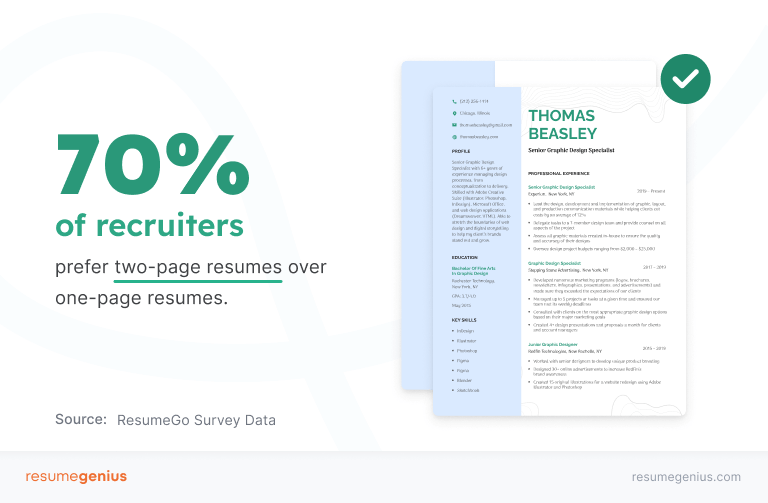
The current resume writer market remains fragmented, with over 12,000 small, independent writers and boutique agencies competing for business. The top 10 resume-writing companies account for just 16% total market share, though consolidation is expected as the industry matures. Larger players are focused primarily on scale through online platforms vs white-glove services.
This fragmentation coupled with the vast market opportunity has produced strong economics. The average resume writer charges $150-$400 per document, with senior executive writers commanding fees over $1,000. Writers can service between 10-40 clients per month working full time.
The rise of remote work and economic uncertainty has accelerated demand, as has growth in hiring for middle-skill jobs requiring nuanced resume positioning. Investing in professional resume writers offers compelling ROI – those working with writers are 3x as likely to land interviews and can achieve as high as a 700% ROI if they land the job.
The resume-writing industry is experiencing rapid growth driven by favorable macroeconomic trends and an underpenetrated addressable market. The lack of sophisticated competition makes it an attractive space for aspiring entrepreneurs to launch high-margin businesses.
2. Analyze the Competition
When launching a resume writing business, analyzing the competition is crucial to positioning yourself advantageously to gain market share. Some ways to get to know local professional resume writing services include:
- Start by identifying competitors online within your geographic target area.
- Search Google Maps for terms like “resume services near me” and compile a list of businesses appearing in the results and map pack top listings.
- Visit the website and social media pages of each competitor to evaluate the brand positioning and messaging, service offerings, and pricing models.
- Make notes on strengths and weaknesses compared to the envisioned positioning for your own business.
- Pay attention to the aesthetics of the online presence and reviews as you qualitatively assess the competitor set.
- You can quantitatively size up online competitors by looking at metrics of social media followers, website traffic rankings on Alexa , and domain/page authority scores on Semrush .
- While resume writing is often entirely virtual, some boutique agencies operate brick-and-mortar storefronts.
- Drive around your target geography and take inventory of any physical offices dedicated specifically to resumes, CVs, or career services.
- Walk into each location as a mystery shopper and evaluate factors like customer service, ambiance, branding, and materials available.
Analyzing competitors provides objective benchmarks to understand the competitive landscape and identify unmet market needs your new resume-writing business can serve. It also gives context to strategically position your brand messaging.
3. Costs to Start a Resume Writing Business
When starting a resume writing business, the upfront costs to get off the ground are typically under $5,000 for an independent solo practitioner model.
Start-up Costs
- Website Development and Hosting – Budget $500-1,500 for an attractive, functional website built on WordPress. Good web design is crucial for conveying legitimacy and professionalism. Ongoing hosting and domain registration run $300/year.
- Office Equipment & Software – With resume writing primarily done virtually, $1,000 can cover a solid computer, necessary software like Microsoft Office, an ergonomic desk setup, a printer/scanner, and other core equipment.
- Incorporation Fees – Expect $100-$800 to formally create your business entity as either an LLC or S-Corp based on state filing and registration fees. Proper legal setup brings liability protections.
- Branding & Identity Work – Logos, branding colors/fonts, business cards, and templates to present a polished, consistent brand image will run $300-$1,000 using freelance graphic designers.
In total, an entrepreneur can make the required upfront investments to commence resume writing operations for less than $5,000. Many successful writers have spent even less by handling their branding work and buying only minimal equipment.
Ongoing Costs
On the flip side, monthly operating costs tend to range from $500-$2,500 covering:
- Virtual Office Membership – $100-$300 per month for turnkey access to business amenities.
- Software Subscriptions – $50-$200 on resume/CV templates, marketing automation, bookkeeping, CRM and other SaaS tools.
- Website Hosting/Domains – Budget $20-$100 to host and power your web presence.
- Professional Associations – Industry groups offer benefits and credibility for $100-$500 per year in annual membership dues.
- Insurance – Optional but recommended with rates of $500+ annually. Protect yourself with general liability, D&O, and more niche business policies.
- Contract Employees – Many resume writers eventually hire 1-2 talented freelancers to help handle client demand and grow more profitably. Paying $25-$75 per completed resume as an employer is common.
While operating costs largely scale directly with higher client volumes, keeping fixed overhead low by leveraging modern solutions, outsourcing where advantageous and avoiding unnecessary expenses keeps resume writing a lean business model.
4. Form a Legal Business Entity
When launching a resume writing operation, structuring your business as a limited liability company (LLC) offers the best blend of personal asset protection, tax flexibility, credibility, and ease of administration if you expect to grow.
Sole Proprietorship
A sole proprietorship provides no separation between your business and personal finances. You’re subject to unlimited personal liability for company debts and legal issues. Income earned flows through directly to your SSN for tax purposes. Administrative filings are minimal but your assets get tied directly to the business, making an LLC a far better choice.
Partnership
Forming a general or limited partnership can facilitate co-ownership and pool money across partners to fund growth. However, it still exposes personal assets to substantial risk as partners have “joint and several liabilities”. Disagreements between partners can also breed complex litigation if things sour. Overall excessive liability exposure relative to other options makes a partnership ill-suited.
Corporation
Establishing a standard C-Corporation or S-Corporation creates the most formal separation between a business and owner. It can support raising venture capital and eventually selling equity. However, the legal and tax filings for a corporation are far more complex – especially around issues like employee classifications.
Limited Liability Company (LLC)
Registering as a Limited Liability Company (LLC) carves out the best middle ground. It separates your personal and company assets to limit personal liability risk. Only company assets are pursued in any lawsuits or bankruptcy. An LLC offers flexibility similar to a sole proprietorship or partnership on profit distributions rather than mandatory shareholder payments.
5. Register Your Business For Taxes
An Employer Identification Number (EIN) serves as a business’s equivalent to a social security number establishing a unique IRS identifier. All businesses except sole proprietors using only their SSN need an EIN for federal tax purposes and to open business bank accounts properly.
Obtaining an EIN is free and easy through the IRS website . The entire application takes just minutes to complete. You’ll need only basic information like your name, address, business entity type, and details about ownership structure. An EIN gets issued immediately upon submitting the form and passes IRS verification.
- Navigate to the IRS EIN Assistant site.
- Answer a short eligibility questionnaire and select the option to apply online.
- Provide basic personal and business information covering ownership, contact data, and what the EIN will be used for.
- Print/record the EIN assignment confirmation provided as proof of your number.
In addition to a federal EIN, resume-writing businesses need sales & use tax permits and business licenses in their state to legally collect, report, and remit taxes on services provided. Requirements vary by location but often involve nominal registration fees under $100.
Taking just an hour to get an EIN and register for necessary state tax compliance keeps your resume writing endeavor operating legally as you scale from solopreneur to growing agency.
6. Setup Your Accounting
Proper financial accounting is crucial for resume-writing businesses to track income and expenses, maximize tax savings, access capital, and ensure IRS compliance. Yet many solopreneurs underestimate key accounting needs in the early days.
Accounting Software
Using small business accounting software like QuickBooks links bank accounts to automatically track income deposits and costs. This eliminates manual entry and creates reports showing real-time profitability. Connecting QuickBooks to contract worker accounts like Upwork also imports 1099 employee payments for easy year-end tax form creation.
Hire an Accountant
Hiring an accountant optimizes taxes and ensures accurate books. A good accountant may charge $150-$250 monthly for services like bank/CC reconciliation, payroll, quarterly sales tax filings, and advisor calls. Using one primarily for fiscal year-end tax preparation and an audit defense fund still runs $700-$1,500 but saves immensely on self-employment taxes.
Open a Business Bank Account
Keeping business and personal finances distinctly separate is essential. All resume writing income should flow into dedicated business accounts never intermingling with personal checking or credit cards. This avoids problematic commingling that can negate liability protections. Open a free small business checking account from banks like Chase to pay all company expenses directly.
Apply for a Business Credit Card
Applying for small business credit cards also establishes financial separation while allowing large resume package purchases, software charges, travel, and more to accrue points/cashback rewards. Issuers evaluate business card applications based mainly on your personal credit score and income docs.
7. Obtain Licenses and Permits
Resume writing is not a regulated industry requiring occupational licenses like those for doctors, lawyers, contractors, and many other professional services. Find federal license information through the U.S. Small Business Administration . The SBA also offers a local search tool for state and city requirements.
Resume writers generally operate out of home offices or small shared workspaces rather than dedicated commercial locations. Thus common small business permits like conditional use permits for zoning or public health operating permits do not apply.
The lack of major license barriers makes resume writing an accessible industry for aspiring solopreneurs to launch. Without major upfront investments to clear vocational program coursework or hundreds of hours of supervised training, anyone with strong writing skills can open shop after just a few hours spent on required business registration paperwork.
Voluntary professional certifications for resume writing do exist through organizations like Career Directors International and the Professional Association of Resume Writers and Career Coaches. Obtaining these professional designations can signal credibility and commitment to excellence.
8. Get Business Insurance
Securing proper business insurance is a crucial safeguard for resume-writing companies against financial ruin from an unforeseen catastrophic event. Without adequate coverage, a single lawsuit, accident, or data breach could permanently shutter operations given the smaller profit margins and cash reserves of most independent writers or boutique agencies.
Many entrepreneurs incorrectly assume business insurance is either unattainable or not worth the costs unless legally mandatory. They fail to account for black swan risks that could wholly undermine their company absent proper precautions.
Three illustrative examples bring the value of coverage into focus:
An injured client trips over a loose Ethernet cable lying across the floor of your home office during an in-person resume strategy consultation. She sustains a severe concussion and broken wrist from the resulting fall. Without any business liability insurance, you must cover all her medical bills out of pocket. A resulting lawsuit also names you personally as negligent.
A bad actor manages to hack your web server hosting client resume files purchased from a budget offshore hosting company with lax security protocols. The full identities and resume specifics of over 5,000 clients get leaked publicly. Lacking data breach and cyber liability coverage, regulatory fines under GDPR for the breach could cost 4% of global revenues.
A tropical storm produces a lightning strike-induced power surge that destroys $15,000 of cutting-edge computer editing equipment in your downtown executive suite office despite using a surge protector. The insured executive center has no liability.
While individually low probability events, being one catastrophe away from total failure points to the value of transferring risk through business insurance policies. Expert insurance marketplaces like CoverWallet simplify securing tiered protection well-tailored to resume writing operations. Expect costs of $500 to $1,500 annually based on total limits.
9. Create an Office Space
While resume writers can operate almost entirely virtually, having a professional office space facilitates conducting client meetings conveniently and projecting legitimacy critical for premium pricing. The right workspace for your budget depends on client volume and use case scenarios.
Home Office
A basic home office running $100 monthly for a dedicated room, ergonomic equipment, and software keeps overheard minimal for solopreneurs. Meetings can occur at coffee shops although background noise hinders confidential client discussions. Home offices also preclude walk-in clients and may be less impressive for executive customers.
Coworking Office
Coworking spaces like WeWork offer sleek, modern environments with business amenities (conference rooms, printing, receptionists) for $200-$500 monthly. They foster networking with other entrepreneurs while supporting client meetings or small team expansion. However, sound may still carry between spaces limiting confidentiality.
Commercial Office
For the highest-end positioning, a traditional multi-room office lease averages $3,000-$6,000 monthly enabling dedicated conference capabilities plus potentially room for several in-house writers/editors. Generally overkill for early-stage resume writers but useful for multi-employee agencies seeking rapid expansion room. Also maximizes branding control for diversifying services (e.g. interview prep) targeted at enterprise budgets.
10. Source Your Equipment
Resume writers need only basic equipment to deliver professional services – primarily just a reliable computer and printer. While shiny gadgets are enticing, tried and true fundamentals suffice when launching on a bootstrap budget.
Buying new allows fully customizing configurations to your workload from retailers like BestBuy . Apple iMacs and PC laptop/desktop combos with Core i5 or i7 processors, 16GB RAM, 1TB storage, and 27″ displays provide future-proof performance for $1,000-$2,000. All-in-one color laser printers like HP handle printing needs under $500.
Scouring secondhand local inventory on Craigslist and Facebook Marketplace can capture major savings on computer gear from businesses and power users upgrading frequently. Resume writing software demands are easily met with even 5-7-year-old PCs at 20%+ off retail prices.
Needing only 1-2 primary devices for a solo operation lends well to renting. Rent-A-Center allows flexibly upgrading equipment over 6-24 month terms. However, lengthy commitments paying 200%+ of retail cost make pure renting fairly expensive long-term.
Minimizing initial cash outlays, leasing transfers equipment ownership obligations to financing companies in exchange for monthly payments during 1-5-year terms. Credit and income requirements are higher than renting but cash flow preservation aids ramping writers.
11. Establish Your Brand Assets
Crafting a distinctive brand identity conveys professionalism and trust to stand out from freelance competitors. Logos, websites, custom emails, and more allow conveying your unique value and specialization.
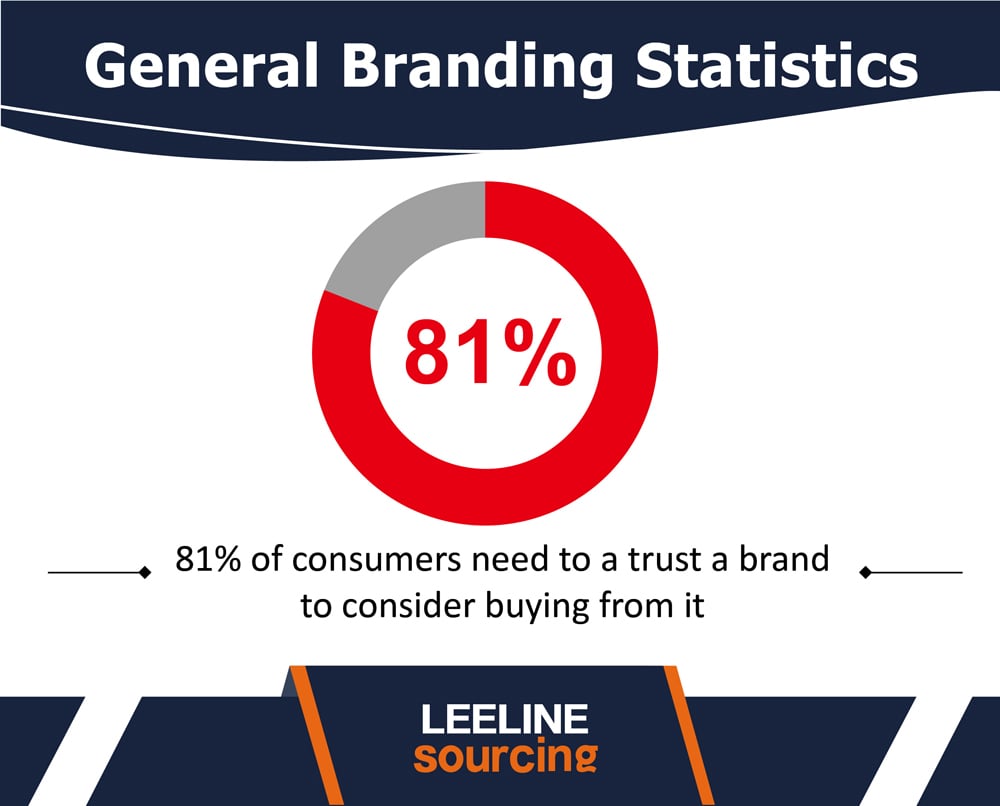
Get a Business Phone Number
Getting a unique business phone line instead of relying solely on a personal cell phone legitimizes operations. Services like RingCentral provide toll-free 800 numbers, vanity extensions, and business SMS capabilities to manage inquiries professionally starting at just $30 monthly. Custom on-hold messages and analytics also polish communications.
Design a Logo
An eye-catching logo synthesizes what your brand represents. Consider your positioning – classic serif fonts project establishment while sleek sans serifs align with modernity. Simple geometric forms convey trust and minimalism. Looka’s AI generators quickly craft custom logos based on your preferences.
Print Business Cards
Business cards display branding proudly when networking or meeting clients. Vistaprint offers affordable, high-quality cards with volume discounts. Packing cards when attending local Chamber of Commerce networking events or relevant trade association conferences makes exchanging contact information natural while reinforcing your brand.
Get a Domain Name
Secure matching domain names via registrars like Namecheap for establishing credibility and an official online presence. Domains should closely match brands and use.COM over alternatives when possible. Buy domains proactively even if the website launches later to control naming and avoid cybersquatting.
Design a Website
Constructing a custom website over templated builders like Wix conveys the most polish if web design skills exist internally. Those less technically inclined can hire expert Fiverr freelancers affordably. Balance visual appeal and conversion rate optimization. Integrate lead capture forms, client portals for file exchanges, and easy contact channels.
12. Join Associations and Groups
Beyond individual hard skills, networking with industry peers often determines success in launching new ventures by sharing insights and referrals. Various local and national associations cater to resume writers.
Local Associations
Area Chambers of Commerce like the Greater Cleveland Chamber of Commerce offer small business programs including training, mentor matching, and networking mixers to meet fellow entrepreneurs. These organizations advocate politically on behalf of regional business interests as well. Expect $300 in annual dues for access.

Local Meetups
Event listing sites like Meetup enable discovering relevant regional groups to join covering small business advice, marketing tactics, solo entrepreneurs, and more. Cultivating community connections leads to trades of knowledge and customer referrals to aid in getting established locally. Expect free or nominal dues.
Facebook Groups
Virtual networking via social media platforms offers additional exposure and learning conduits. Facebook is particularly valuable for niche interest groups given existing userbases. For resume writers, groups like Professional Resume / CV Writers and Resume Writing share tips for perfecting documents across various professions.
13. How to Market a Resume Writing Business
Implementing ongoing marketing is non-negotiable for growth-oriented resume writers. Relying solely on fortuitous referrals caps income potential. Deliberate outreach and promotions must occur to raise awareness continually.

Personal Networking
Tap into your existing network first. Satisfied clients referring additional contacts they know need services to deliver built-in social proof at minimal acquisition costs. Entice referrals by offering $50 cash or gift cards to contacts generating a set number of new client conversions monthly.
Digital Marketing
Digital channels then allow efficiently extending the reach and targeting relevant demographic segments through:
- Google Ads campaigns geo-targeting local unemployed professionals or national campaigns focused on verticals like finance, technology, healthcare, etc. Expect 3-5x ROI optimizing to convert comprehensive package purchasers.
- Leverage social media platforms for more customers. Facebook and Instagram ads focused both on cold resume needs and career change considerations. Retarget past website visitors with special offers.
- Publishing 2x monthly blog posts on resume/career advice optimized for organic search traffic. Answer common FAQs and share industry insider tips. Simple SEO best practices boost discoverability and authority.
- Start a YouTube channel creating short tutorials on formatting strong resumes, addressing employment gaps, ATS optimization tricks, etc. Distribute videos across other social media driving visitors back to lead capture.
- Run an email nurture sequence with tips to stay on top of the latest trends in your professional domain. Use segmentation to target audiences by individual sectors.
Traditional Marketing
More traditional options still deliver results when executed deliberately for select businesses:
- Well designed Well-designed direct mail postcards to high-income zip codes nearby flag your services to upper-class demographics. Expect 1-3% conversion rates done right.
- Local radio spot early morning drive times raise awareness during peak commute job search mental bandwidth. Attempt radio first before committing to pricier television spots with lower attentiveness.
- Print flyers distributed in areas with office parks, universities, and coworking spaces seed local networks. However, extremely low accountability for conversions compared to digital efforts.
- Strategically placed billboards along congested highways bait impulse inquiries from bored commuters. Limit to major metro regions able to justify $1,500 monthly rental costs per board.
The ideal mix of traditional and digital marketing complements word of mouth, crafting a fully y integrated client acquisition engine.
14. Focus on the Customer
Delivering white-glove service must remain an utmost priority when clients entrust you to showcase their careers in the best possible light. One subpar document or tardy response risks permanently losing a customer when battling against online resume mills on price.
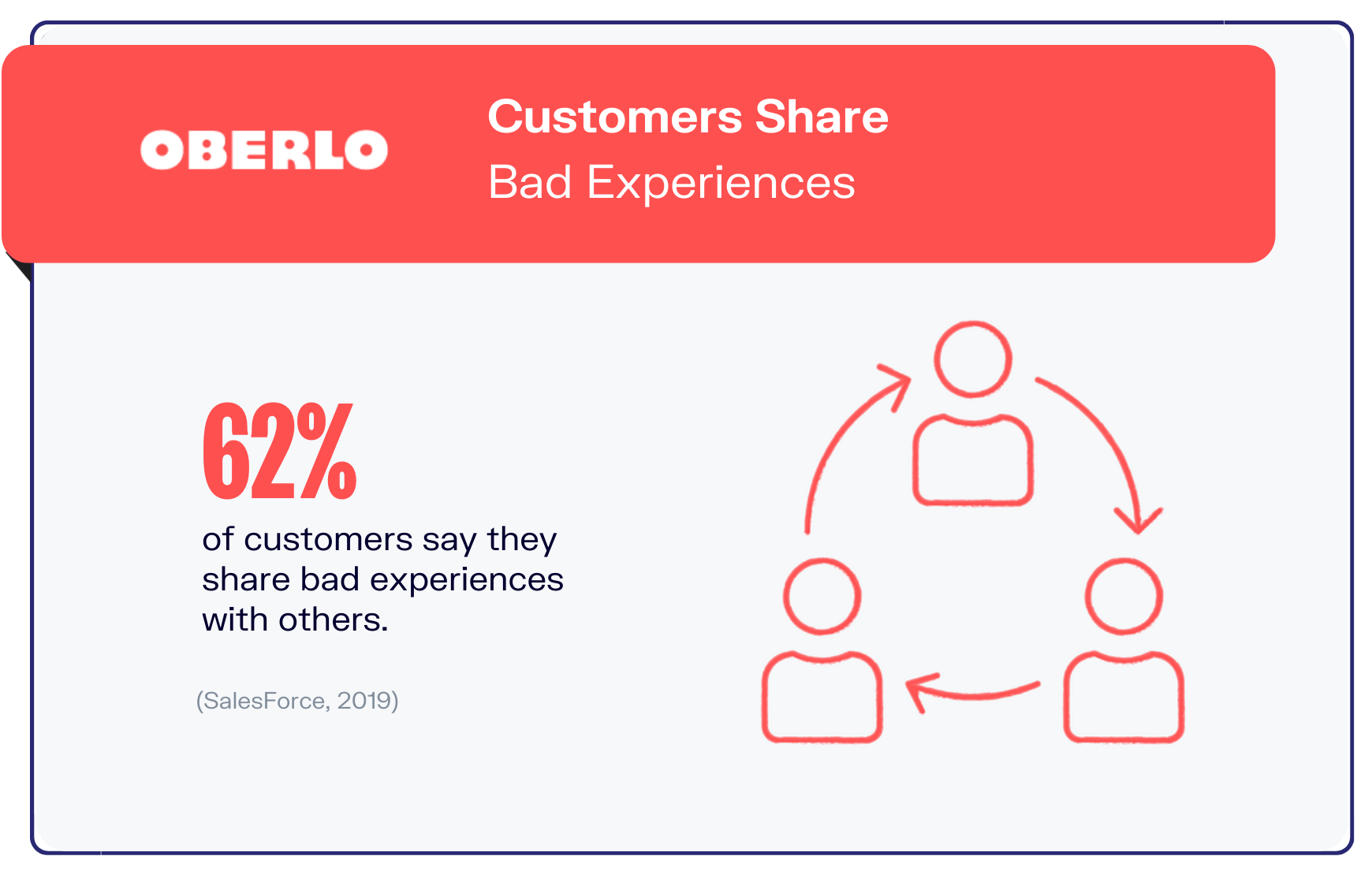
However, extreme personalization and hand-holding that exceeds expectations earn incredible word-of-mouth and retention. How can you wow each client?
- Schedule 30-60 minute needs analysis calls even for basic resume packages. Take extensive notes learning their background. This degree of one on one interest builds loyalty even at mid-market mid-market pricing.
- Review resume draft revisions and job search strategy calls within 24 hours every time. Being readily available builds trusted advisor status.
- Send handwritten notes after big interviews congratulating them. Checking in on the outcome shows you care beyond the sale.
- Help connect clients to your network for introductions relevant to their target roles. Access becomes advocacy.
- Follow up persistently as their job search progresses. Celebrate wins when they secure offers!
The resume writing space has low barriers to viable minimum services. But overinvesting in customer service builds genuine relationships converting one-time buyers into evangelists. This fuels massive word-of-mouth channel expansion that no marketing budget can match.
You Might Also Like
April 9, 2024
0 comments
How to Start a Dog Clothing Business in 14 Steps (In-Depth Guide)
Have you ever considered turning your love for canine couture into a thriving business? ...
How to Start a Vintage Clothing Business in 14 Steps (In-Depth Guide)
The vintage apparel and second hand clothing industry reached an evaluation of $152.5 billion ...
How to Start a Bamboo Clothing Business in 14 Steps (In-Depth Guide)
The global bamboo fiber market is expected to grow at a compound annual growth ...
How to Start a Garage Cleaning Business in 14 Steps (In-Depth Guide)
Starting a garage cleaning business could be the perfect solution! The U.S. garage and ...
Check Out Our Latest Articles
How to Make a Resume in 2024 | Beginner's Guide

For most job-seekers, a good resume is what stands between a dream job and Choice D. Get your resume right, and you’ll be getting replies from every other company you apply to.
If your resume game is weak, though, you’ll end up sitting around for weeks, maybe even months, before you even get a single response.
So you’re probably wondering how you can write a resume that gets you an interview straight up.
Well, you’ve come to the right place!
In this guide, we’re going to teach you everything you need to know about how to make a resume, including:
- The 8 Essential Steps to Writing a Resume
- 11+ Exclusive Resume Tips to Up Your Resume Game
- 27+ Real-Life Resume Examples for Different Professions
….and more!
So, let’s dive right in.
How to Make a Resume (The Right Way!)
Before we go into detail about how you should make a resume, here’s a summary of the most important steps and tips to keep in mind:
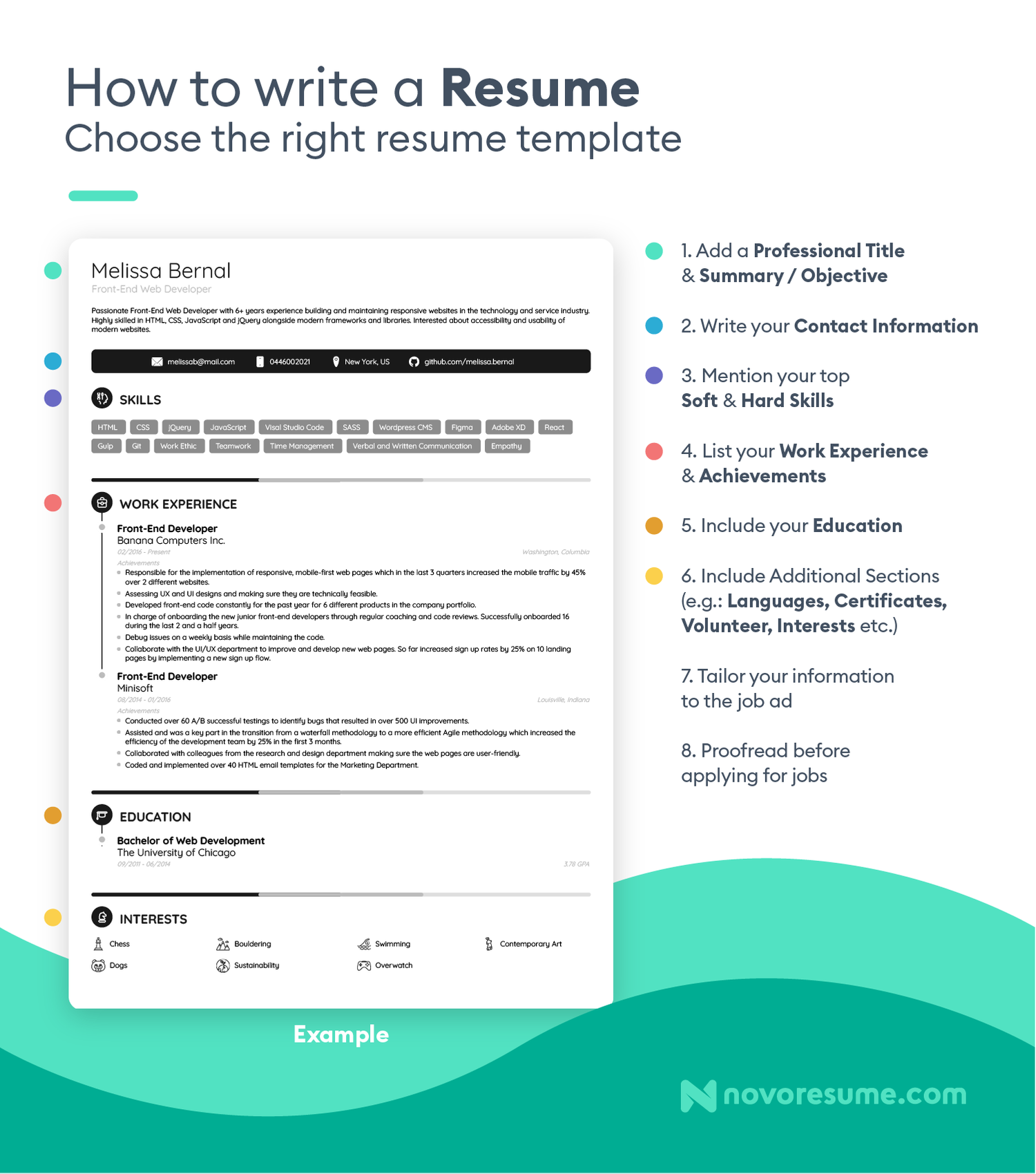
- Choose a resume format carefully. In 99% of cases, we recommend the reverse-chronological format .
- Add the right contact details. Leave your headshot out and make sure to include your job title , a professional email address, and any relevant links. (E.g.: your LinkedIn profile , online portfolio, personal website, etc.).
- Write an impactful resume summary. Unless you’re an entry-level professional, always go for a resume summary. If you do it right, it’s your chance to get the hiring manager to go through the rest of your resume in detail.
- Pay attention to your work experience section. Take your work experience section from OK-ish to exceptional by tailoring it to the job ad, making your achievements quantifiable, and using action verbs and power words.
- Add the right skills for the job. Keep this section relevant by only including the hard and soft skills that are required for the position.
- Keep your education short and to the point. Your most recent and highest degree is more than enough for a strong education section. You only need to add more details here if you’re a recent graduate with barely any work experience.
- Leverage optional resume sections. Optional sections like languages, hobbies, certifications, independent projects, and others can set you apart from other candidates with similar skills and experience.
- Include a cover letter. That’s right, cover letters matter in 2024, and the best way to supplement your resume is by adding an equally well-crafted cover letter to your job application. To make the most of it, check out our detailed guide on how to write a cover letter .
To get the most out of our tips, you can head over to the resume builder and start building your resume on the go as you read this guide.
New to resume-making? Give our ‘7 Resume Tips’ video a watch before diving into the article!
#1. Pick the Right Resume Format
Before you start filling in the contents of your resume, you have to make sure it’s going to look good.
After all, the first thing hiring managers notice is what your resume looks like, and then they start reading it. So, this is your best chance to make a great first impression.
Start by choosing the right resume format.
There are three types of resume formats out there:
- Reverse-chronological. This is by far the most popular resume format worldwide and, as such, it’s the best format for most job-seekers.
- Functional. This resume format focuses more on skills than work experience. It’s a good choice if you’re just getting started with your career and have little to no experience in the field.
- Combination. The combination resume format is a great choice for experienced job-seekers with a very diverse skill set. It’s useful if you’re applying for a role that requires expertise in several different fields and you want to show all that in your resume.
So, which one should you go for?
In 99% of cases, you want to stick to the reverse-chronological resume format . It’s the most popular format and what hiring managers expect to see. So, in the rest of this guide, we’re going to focus on teaching you how to make a reverse-chronological resume.
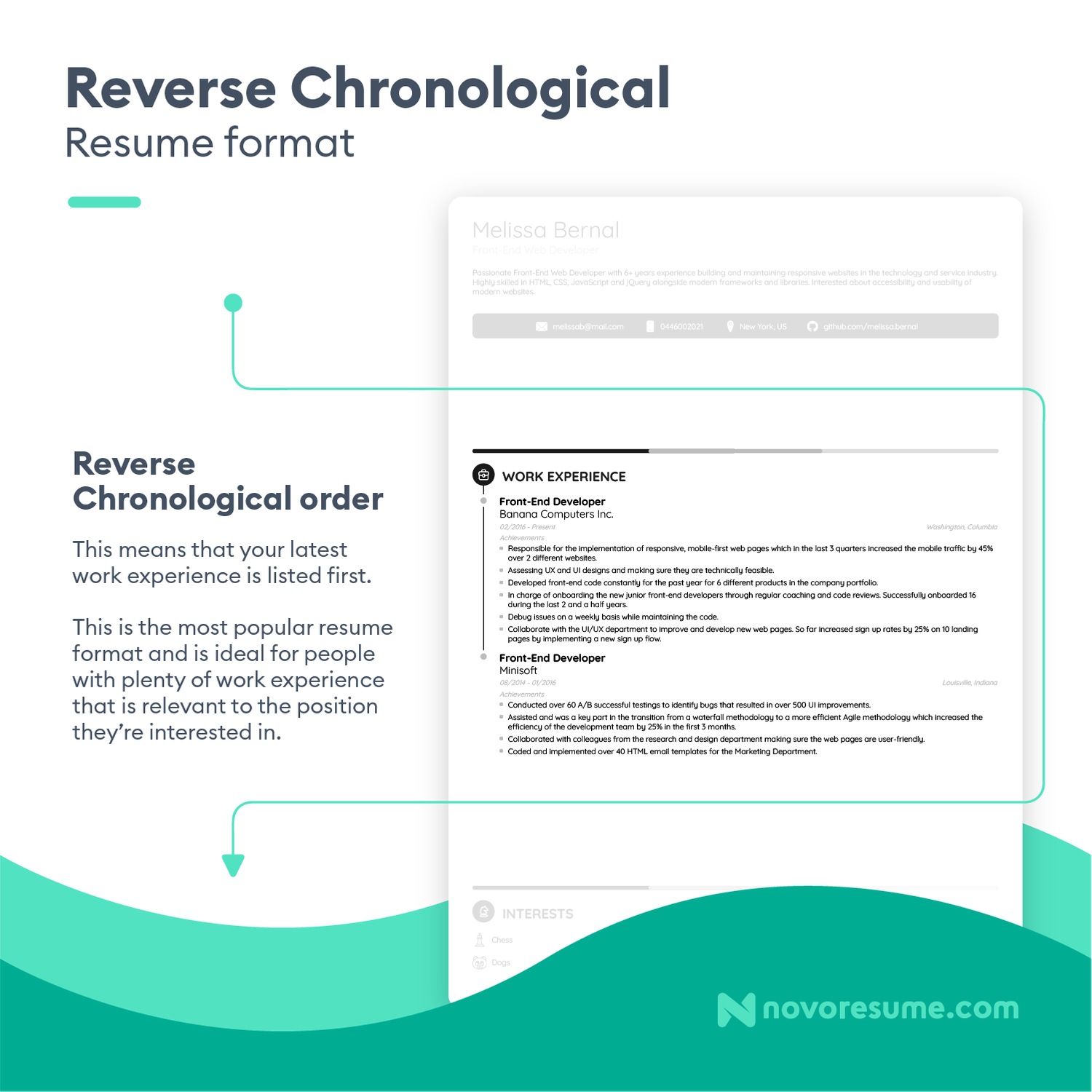
Fix Your Resume’s Layout
With formatting out of the way, let’s talk about your resume’s layout , which determines the overall look of your resume.
Does it look organized or cluttered? Is it too short or too long? Is it boring and easy to ignore, or is it reader-friendly and attention-grabbing?
Here are some of the best practices you should apply:
- Stick to one page. You should only go for a two-page resume if you have decades of experience and you’re sure the extra space will add significant value. Hiring managers in big companies get hundreds of applications per job opening. They’re not going to spend their valuable time reading your life story!
- Add clear section headings. Pick a heading and use it for all the section headers so the hiring manager can easily navigate through your resume.
- Adjust the margins. Without the right amount of white space, your resume will end up looking overcrowded with information. Set your margins to one inch on all sides so your text fits just right on the page.
- Choose a professional font. We’d recommend sticking to a font that’s professional but not overused. For example, Ubuntu, Roboto, or Overpass. Avoid Times New Roman, and never use Comic Sans.
- Set the correct font size. As a rule of thumb, go for 11-12 pt for normal text and 14-16 pt for section titles.
- Use a PDF file. Always save your resume as a PDF file, unless the employer specifically requests otherwise. Word files are popular, but there’s a good chance they’ll mess up your resume’s formatting.
Another thing you need to consider in terms of your resume’s layout is whether you’re going for a traditional-looking resume template or something a bit more modern :
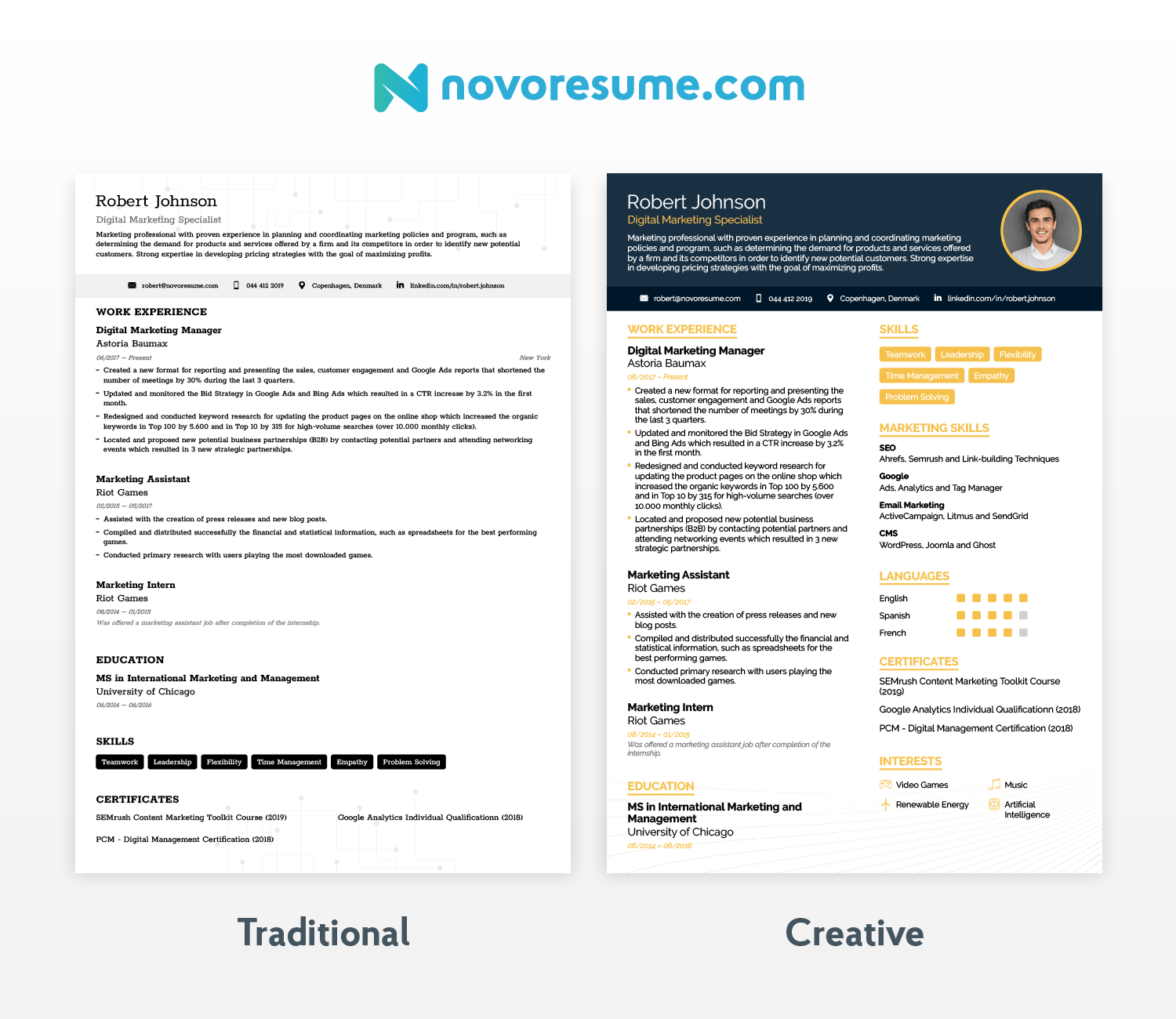
If you’re pursuing a career in a more traditional industry, like law , banking , or finance , you might want to stick to the first.
But if you’re applying to a tech company where imagination and innovation are valued, you can pick a more creative resume template .
Want to Save Time? Use a (Free) Resume Template
Anyone who’s ever tried creating a resume from scratch knows how boring the formatting can be.
Before you can even start filling in the contents, you need to tweak the margins, adjust font sizes, and make sure everything fits into one page while still looking good.
What if you could skip past all that and still create a compelling resume?
Try one of our free resume templates . They’re pre-formatted, so all you have to do is fill in the contents.
They’re also created in collaboration with recruiters from around the globe, ensuring that the templates are visually appealing and ATS-friendly!
See for yourself how one of our templates compares to a resume created in a standard text editor:

#2. Add Your Contact Information
Now that we’ve got all the formatting out of the way, let’s get into what your resume is all about— the information you put on it .
The first thing you want to do when filling out the contents of your resume is to add your contact information .
This section is pretty straightforward but crucial. Your contact details belong at the top of your resume in a designated resume header , so the hiring manager can easily find them.
Even if everything else about your resume is perfect, that all flops if you misspell your email address or have a typo in your phone number. If the hiring manager can’t contact you, it’s a missed opportunity.
So, double-check, and even triple-check your contact information section and make sure everything is factually correct and up-to-date.
Must-Have Information
- Full name. Your first and last name should stand out at the top of your resume.
- Email address. Stick to an address that’s professional and easy to spell, like a combination of your first and last name. (E.g.: [email protected])
- Phone number. Add a reliable number where the hiring manager can easily reach you.
- Location. Add your city and state/country. If you plan to relocate for the job or want a remote position, specify it on your resume.
Optional Information
- Job title. Add your professional title underneath. Write it down word for word, whether it’s “Digital Marketing Specialist” or “Junior Data Scientist.” Just don’t make up job titles like “Marketing Wizzard” or “Data Manipulator.” They’re not quirky; they’re just unprofessional.
- LinkedIn profile . We recommend that you include a link to your updated LinkedIn profile since over 77% of hiring managers use the platform when evaluating a candidate.
- Relevant links. Include links to personal websites or any social media profiles that are relevant to your field. For example, a developer could include a Github profile, while a graphic designer could link their Behance or Driblle account, and so on.
- Date of birth. Unless this is specifically required in the job ad, the hiring manager doesn’t need to know how old you are. It’s not important for their decision-making, and at worst, it might lead to age-based discrimination.
- Unprofessional email address. Your quirky, old high school email address doesn’t belong on your resume. Instead of [email protected] , go for a [email protected] type of address.
- Headshot. (USA, UK or Ireland) Depending on the country where you’re applying, it might even be illegal to include a picture of yourself on your resume . While it’s the norm to include a picture in most of Europe and Asia, always check the regulations for each specific country or industry you’re applying to.
All clear? Good! Now, let’s look at what a great example of a resume's contact information section looks like:
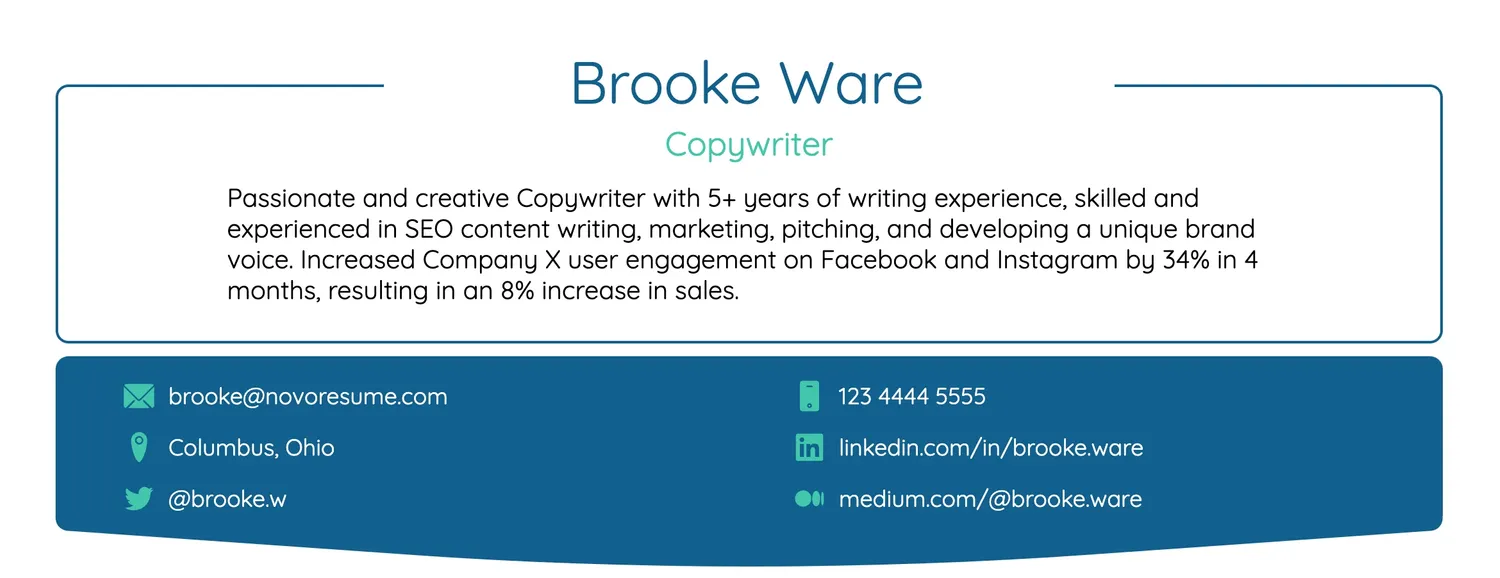
#3. Write a Resume Headline (Summary or Objective)
It's no secret that recruiters spend an average of less than seven seconds on a resume .
When you receive hundreds, if not thousands, of applications daily, it's physically impossible to spend too much time on each.
So, what the hiring managers do to go through resumes more effectively is to skim through each resume and read it in depth only if it piques their interest.
This is where the resume headline comes in.
Placed right next to (or underneath) your contact information, this brief paragraph is the first thing the hiring manager is going to read on your resume.
Now, depending on how far along in your career you are, your resume headline can be either a resume summary or a resume objective.

So, how do you choose between a resume summary and a resume objective? Here’s all you need to know:
Resume Summary
A resume summary, as the name suggests, is a two to three-sentence summary of your career so far. If done right, it shows that you’re a qualified candidate at a glance and gets the hiring manager to give you a chance.
Here’s what your resume summary should include:
- Your job title and years of experience.
- A couple of your greatest professional achievements or core responsibilities.
- Your most relevant skills for the job.
Here’s an example of a well-written resume summary:
Experienced Java Developer with 5 years of experience in building scalable and efficient applications. Contributed to a major project that enhanced application performance by 25%. Strong background in Spring Framework and microservices. Aiming to apply robust coding skills to develop innovative software solutions at XYZ Tech Solutions.
Unless you’re a recent graduate or amid a career change, we recommend you stick to a resume summary. Otherwise, a resume objective might be a better option for you.
Resume Objective
A resume objective is supposed to express your professional goals and aspirations, academic background, and any relevant skills you may have for the job.
It communicates your motivation for getting into a new field, so it’s the go-to headline for recent graduates and those going through a career change. As with a resume summary, a resume objective should be brief—around two to four sentences long.
So, here’s what it would look like if you’re a student:
Hard-working recent graduate with a B.A. in Graphic Design from New York State University seeking new opportunities. 3+ years of practical experience working with Adobe Illustrator and Photoshop, creating illustrations and UX/UI design projects. Looking to grow as a designer and perfect my art at XYZ Design Studio.
Or, on the other hand, if you’re going through a career change, it might look more like this:
IT project manager with 5+ years of experience in software development. Managed a team of developers to create products for several industries, such as FinTech and HR tech. Looking to leverage my experience in managing outsourced products as a Product Owner at Company XYZ.
#4. Prioritize Your Work Experience
The most important part of your resume is your work experience.
This is where you get to sell yourself and show off your previous accomplishments and responsibilities.
If you manage to master this section, you’ll know most of what’s there to know about how to make a resume.
There are plenty of good practices for writing your work experience . But before we dive into all the nits and grits, let's start with the basics.
The standard format for each work experience entry is as follows:
- Job title/position. Your job title goes on top of each work experience entry. When the hiring manager looks at your resume, you want them to know, at a glance, that you have relevant work experience for the job.
- Company name/location/description. Mention the name of the employer and the general location, such as the city and state/country where you worked. In some cases, you may also want to briefly describe the company, like when the organization isn’t particularly well-known.
- Dates employed. Add the approximate timeframe of your employment at each company. You don’t need to give exact dates since the standard format for this is mm/yyyy.
- Achievements and responsibilities. This is the core of each work experience entry. Depending on your field, you want to list either your achievements or responsibilities. List them in bullet points instead of paragraphs, so they’ll be easier to read.
Here’s a real-life example:
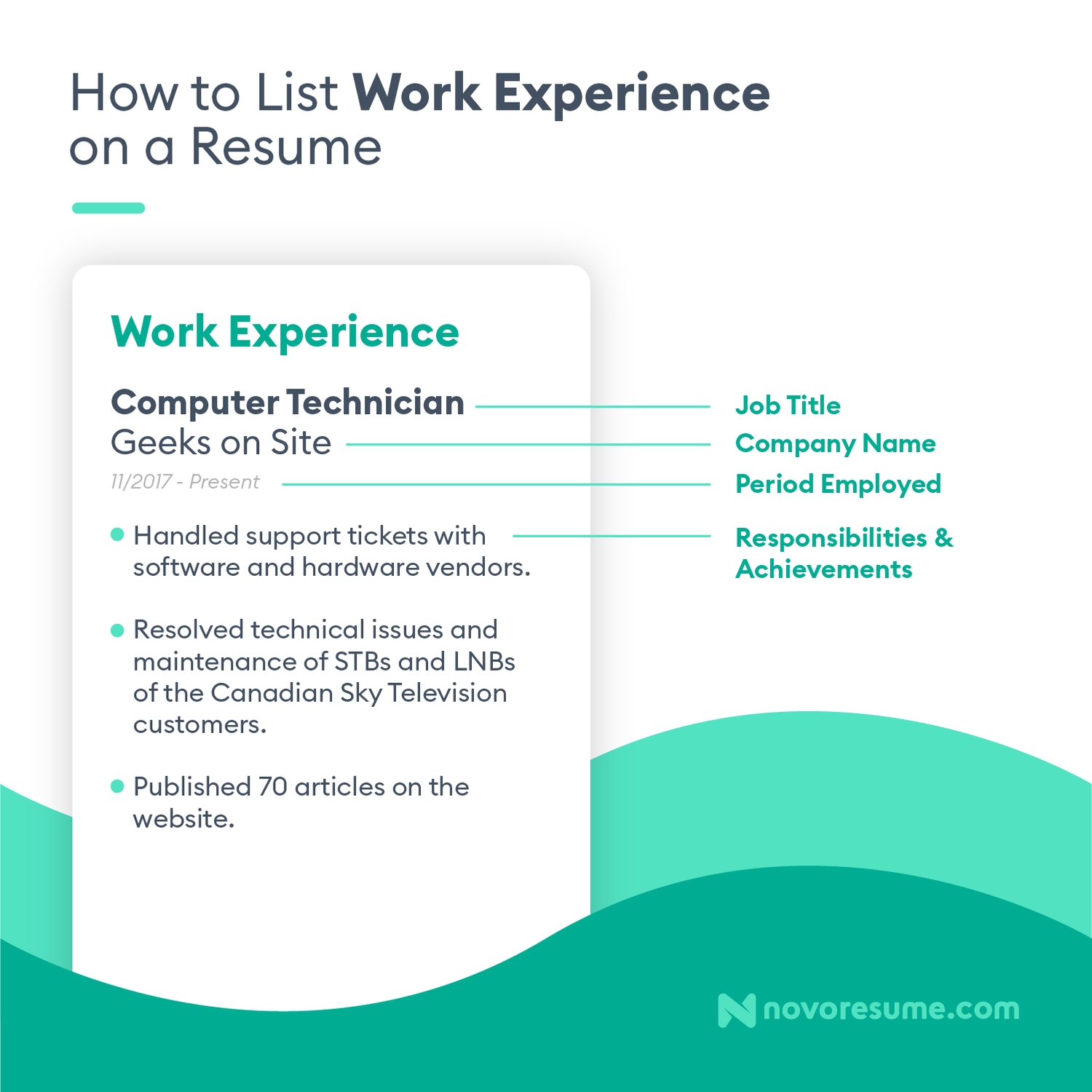
Your work experience entries should always be listed in reverse chronological order , starting with your most recent job and working your way back into the past.
Now that you know how to list your experience, we’re going to show you how to write about it in a way that makes you stand out from the competition, starting with:
Are you a student with no work experience? We’ve got you covered. Check out our guide to writing a resume with no experience here.
Focus on Achievements Whenever Possible
One of the most common resume mistakes is only listing responsibilities in your work experience section.
Here’s the thing—in most cases, the hiring manager knows exactly what your job responsibilities are.
For example, if you’re a sales manager, your responsibilities would be:
- Reach out to potential clients over the phone or email.
- Maintain relationships with existing company clients and upsell relevant products.
- Tracking and reporting on leads in CRM.
Coincidentally, this is also the same list of responsibilities for every sales manager out there. So, 90% of all other resumes probably mention the same thing.
To stand out from the competition, you want to focus on writing achievements in your resume instead. These can be how you helped your previous company grow, reach quarterly quotas, and so on.
Let’s compare how responsibilities hold up next to achievements for the same job:
- Exceeded sales team KPIs by 30%+ for 3 months straight.
- Generated over $24,000 in sales in 1 month.
- Generated leads through cold-calling
- Managed existing company clients
Keep in mind, though, that in some fields, there just aren’t that many achievements you can mention. Let’s say you’re a warehouse worker .
Your day-to-day responsibilities probably include:
- Loading, unloading, and setting up equipment daily.
- Packaging finished products and getting them ready for shipping.
- Assisting in opening and closing the warehouse.
In fields like this, it’s pretty hard to distinguish yourself through achievements, so it’s okay to stick to responsibilities instead. You can still make them shine by following the rest of our advice about listing your work experience.
Keep in mind, though, that in some fields, there aren’t that many achievements you can mention. Let’s say you work in a warehouse. Your day-to-day responsibilities probably involve:
- Loading, unloading and setting up equipment on a daily basis.
- Package finished product and get it ready for shipping.
- Assist in opening and closing the warehouse.
In such fields, it’s pretty hard to distinguish yourself, so it’s totally OK to stick to responsibilities instead.
Tailor Your Resume to the Job
Tailoring is what sets an amazing resume apart from an okay one.
Hiring managers don’t need to know about every single job you’ve ever worked at or every single skill that you have.
They only want to know about your jobs, experiences, or skills that are relevant to the role you’re applying for.
For example, if you’re applying for a job doing Google Ads, you don’t need to talk about your SEO internship from eight years ago.
By focusing your resume on whatever is important for the specific role, you’re a lot more likely to stand out and catch the hiring manager’s attention.
Let’s take a look at an example of a job ad:
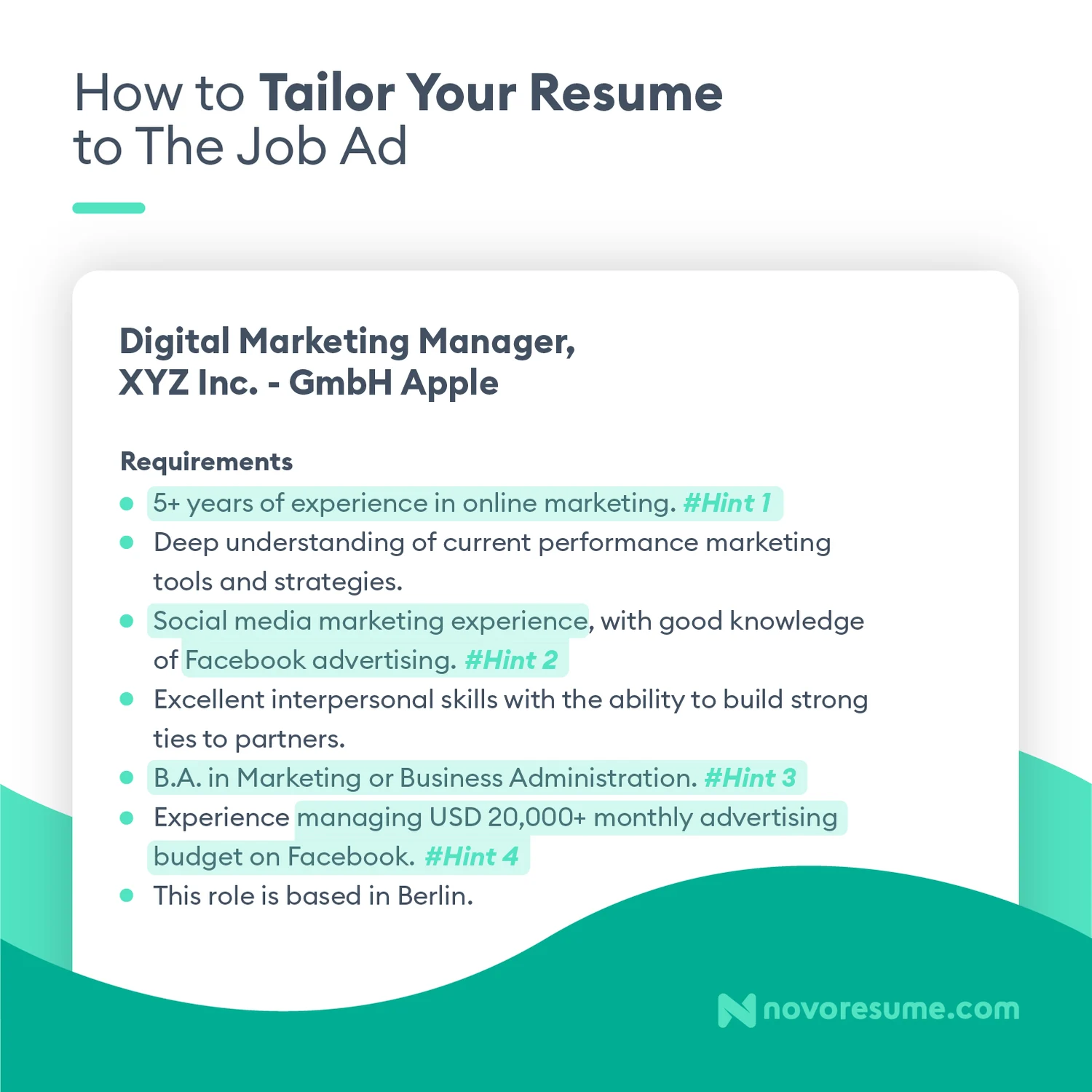
As you can see, we’ve highlighted the most important requirements.
To tailor your resume accordingly, you just need to mention how you meet each of these requirements in your resume.
You can highlight your relevant achievements and qualifications in different parts of your resume, such as:
- In your resume summary, where you should recap your years of experience.
- Throughout your work experience section, where you should list achievements and responsibilities that reflect your social media marketing experience.
- In your education section, where you can let the hiring manager know you have the degree that they’re looking for.
Include the Right Amount of Work Experience
If you’ve got over a decade’s worth of work experience, you’re probably wondering whether all of it belongs on your resume. In most cases, you’d end up writing a novel if you listed everything you’ve ever done, and that’s not how long a resume should be .
If you’re new to the job market, on the other hand, you probably don’t have any experience, and you’re wondering what you could even add to this section.
So, here’s how much information your resume should include, depending on your level of experience:
- No experience. If you’re looking for your first job , you won’t have any work experience to fill this section with. So, you can either keep it empty and focus on all the other sections or fill it up with any experience gained in student organizations, extracurricular activities, volunteering, and other projects.
- Entry-level. List all your work experience so far. While some of it won’t be relevant, it can still show the hiring manager that you do have some actual work experience.
- Mid-level. Only mention relevant work experience to the position you’re applying for. There’s no need to waste space on jobs that aren’t related to what you’re after.
- Senior-level. List up to 15 years of relevant work experience, tops. If your most recent experience is as a marketing executive , the hiring manager doesn’t care how you started your career as a junior marketing specialist 23 years ago.
Consider Applicant Tracking System (ATS) Software
Did you know that over 70% of resumes don’t even make it to the hiring manager ?
Most companies these days use ATS to evaluate hundreds of resumes instantaneously and automatically filter out the ones that don’t meet their criteria.
For example, if a resume doesn’t mention a specific skill or isn’t formatted correctly, the ATS will automatically reject it.
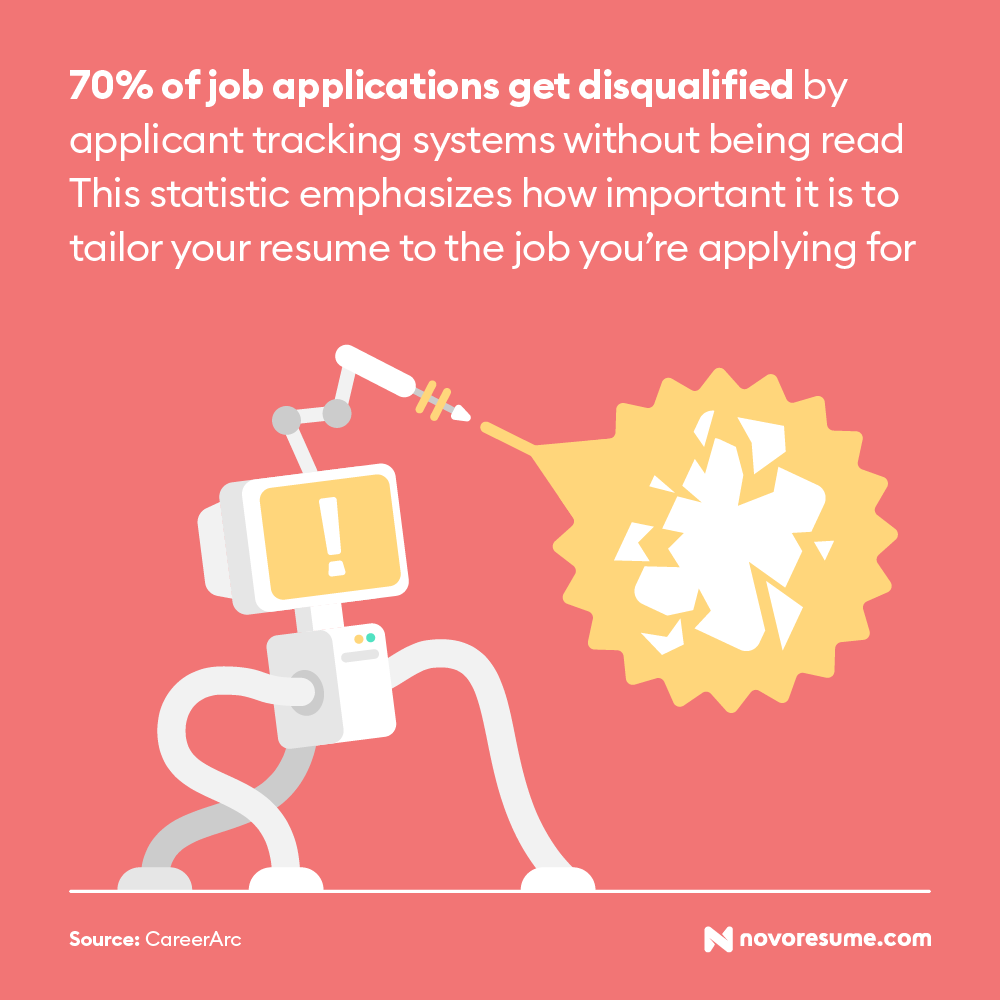
Fortunately, there are some easy ways to make an ATS-friendly resume .
Here are a couple of tips to help you get past those pesky robots:
- Stick to one page. Sometimes employers set a limit on how long a resume should be. This means that if your resume is longer than one page, it might get automatically disqualified.
- Incorporate keywords. Tailoring your resume to the job helps a ton with beating the ATS. Just carefully read the job description to find hints for what the ATS will be looking for. Then, whenever you find keywords related to your responsibilities and achievements, make sure to include them in your work experience section.
- Use an active voice. Passive voice is too vague and unclear, so make sure to use active voice as much as possible when describing your previous jobs. (E.g.: “Managed a team of ten people,” instead of “ A team of ten people was managed by me.” )
- Leverage powerful action words. Instead of starting each of your sentences with “was responsible for," make your work experience impactful by using words that can grab attention. Saying that you “spearheaded” or “facilitated” something sounds a lot more impressive than “helped.”
Want to make sure your resume formatting passes the ATS test? Choose one of our tried and tested ATS-friendly resume templates , and you’ll be good to go!
#5. List Your Education
The next section on your resume is dedicated to your academic qualifications. Let’s start with the basics!
Here’s how you should format the education section on your resume :
- Program Name. Your major and degree type should be listed. (E.g.: “B.A. in Business Administration” )
- University Name. Add the name of the institution. (E.g.: “New York State University” )
- Dates Attended. Use a mm/yyyy format for the dates you attended. (E.g.: “08/2008 - 06/2012” )
- Location. If your university is less well-known, you can also add the location. (E.g.: “Stockholm, Sweden” )
- GPA. Use the appropriate grading system for the country you’re applying to work in. (E.g.: In the USA, it would be “3.9 GPA” )
- Honors. Add any honors and distinctions you’ve been given. (E.g.: Cum Laude, Magna Cum Laude, Summa Cum Laude )
- Achievements. You can mention interesting papers you’ve written, projects you’ve done, or relevant coursework you’ve excelled in.
- Minor. “Minor in Psychology”
Pretty simple, right? Now let’s see what an education section looks like in practice:

This example includes all the necessary information, plus an eye-catching award and relevant classes this candidate has taken.
Resume Education Tips
Now that you know how to list your education on your resume, let’s take this section to the next level.
Just follow these expert tips:
- If you’re making a resume as a student and don’t have any work experience yet, you can list your education section at the beginning of the page instead of work experience.
- You can add your expected graduation date if you’re still pursuing your degree.
- If you already have relevant work experience, just keep this section short and sweet. Recent graduates can expand on their education more and add optional information like projects, classes, academic achievements, etc.
- Always list your degrees in reverse chronological order, starting with your highest degree on top. Your highest and most recent degree is usually enough, so if you have a Master’s degree that’s relevant to the job, there’s no need to mention your earlier degrees.
- Don’t add your high school degree to your resume if you already have a university degree. It doesn’t have as much weight, and you can use the space for something else.
- Only mention your GPA if you had an impressive academic career. Anything below a 3.5 GPA doesn’t need to be on your resume.
Are you in the process of applying for college? Check out our guide to writing a college application resume to wow that admissions officer!
#6. Emphasize Your Know-How in the Skills Section
After your work experience, your skills are the first thing the hiring manager is going to look for. In fact, together, work experience and skills make up 90% of the hiring decision .
So, this is the place where you want to mention all the know-how that makes you the perfect candidate for the job.
There are two types of skills you can include when writing your resume:
- Hard Skills. These are measurable abilities. What you can list here can be anything from coding in Python to knowing how to cook Thai cuisine.
- Soft Skills. Also known as personal skills, these are a mix of communication skills , personal traits, career attributes, and more. They can include leadership, critical thinking, and time management , just to name a few.
Your resume should always cover both hard skills and soft skills . Here’s an example in action:
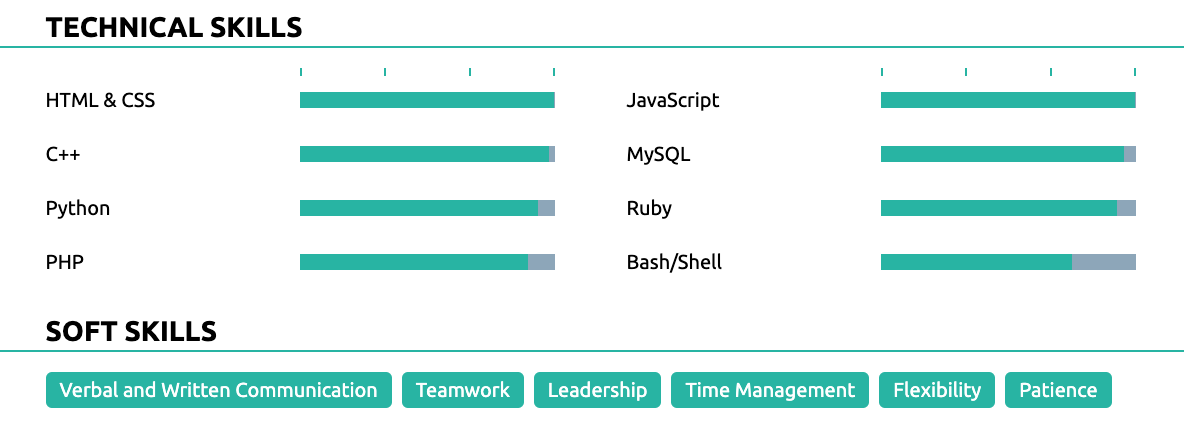
Now, let’s discuss how you should list your most important skills on your resume.
There are a few essential steps you need to follow:
Always List Hard and Soft Skills Separately
Your resume should be easy and neat to navigate. The hiring manager shouldn’t have to waste time looking for a specific skill because you didn’t separate it into the appropriate subsection.
So, just create separate categories for your hard and soft skills.
Depending on your field, you could customize the name of your “hard skills” subsection to something like “technical skills," “marketing skills," or something else related to your field.
Let’s look at an example of what skills look like on a project manager’s resume :
Methodologies & Tools
- Agile Methodology
- SCRUM Framework
- Waterfall Project Management
- Microsoft Project
- Critical Path Method (CPM)
- Earned Value Management (EVM)
- Risk Management
Soft Skills
- Team Management
- Conflict Resolution
- Negotiation
Tailor Your Skills to the Job
You might have some awesome skills, but the hiring manager only needs to know about the ones that are relevant to the job.
For example, if you’re applying for a job as an accountant, your gourmet chef skills shouldn’t be on your resume.
Look at the job ad and list at least two to three essential skills you have that are required for the role. Remember—there’s no need to list every skill you have here; just keep it relevant.
Qualifications:
- Bachelor’s degree or higher in Graphic Design or a related field.
- Tech-savvy, with some background in CMS systems such as WordPress.
- Thrives in a stressful environment and juggles multiple tasks and deadlines.
- Strong organizational and time management skills.
- Excellent communication skills.
- Self-reliant, with the ability to manage their own work.
- A can-do attitude and an outside-the-box thinker.
- Proficient in Adobe Photoshop, InDesign, Illustrator, Keynote, and Pages.
- Basic understanding of Office software such as Microsoft Word, Excel, PowerPoint, and Outlook.
So, the must-have hard skills here are Photoshop, InDesign, Illustrator, Keynote, and Pages. Other good computer skills to have are WordPress or similar CMS systems.
While you can also mention Word, Excel, PowerPoint, and Outlook, it’s pretty much assumed that you know how to use them since they’re required for most office jobs.
List Hard Skills with Experience Levels
For each hard skill you list on your resume, you should also mention your proficiency level. This tells employers what they can expect from you and how much training you might need.
- Beginner. You have some experience with the skill, whether it’s from some entry-level practice or classroom education.
- Intermediate. You’ve used the skill in a work environment with good understanding.
- Advanced. You’re the go-to person for this skill in your office. You can coach other employees, and you understand the skill at a high level.
- Expert. You’ve applied this skill to more than a handful of different projects and organizations. You’re the go-to person for advice about the skill, not just in your office but even amongst some of the best professionals in your field.
Just make sure to never lie about your actual skill level. Even if you get the job, once you need those skills you exaggerated, it will be pretty awkward for both you and your employer.
Include Transferable Skills
These are the types of skills that are useful for almost any job out there.
Transferable skills can be both soft skills (e.g.: teamwork, creativity, problem-solving skills, and others) and hard skills (MS Office Suite, HTML, writing, etc.)
Whatever job you’re applying to, chances are you have transferable skills from your experience that can come in handy one way or another. So, feel free to include them, even if they’re not specifically required for the position.
Not sure which skills to mention on your resume for your specific field? Check out our list of 101+ essential skills for inspiration!
#7. Leverage Optional Resume Sections
The sections we’ve covered so far are must-haves for any resume. They’re the bread-and-butter for any job application, and if you get them right, you’ll land any job you apply to.
But if you have some leftover space, there are a few optional sections you can choose from to give your resume a boost!
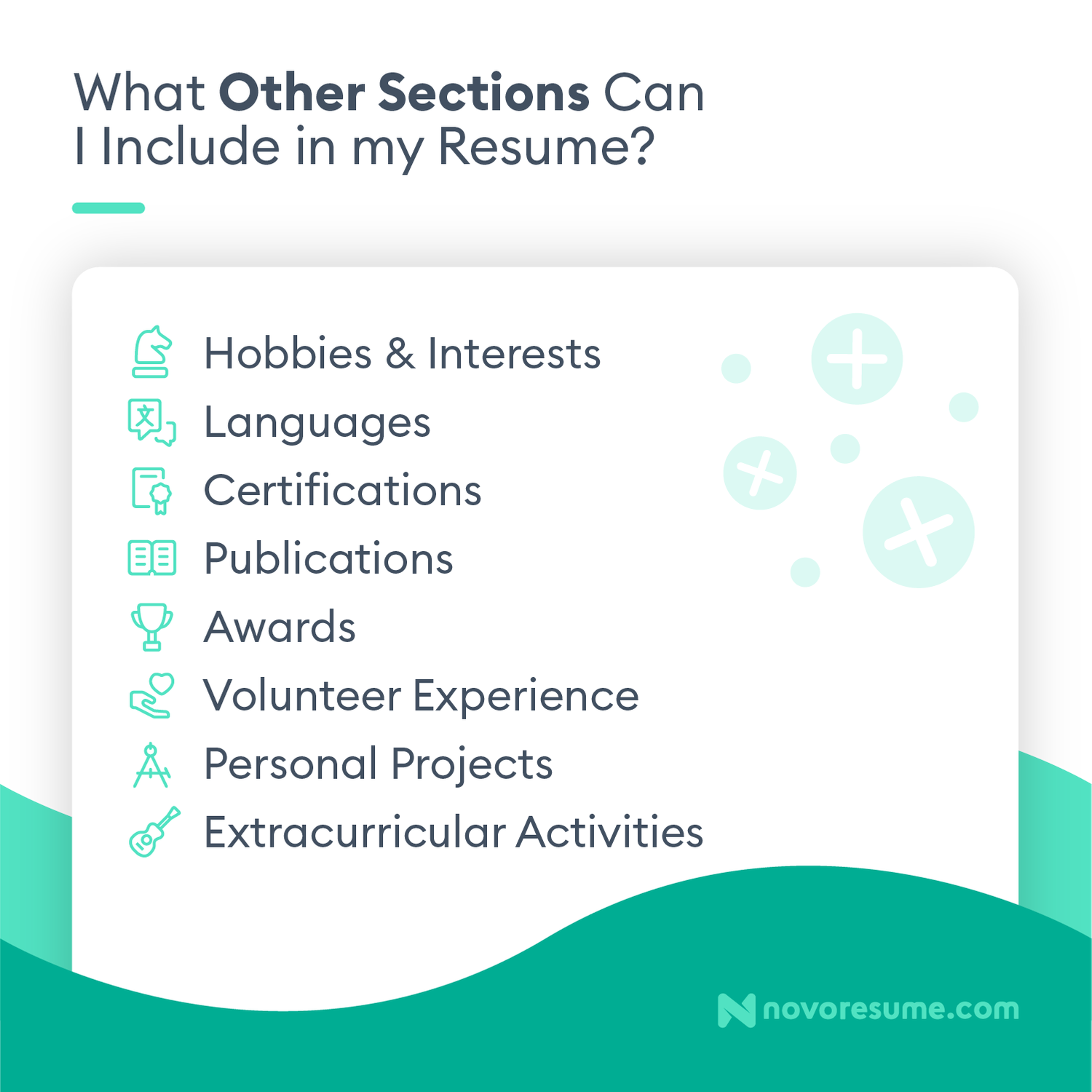
Are you bi-lingual? Or even better – multi-lingual? You should always mention that on your resume!
Even if the position doesn’t require you to know a specific language, it can still come in handy at some point. At the end of the day, it’s always better to know more languages than less.
To list languages in your resume , just write them down and assign them the appropriate level:
- Intermediate
You can also use the Common European Framework of Reference for Languages (CEFRL) or the American Council on the Teaching of Foreign Languages (ACTFL) proficiency scales.
As a given, you should never lie about your language skills. You never know—your interviewer might turn out to be fluent in the language or even be a native speaker!
Hobbies and Interests
If you want to spice up your resume, hobbies and interests could be just what you need.
While this section isn’t a game-changer, it can help the hiring manager see who you are as an individual.
For example, if you listed “teamwork” as one of your skills, hobbies like team sports can back up your claim.
And who knows? Maybe you and your interviewer have some hobbies or interests in common!
Volunteering Experience
If you’re the type of person who devotes their free time to helping others while expecting nothing in return, chances are that you’re the type of employee who’s in it for more than just the money.
Seeing volunteer experience on your resume tells hiring managers that you’re a loyal employee who’s after something meaningful.
Several studies show that listing your volunteer experience can boost your chances of getting hired, especially if you have little to no work experience.
Certifications
Hiring managers love candidates who invest in themselves, and that’s exactly what they see when you list certifications on your resume .
If you value continuous learning and strive to expand your skill set, that’s always a plus.
Certifications can also show employers how much expertise you have.
For example, if you’re a Microsoft Cloud Engineer and you specialize in Microsoft Technologies, you should definitely include all essential certifications on your resume, such as the Azure Solutions Architect Expert one.
Awards and Recognitions
There’s no harm in showing off a little on your resume. After all, you want to be a candidate that shines above the rest.
So, if you’ve received any awards or recognitions that make you stand out in your field, make sure to add them.
For example, if you’ve been recognized for your contributions to data science or received a hard-to-come-by scholarship , mention it in your resume. Just keep your entries here relevant to the field you’re applying to.
Publications
Whether you’re a freelance writer or a distinguished academic, publications are always impressive.
If you have any published works (online or in an academic journal), you can add them to your resume. Just make sure to include a link so the hiring manager knows where to check your work!
Are you looking for a career in academia? Check out our guide to writing the perfect academic CV to get started!
Working on side projects can show off your passion for your field. Whether they’re university class projects or part-time entrepreneurial endeavors, they’re relevant.
For example, if you worked on a mock software product as part of a university competition, it shows you went through every step of product creation, from ideation to creating a marketing strategy.
This project also shows off your organizational skills , and if you mention it in your resume, you stand a better chance of landing the job you had your sights set on.
But projects can also be personal, not academic. For example, you might manage an Etsy store where you sell hand-made arts and crafts to customers online. This is a great opportunity to highlight your creativity, management, and customer service skills .
Overall, hiring managers love employees who do cool work in their free time, so projects are always a great section to add to your resume.
Looking to kickstart your career? Check out our guide on how to get an internship for useful tips and real-life examples!
Extracurricular Activities
Every college freshman knows that extracurricular experience can make a difference in their application.
Especially if you don’t have a lot of experience outside of school, extracurricular activities are a great way to show potential employers your skills and give them insight into you as a person. Different clubs and after-school projects can help you gain real-life skills and considerably increase your chances of landing your first job after college.
For example, joining a student government organization can hone your leadership skills and teach you how to work as part of a team.
For example, if you’re part of a student government or public speaking club, these activities can help you hone your leadership and presentation skills.
11+ Expert Resume Tips
You’ve got the gist of how to make a resume. Now, it’s time to make it really stand out from the crowd!
Follow these exclusive resume tips to take your resume game to the next level:
- Match the professional title underneath your name to the job title of the position you’re applying for. Hiring managers often hire for several roles at once, so giving them this cue about what role you’re after helps things go smoother.
- Mention any promotions from your previous jobs. Use the work experience entries for them to focus on the achievements that helped you earn them.
- Describe your achievements using Laszlo Bock’s formula : accomplished X as measured by Y by doing Z . This way, your work experience can go the extra mile and show the hiring manager what you can bring to the table.
- Always list your achievements and responsibilities in concise bullet points. This makes your resume more reader-friendly, and it’s more likely that the hiring manager will see your impressive achievements at a glance.
- Don’t use personal pronouns like “I” or “me,” and don’t refer to yourself by name. Stick to a slightly altered third person, like “managed data integrity at XYZ Inc.” instead of “he managed data integrity at XYZ Inc.”
- Name your resume sections correctly, or it might get rejected by the ATS. Swapping out quirky names like “career history” or “expertise” for “work experience” and "skills" makes it easier for the hiring manager to find what they’re looking for, too.
- Prioritize important keywords instead of adding all of them. Make sure the relevant skills, qualifications, and experiences you add all make sense in context, too. Your goal is to get past the ATS and impress the hiring manager.
- Focus on transferable skills if you don’t have a lot of relevant work experience. Any extracurricular activities or personal projects can help you stand out here.
- Add a strategic pop of color to headings, bullet points, or key elements you want to highlight. It can help your resume stand out, but don’t overdo it—you want the information to be more impressive than the color palette.
- Don’t include the line “references available upon request.” Hiring managers already know they can request a list of references from you, so there’s no need to waste valuable space on it.
- Make sure your resume is optimized for mobile viewing. Most hiring managers use their mobile phones as often as desktop computers, so save your resume to a PDF file and make sure your formatting stays intact across any device.
- Rename the resume file you plan to send so it includes your name and the name of the position you’re applying for. It’s a small detail that can turn into a crucial mistake if you forget it.
- Read your resume out loud when you’re done. This is a great way to catch awkward phrases or spelling mistakes you might have missed otherwise.
- Use a tool like DocSend to track your resume. You’ll get a notification any time someone opens your resume, and you can see how long they spend reading it.
FREE Resume Checklist
Are you already done with your resume? Let’s see how it holds up!
Go through our checklist for perfecting your resume and see where you stand!
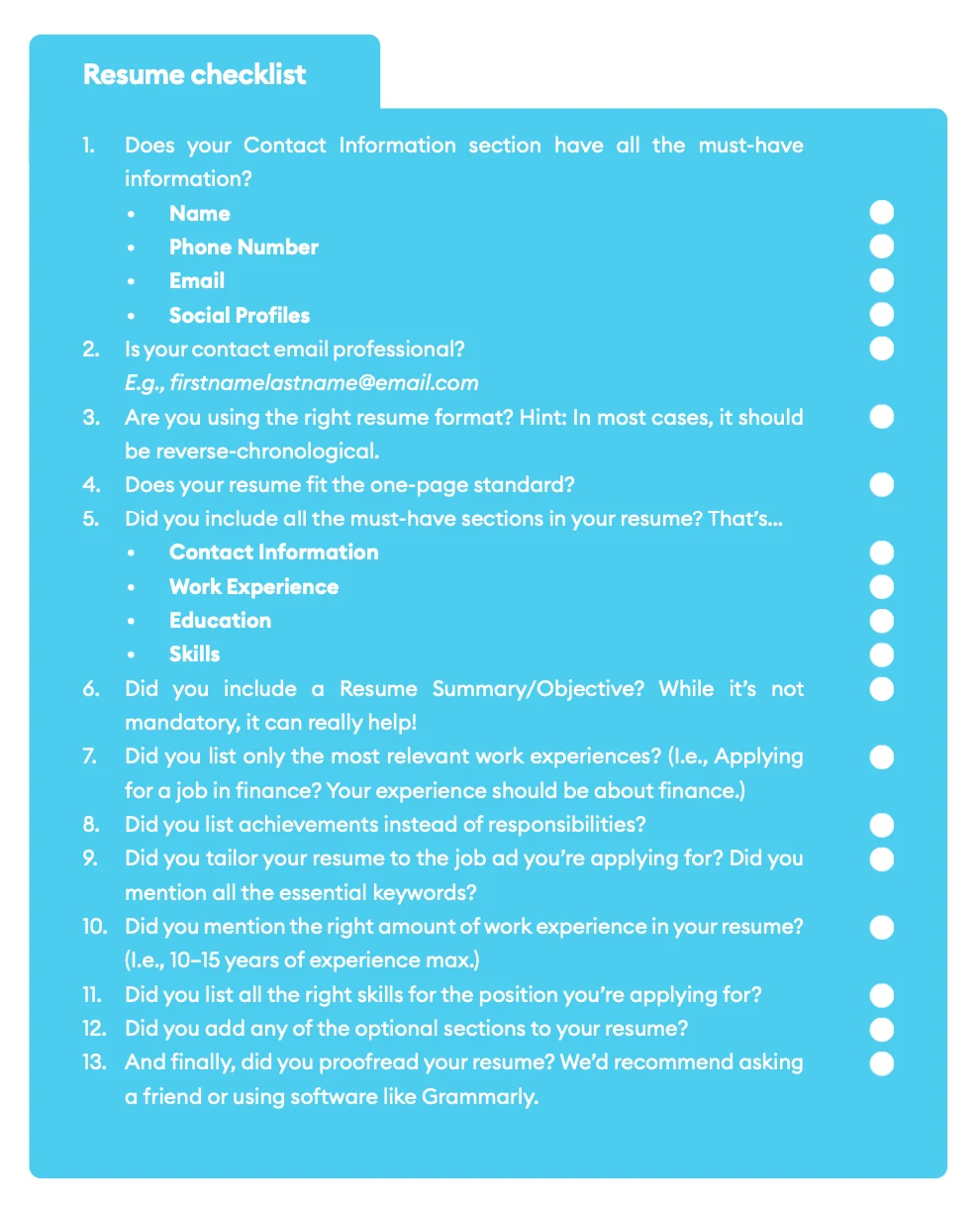
If you missed some points, just go through your resume one more time and perfect it.
And if you ☑’d everything—congrats! You’ve learned all there is to know about writing a resume, and you’re good to go with your job search.
Need to write a CV instead of a resume? Check out our step-by-step guide on how to write a CV with dozens of examples!
9 Resume Templates for Different Industries
Looking to create an effective resume without dealing with the formatting hassle? Just choose one of the templates below.
#1. Traditional Resume Template
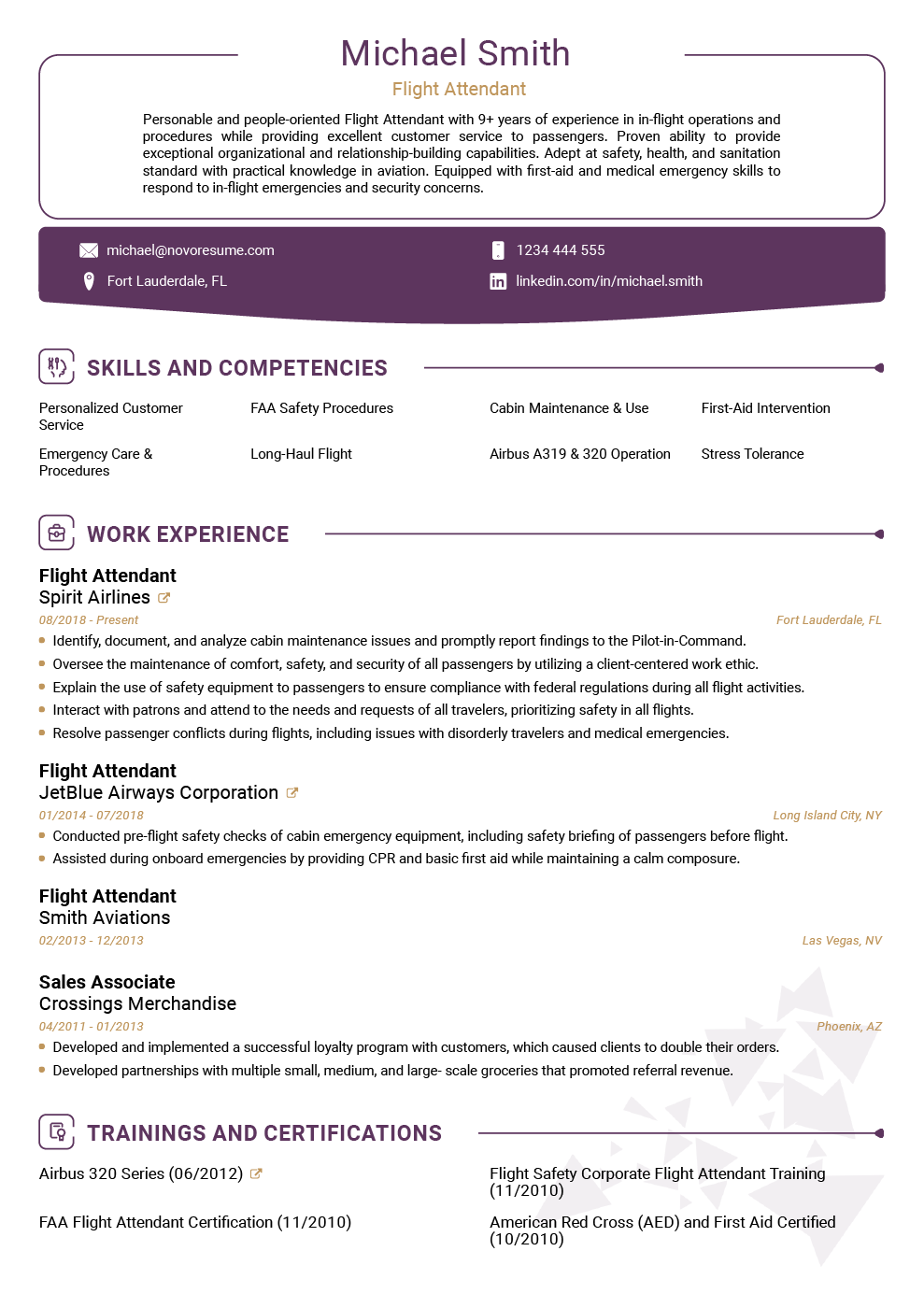
Good for traditional industries like finance, banking, law, and manufacturing.
#2. Modern Resume Template
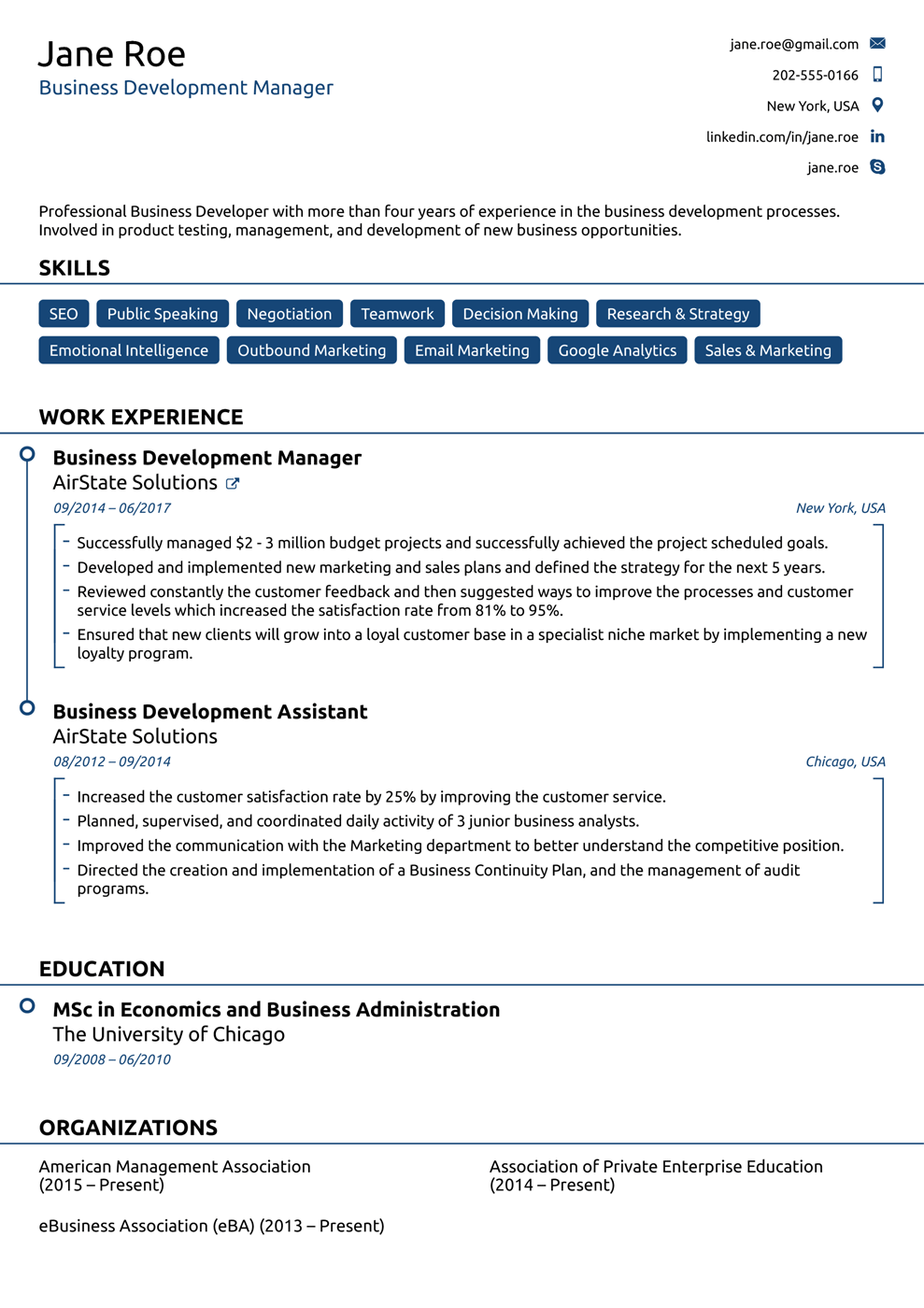
Good for both contemporary and forward-looking industries, including entrepreneurship, medical technology, and engineering.
#3. Creative Resume Template
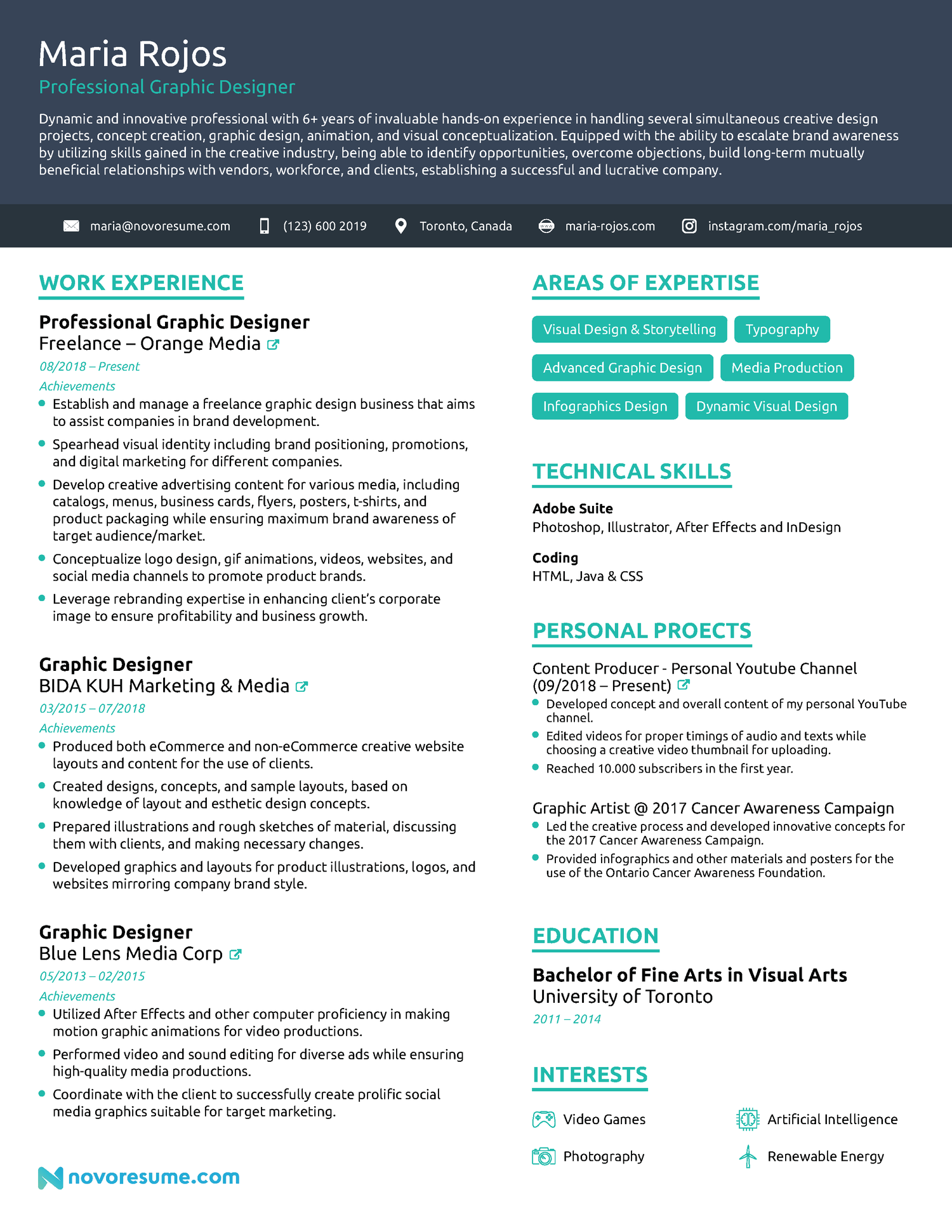
Good for creative industries, including entertainment, design, and architecture.
#4. Minimalistic Resume Template
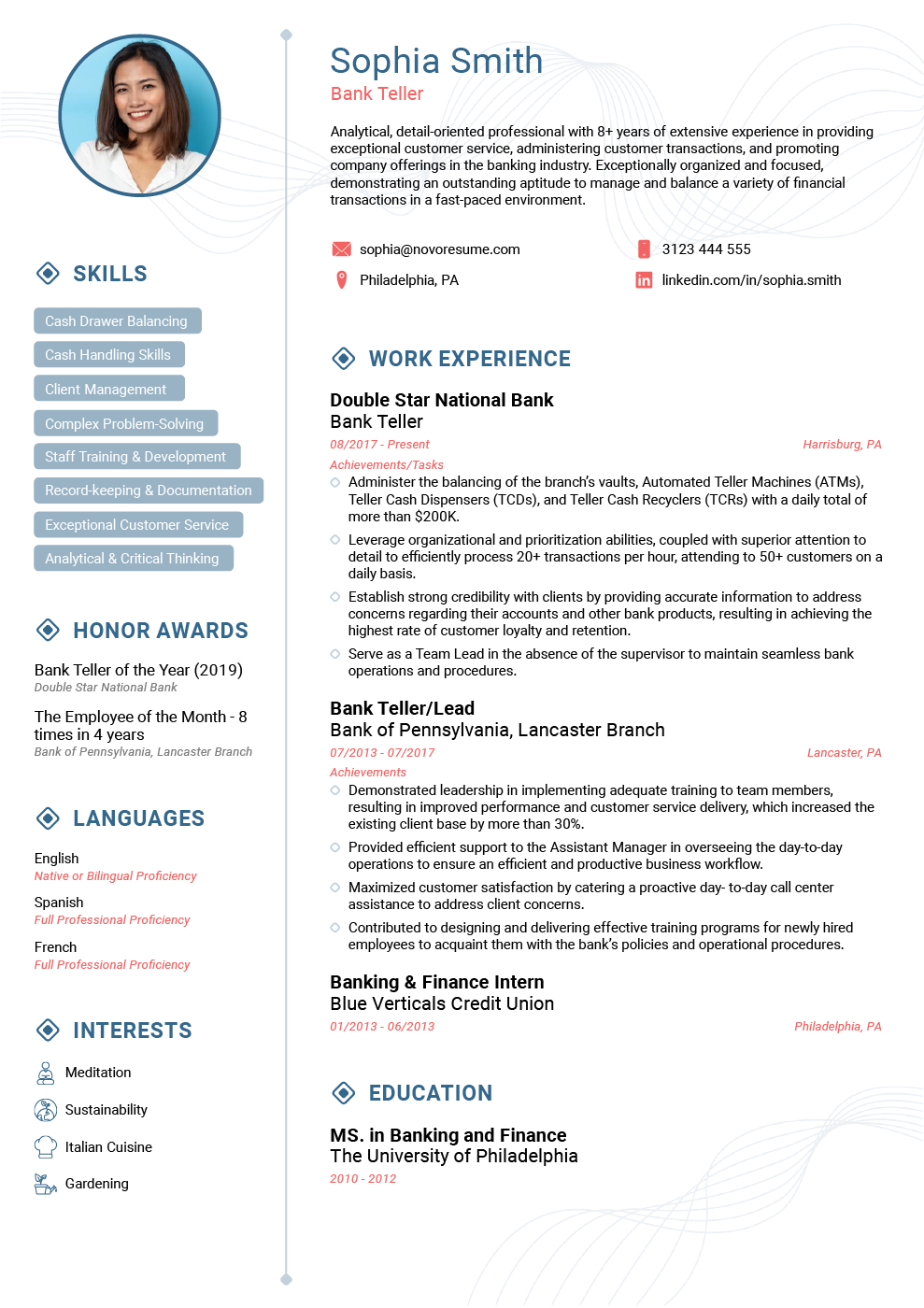
Good for experienced professionals in basically any industry who want to let their achievements do the talking.
#5. IT Resume Template
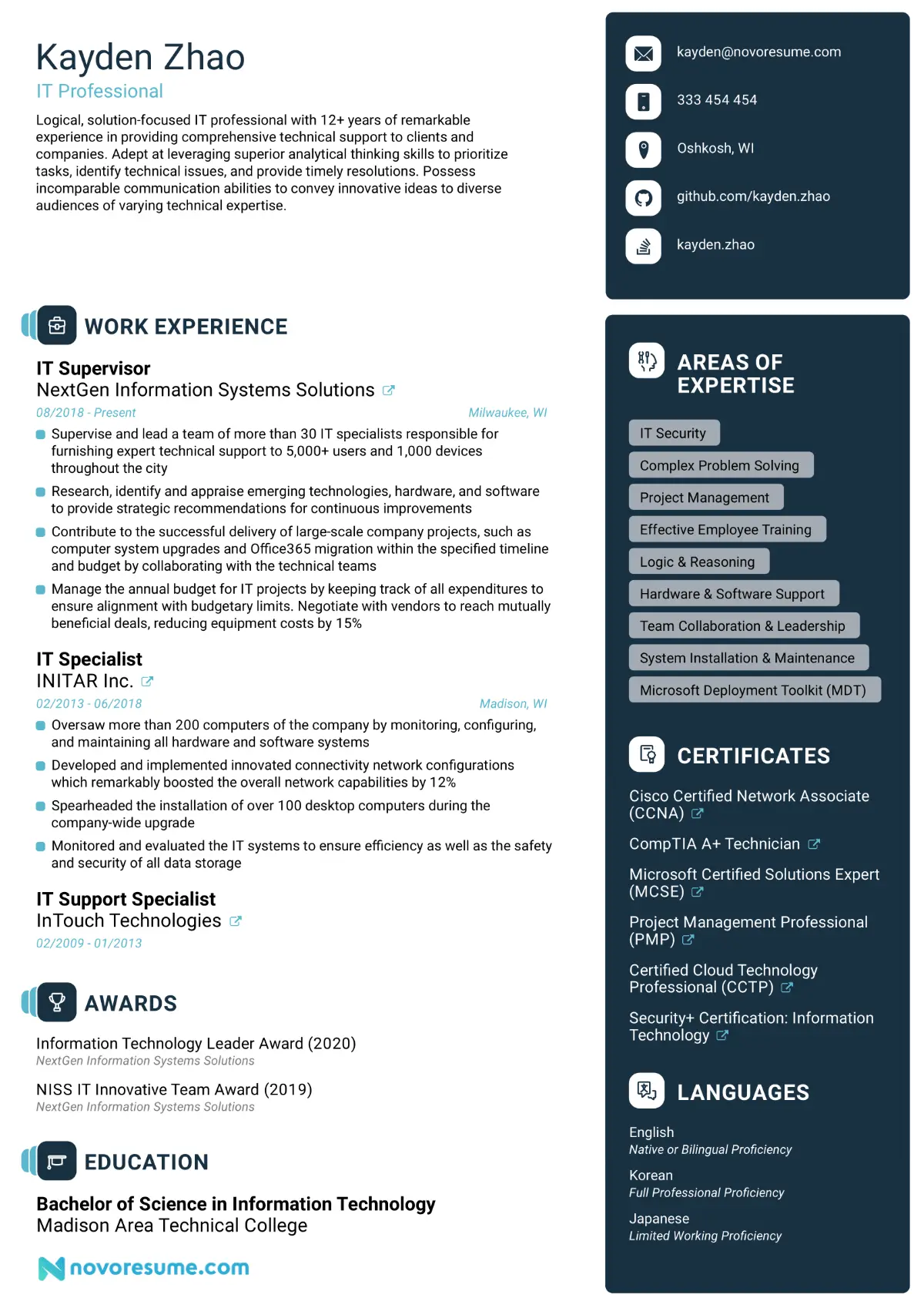
Good for any IT-related profession like software development, cyber security, and DevOps engineering.
#6. Tech Resume Template
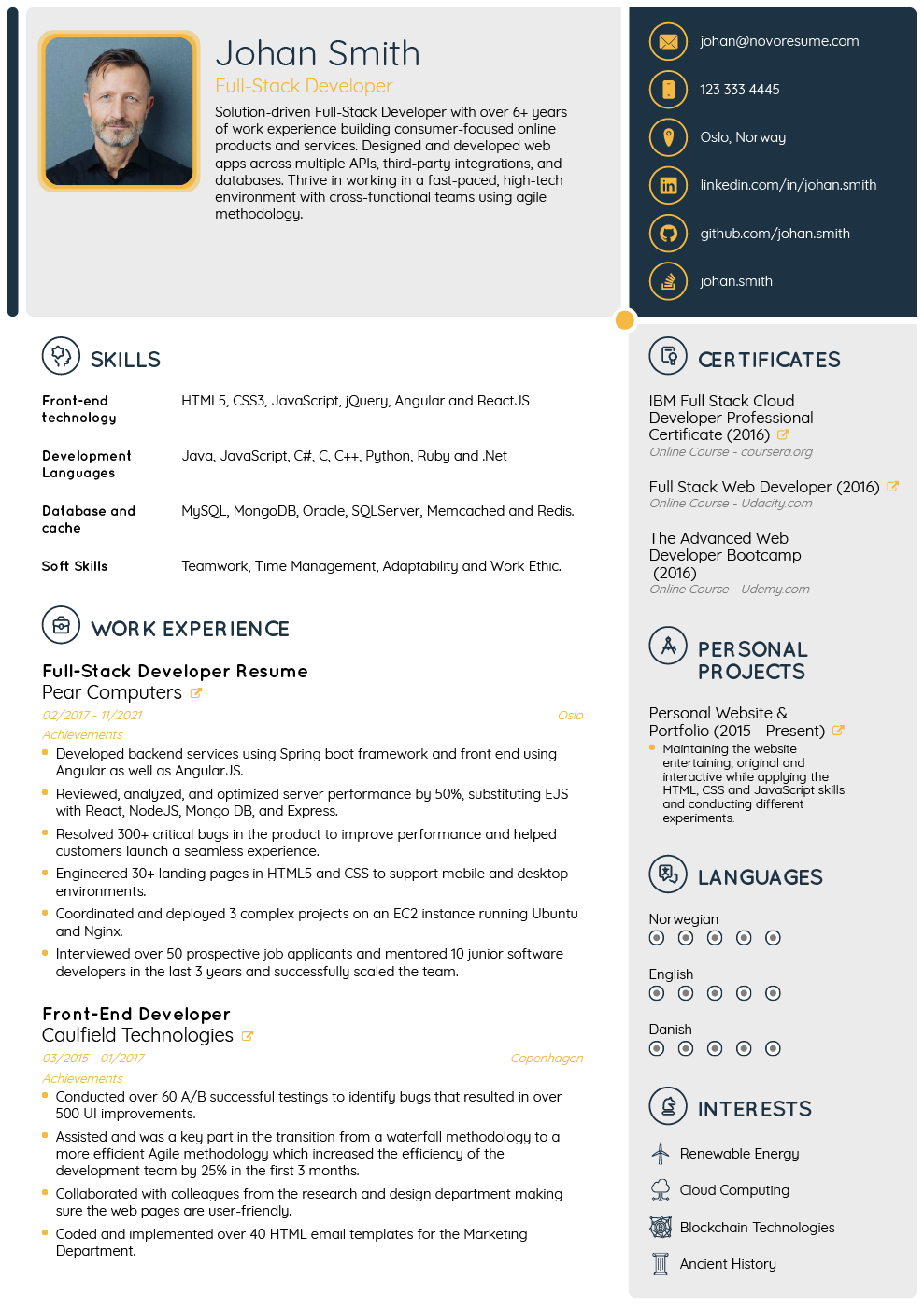
Good for the tech industry and everything it encompasses.
#7. College Resume Template
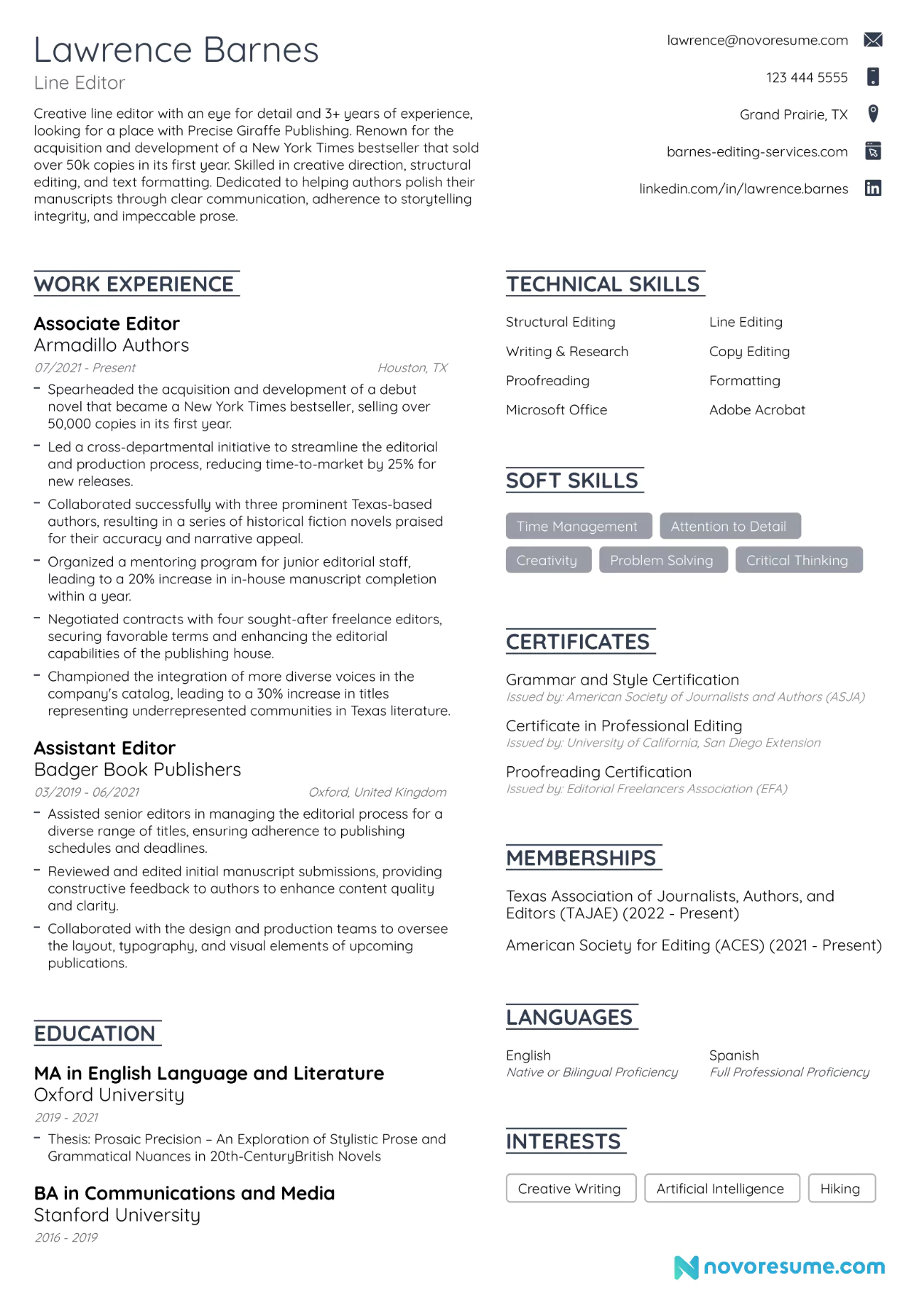
Good for college students and recent graduates alike.
#8. General Resume Template
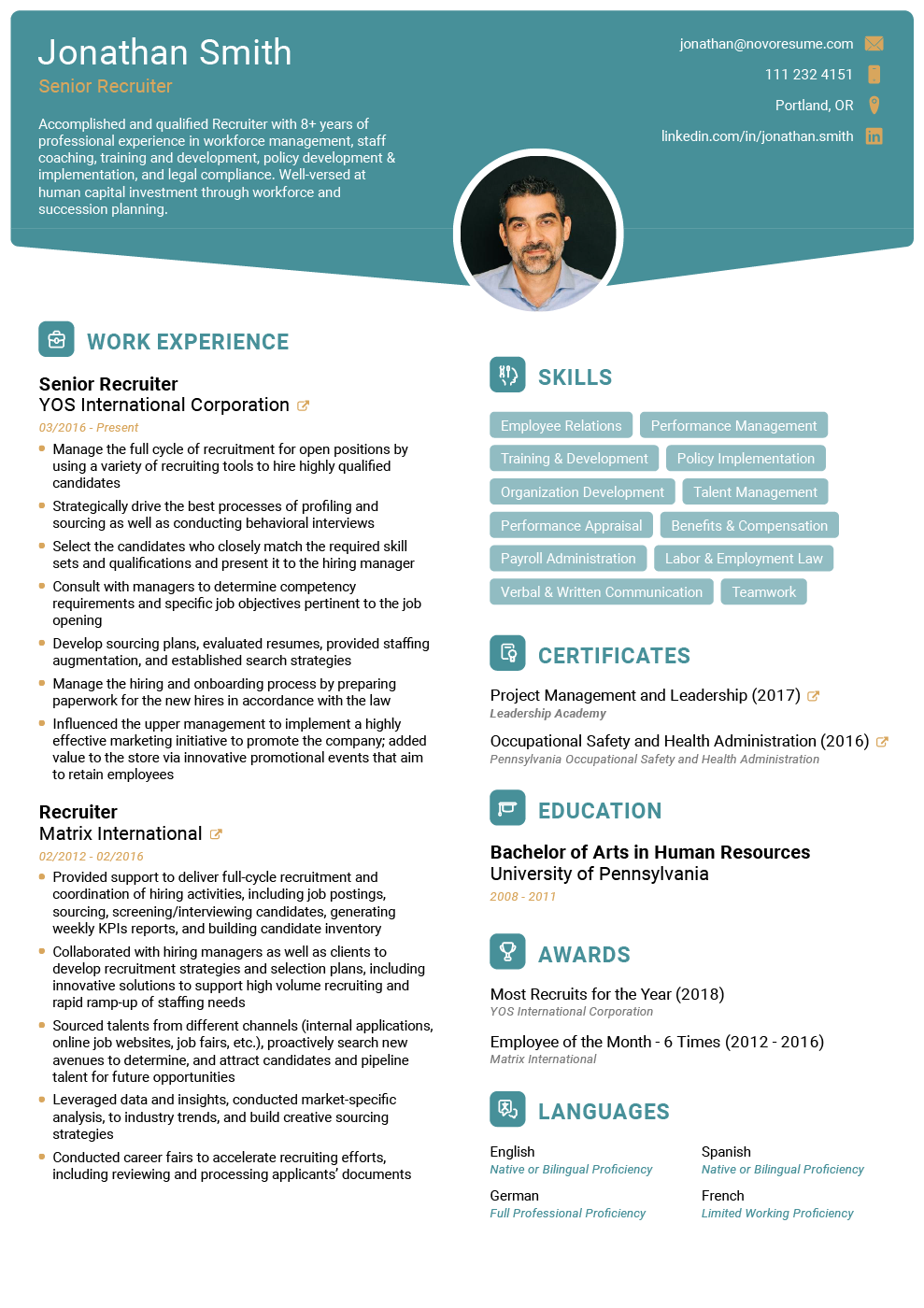
Good for multiple industries, including HR, education, and customer service.
#9. Executive Resume Template
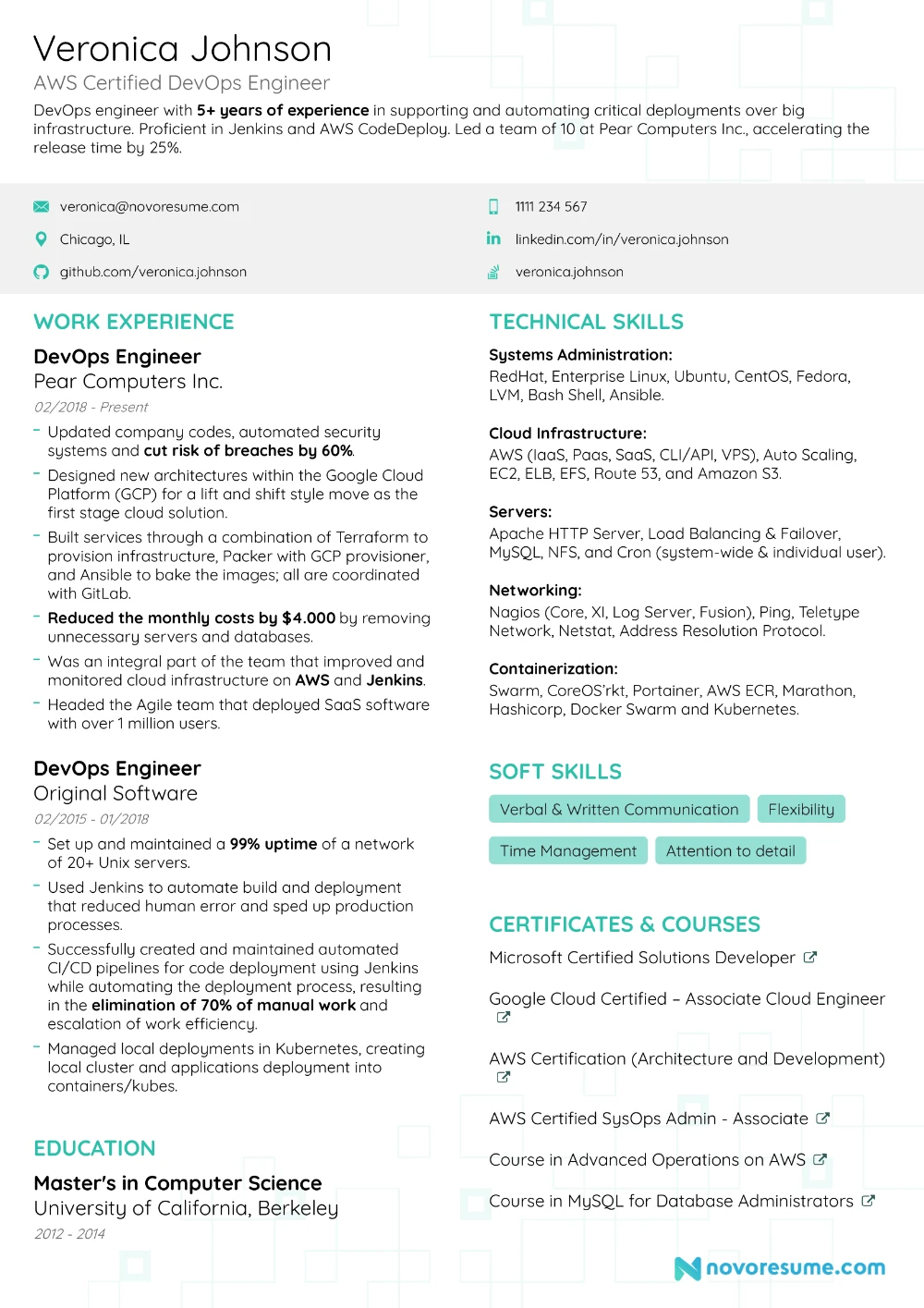
Good for senior professionals across different industries, including hospitality, marketing, and logistics.
17+ Resumes for Different Jobs
Knowing how to write a resume is one thing, but making a resume that stands out is something entirely different. Without inspiration, even top career experts might stumble on a roadblock or two.
Check out the following effective resume examples for specific jobs to get a better sense of what a good resume looks like:
#1. Nurse Practitioner Resume Example
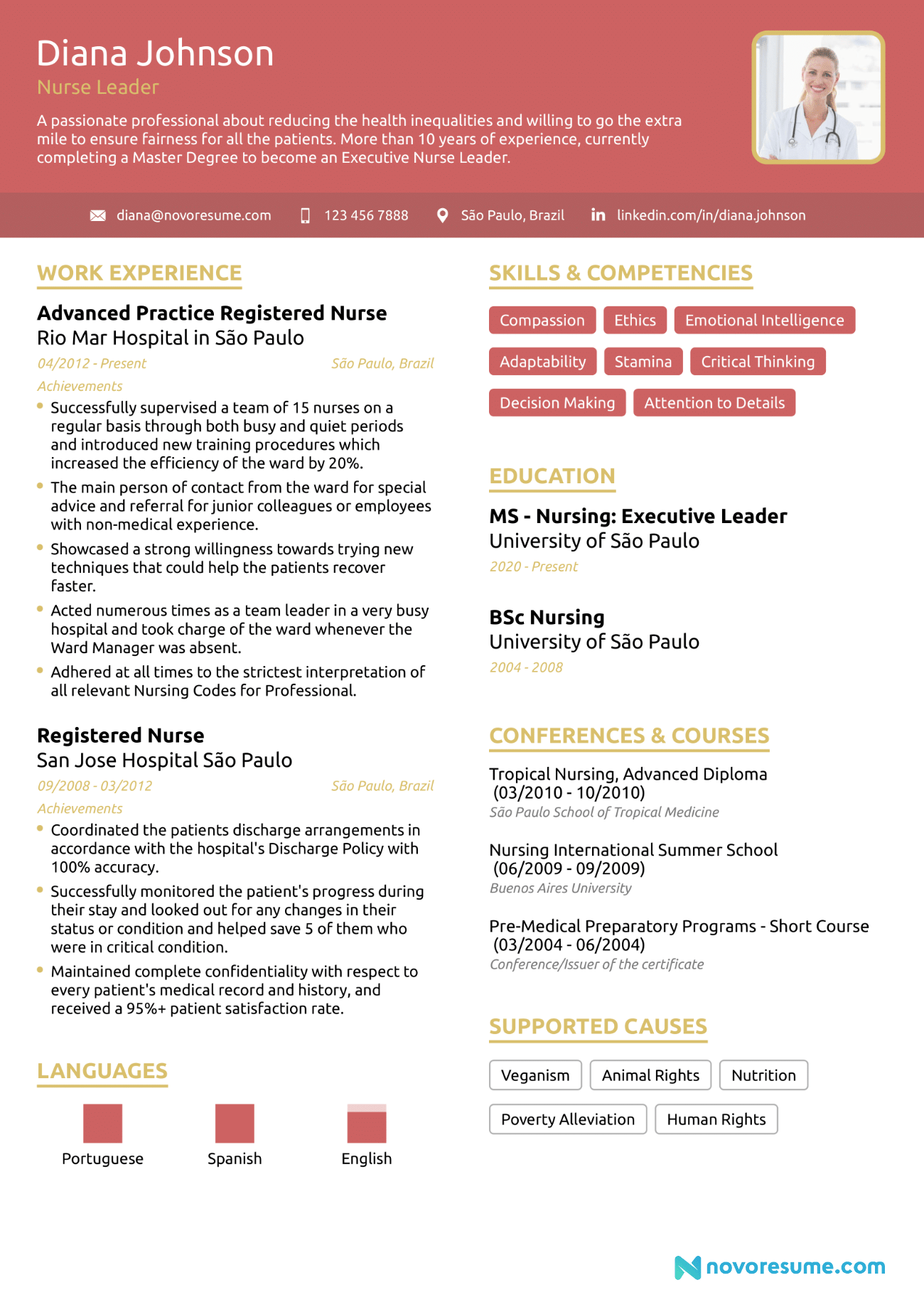
Check out our full guide to writing a nurse resume here.
#2. Data Scientist Resume Example
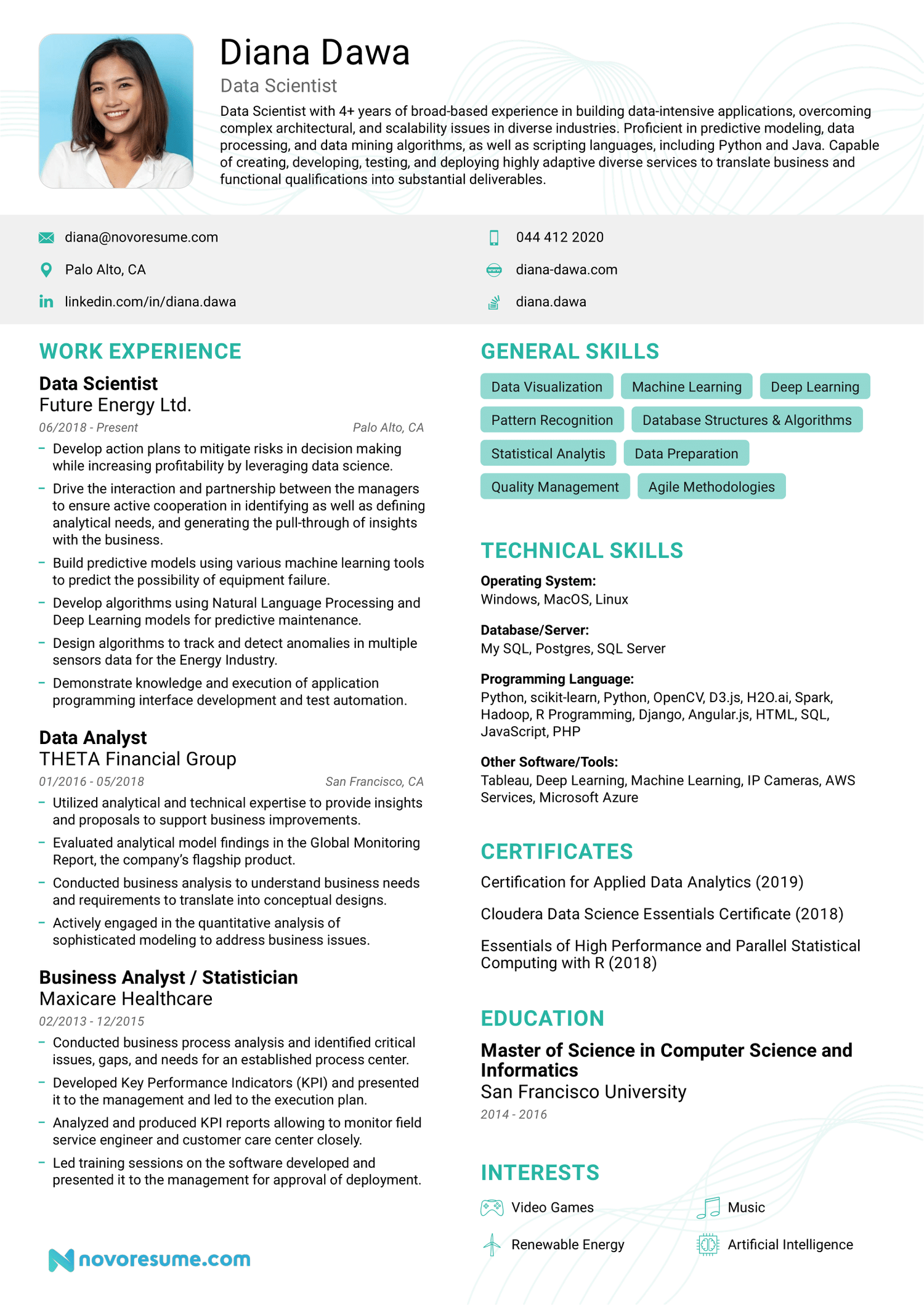
Check out our full guide to writing a data scientist resume here.
#3. Business Analyst Resume Example
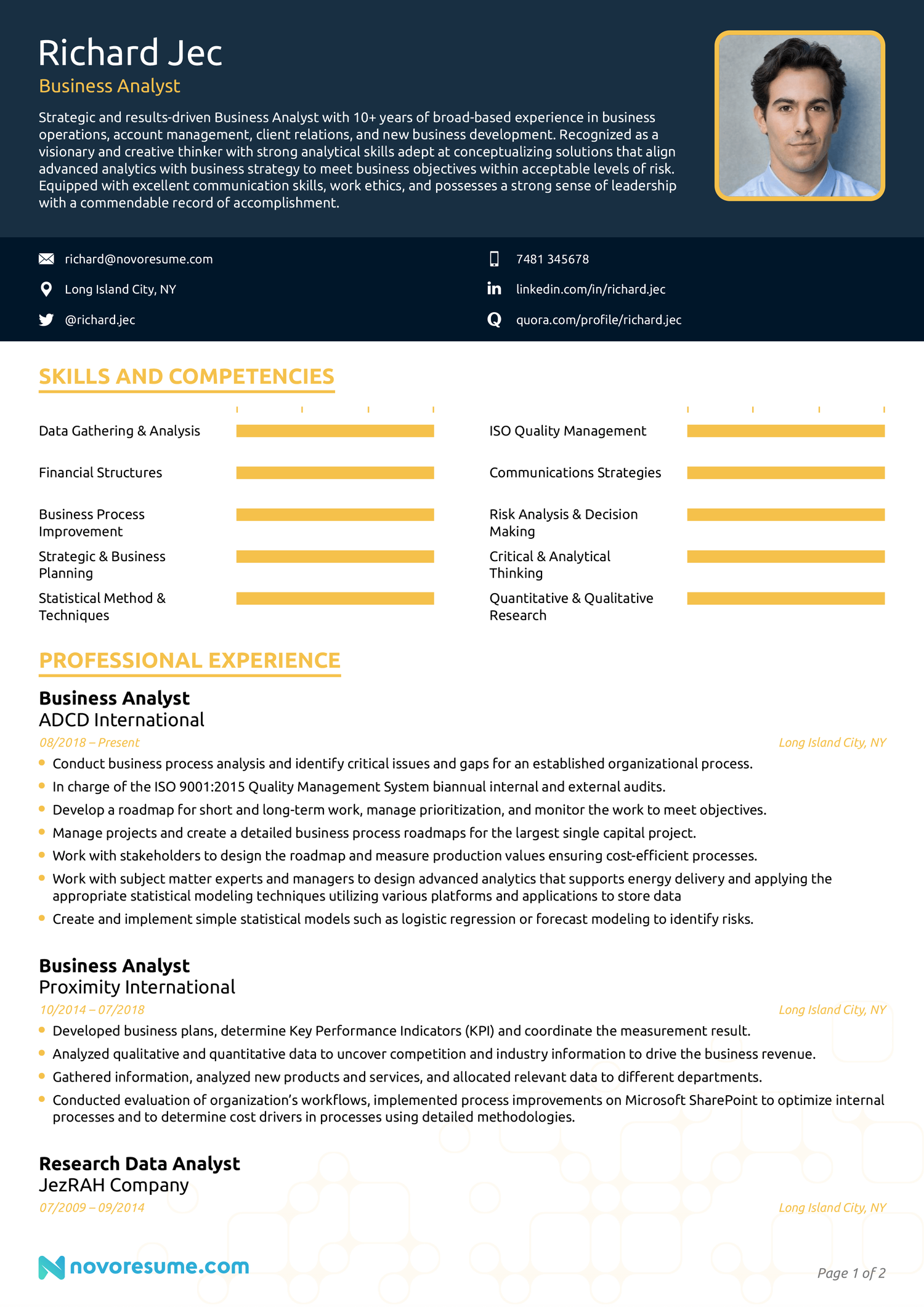
Check out our full guide to writing a business analyst resume here.
#4. Digital Marketing Resume Example
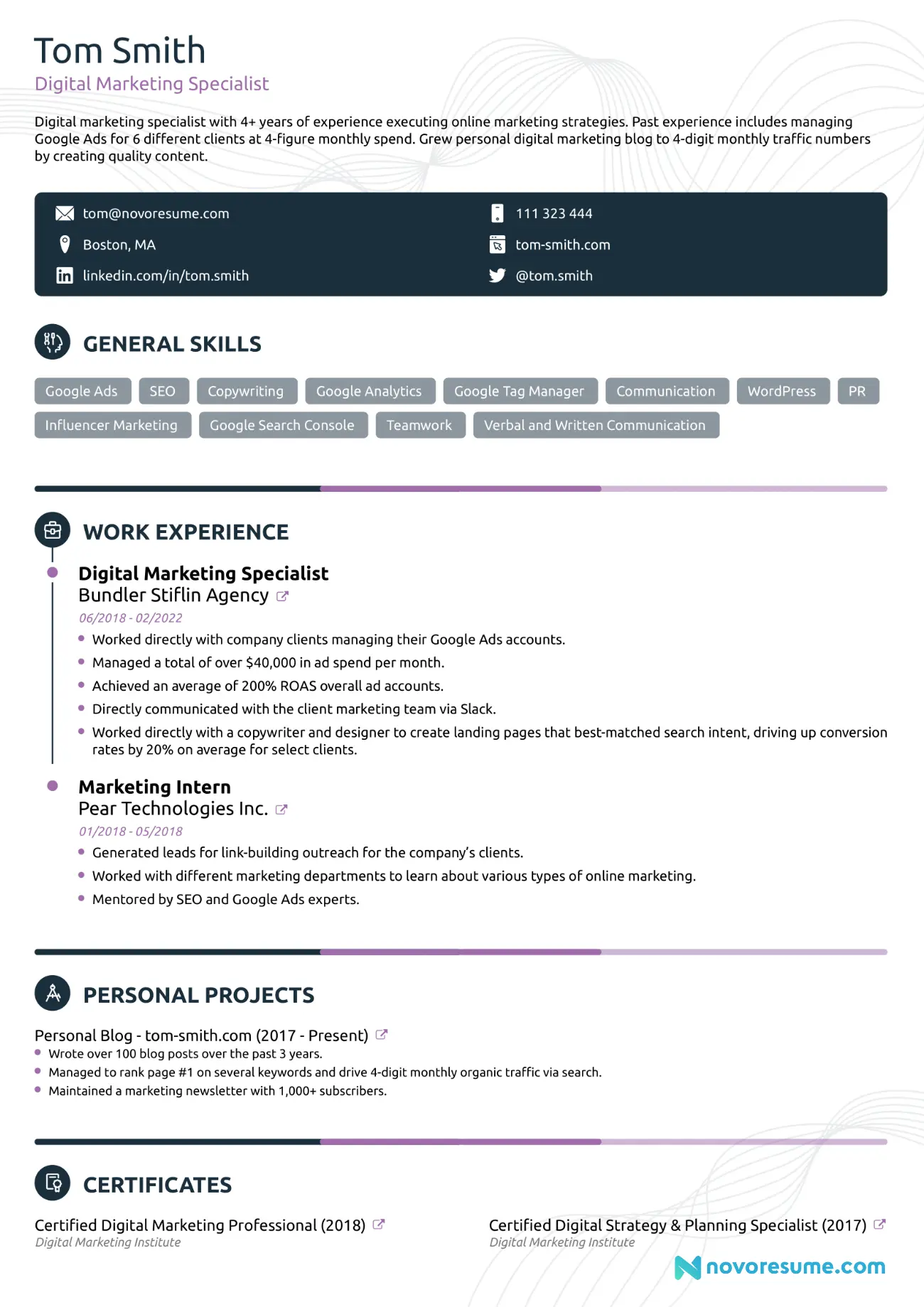
Check out our full guide to writing a digital marketing resume here.
#5. Software Engineer Resume Example
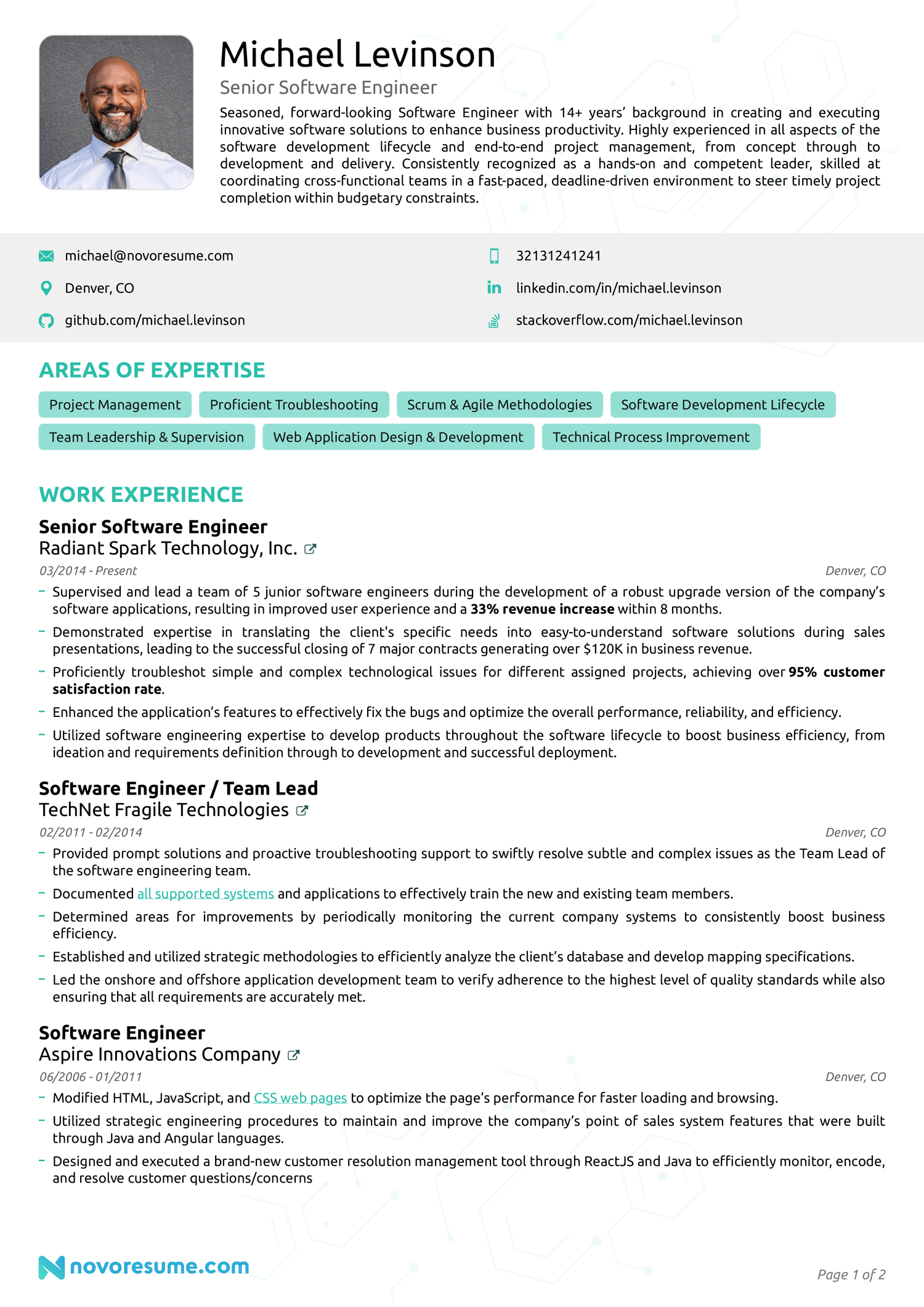
Check out our full guide to writing a software engineer resume here.
#6. Construction Project Manager Resume Example
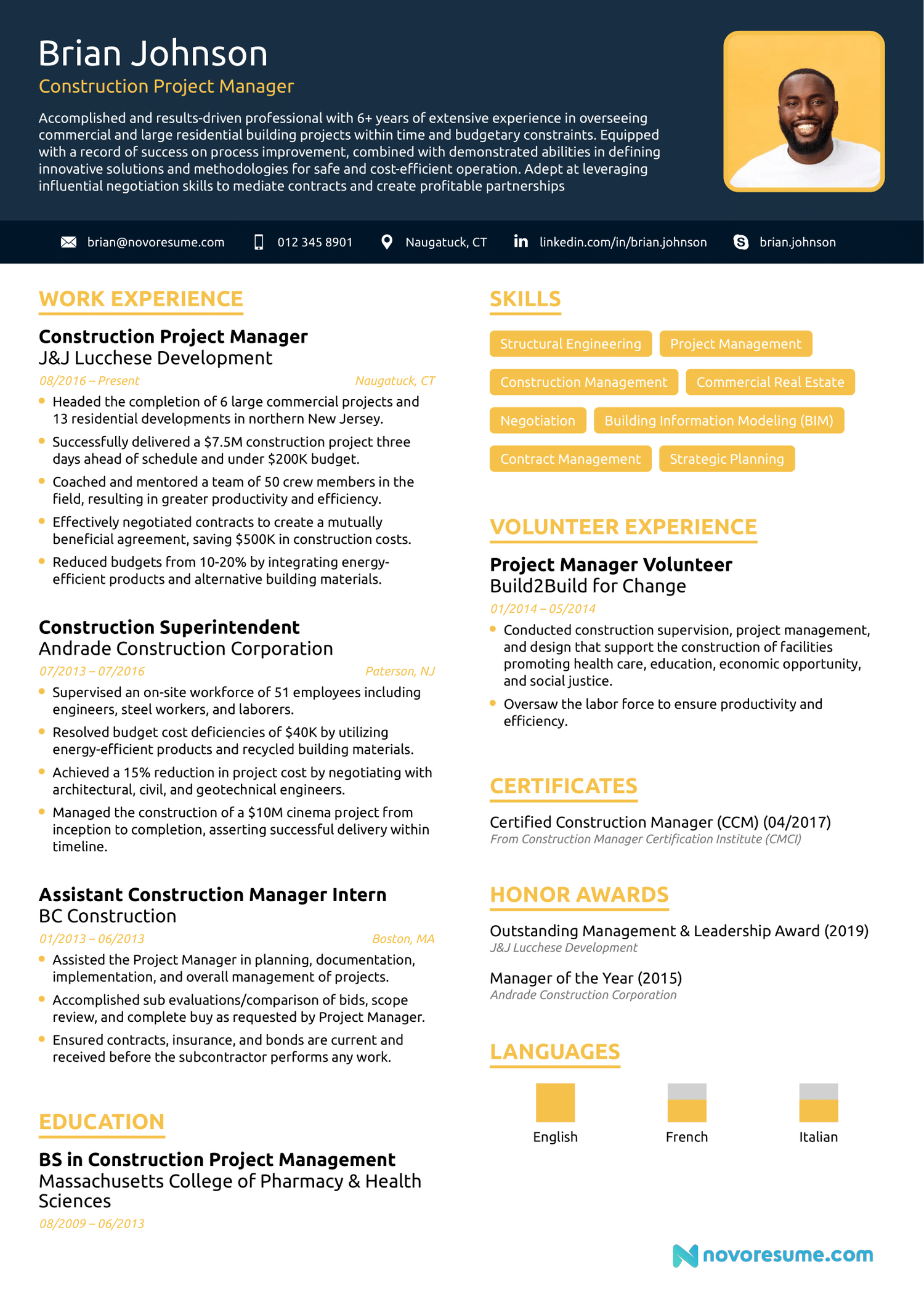
Check out our full guide to writing a construction project manager resume here.
#7. Customer Service Resume Example
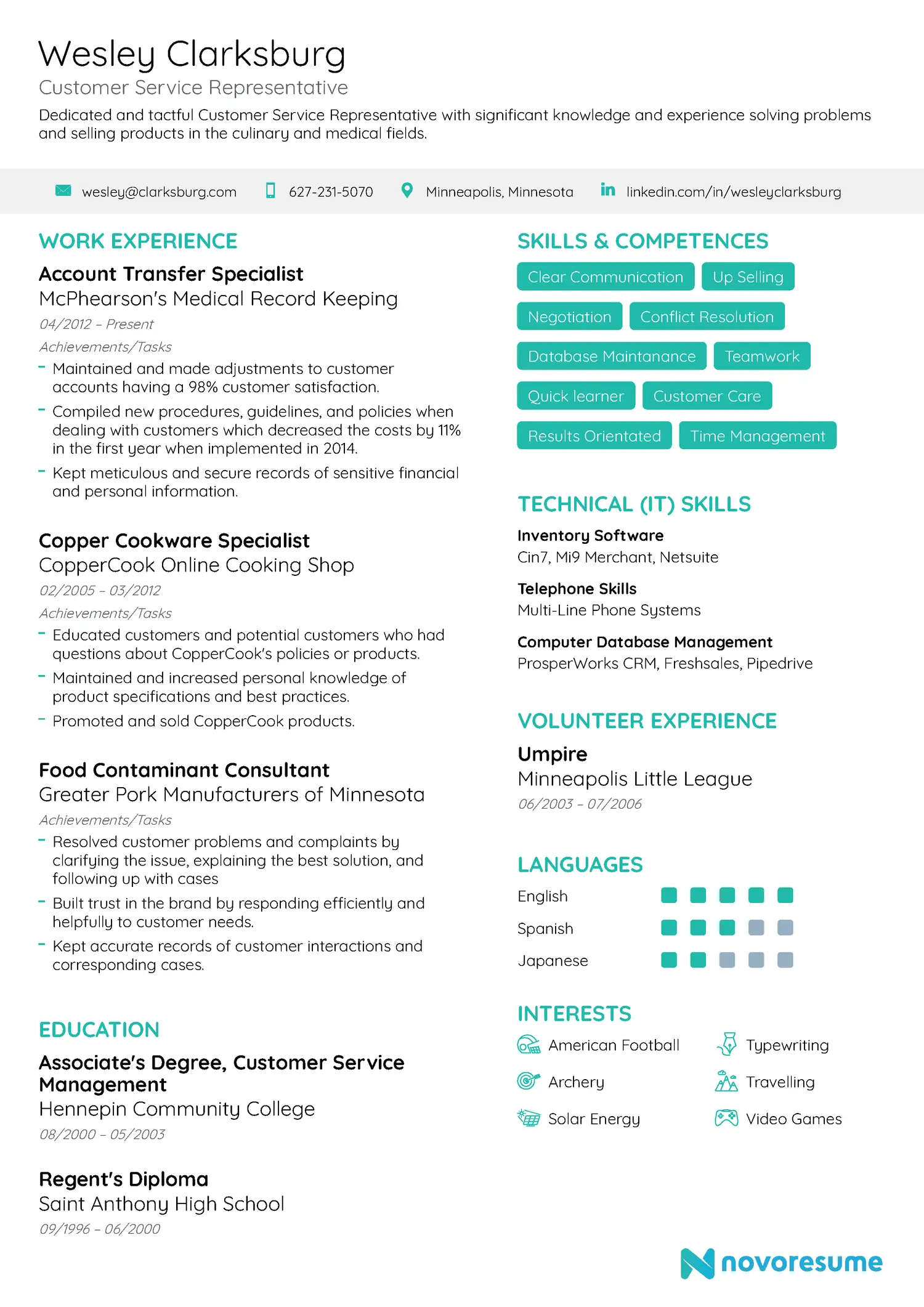
Check out our full guide to writing a customer service resume here.
#8. High School Resume Example
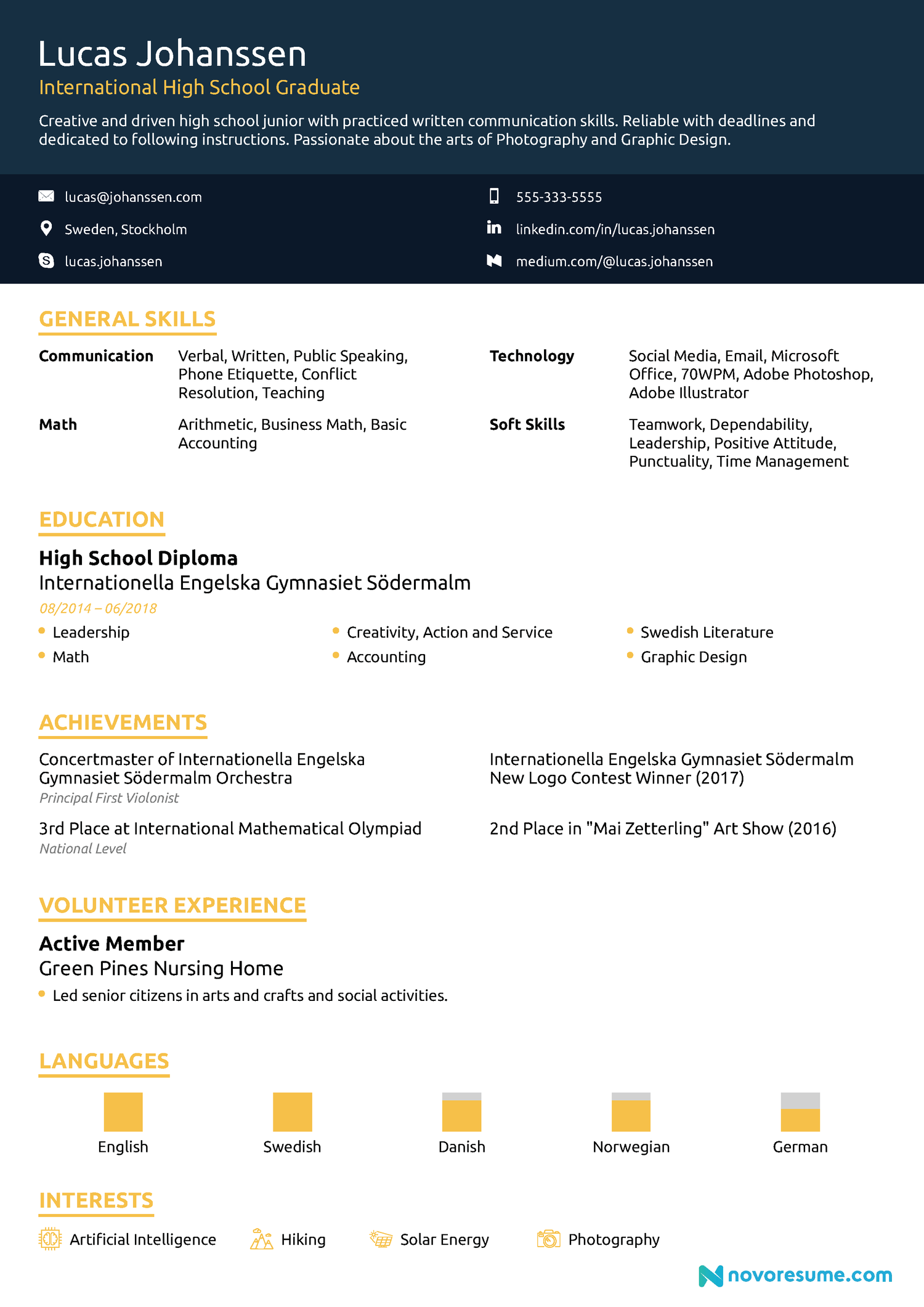
Check out our full guide to writing a high school resume here.
#9. Student Resume Example
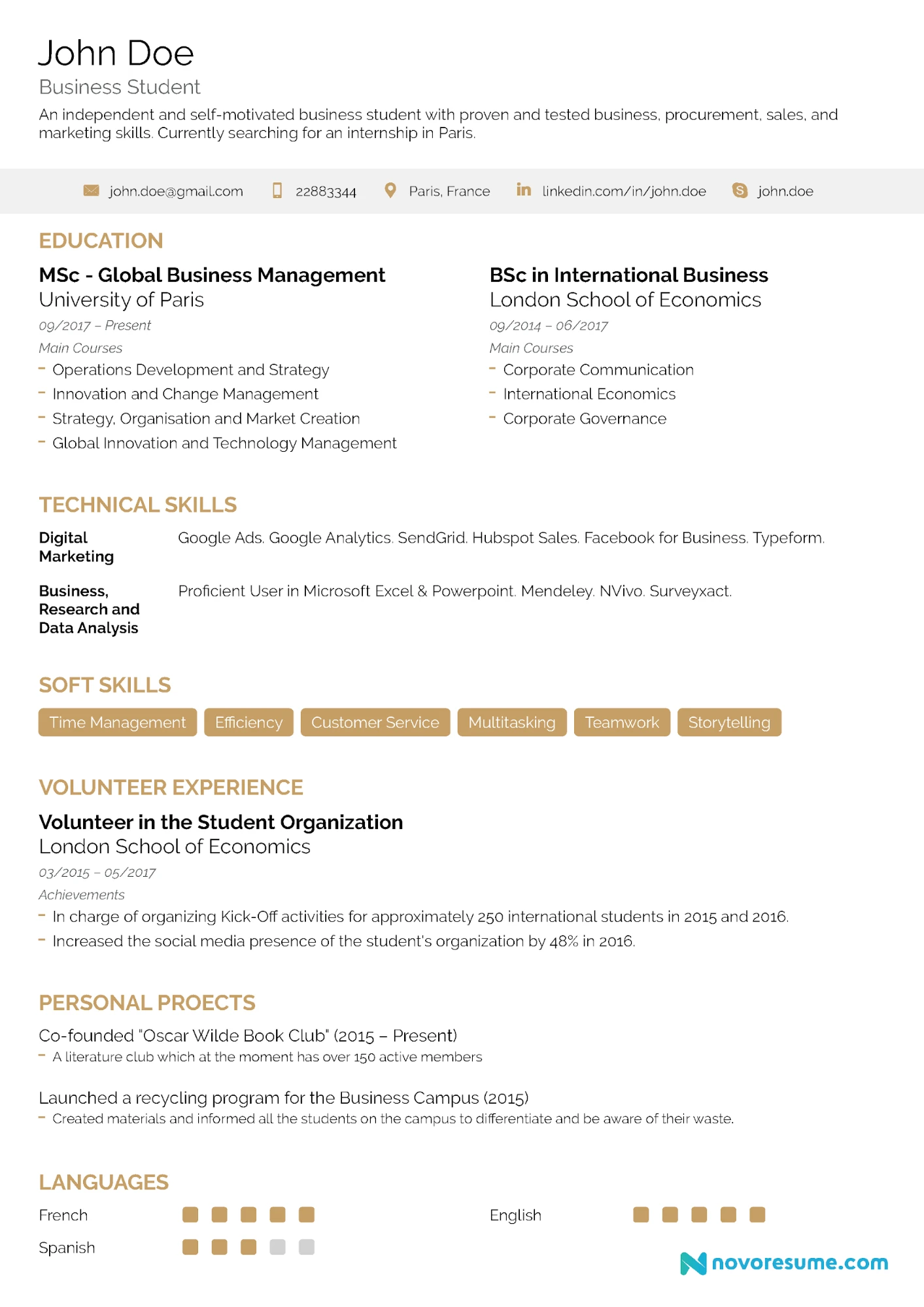
Check out our full guide to writing a student resume here.
#10. Server Resume Example
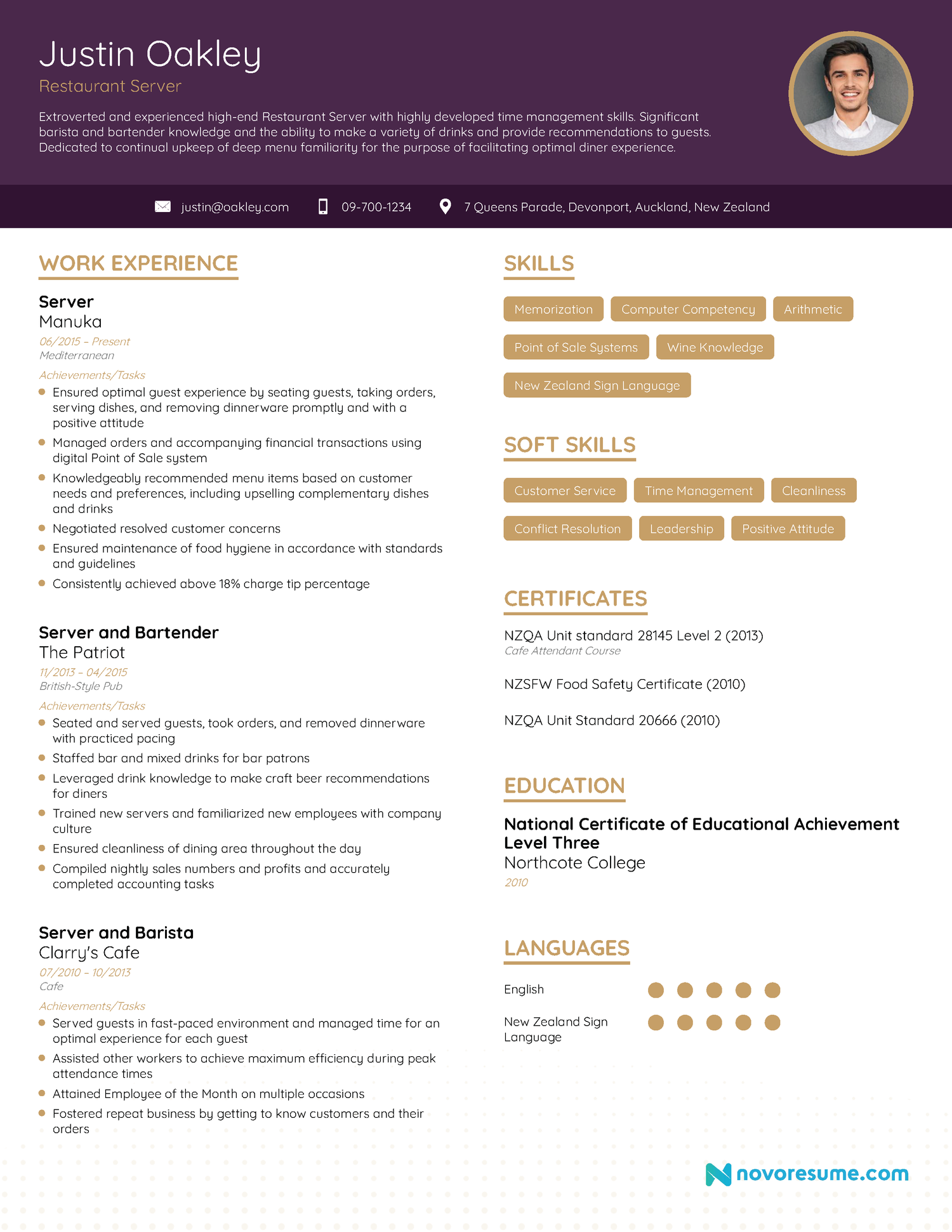
Check out our full guide to writing a server resume here.
#11. Actor Resume Example
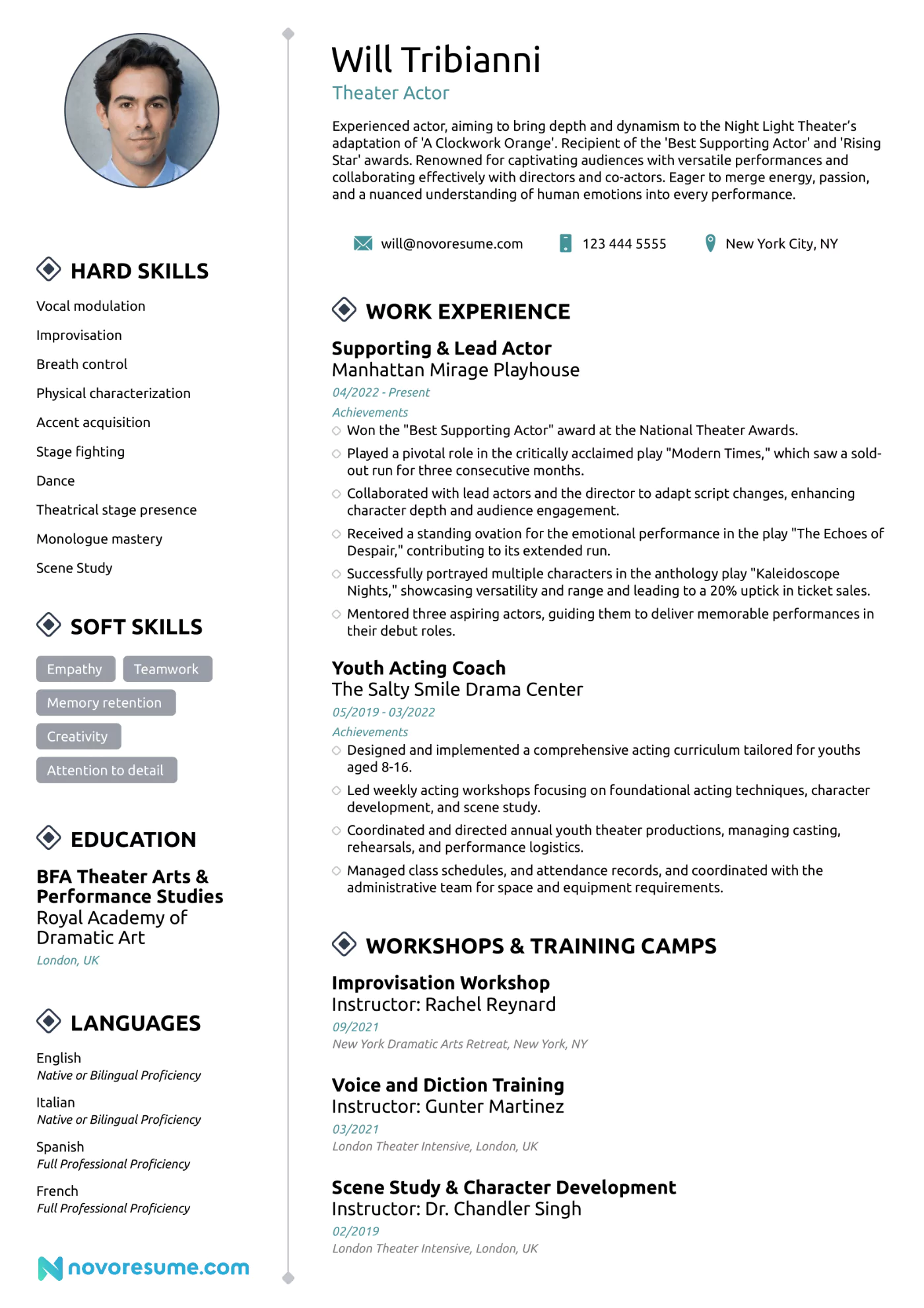
Check out our full guide to writing an actor resume here.
#12. Web Developer Resume Example
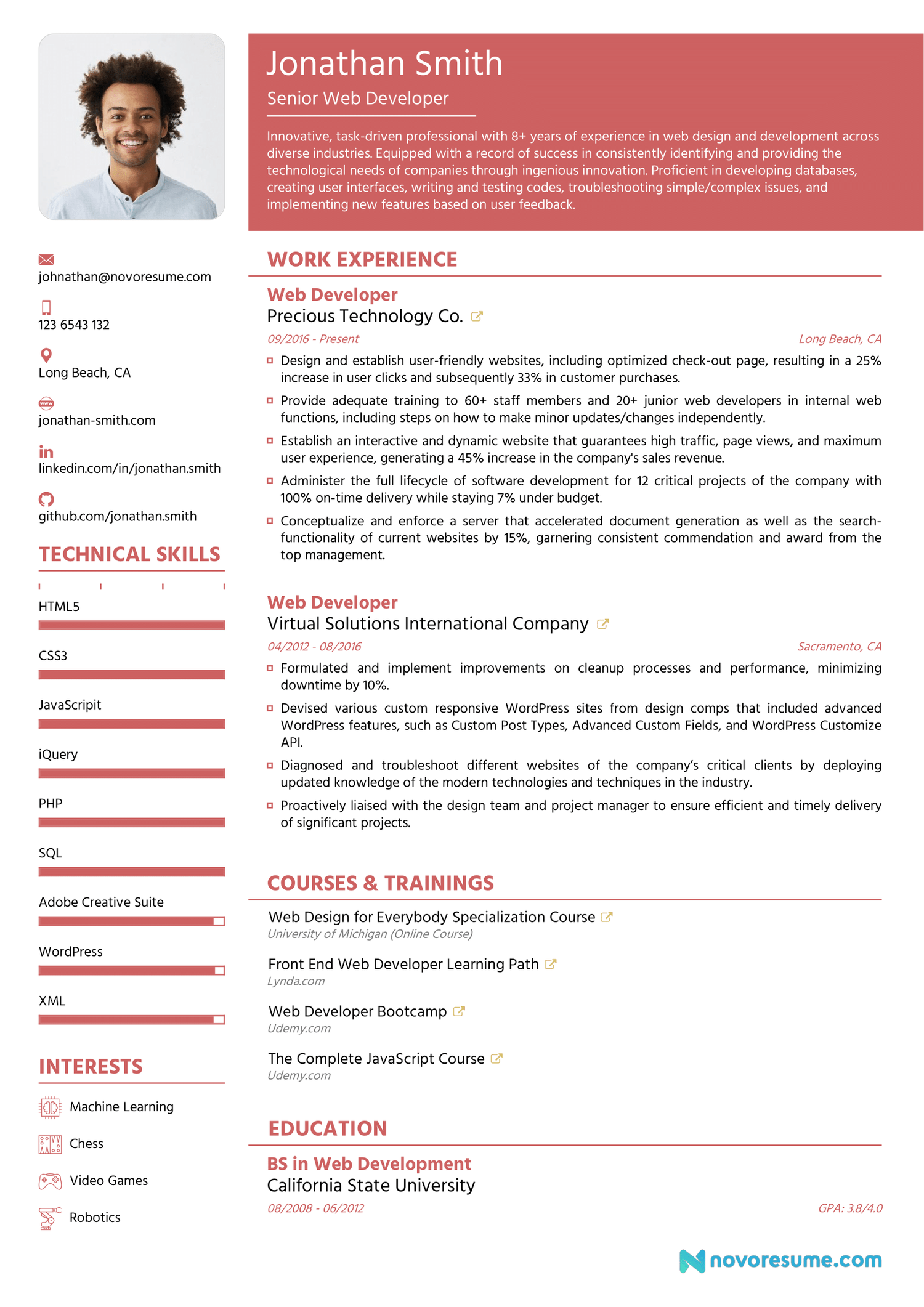
Check out our full guide to writing a web developer resume here.
#13. Engineering Resume Example
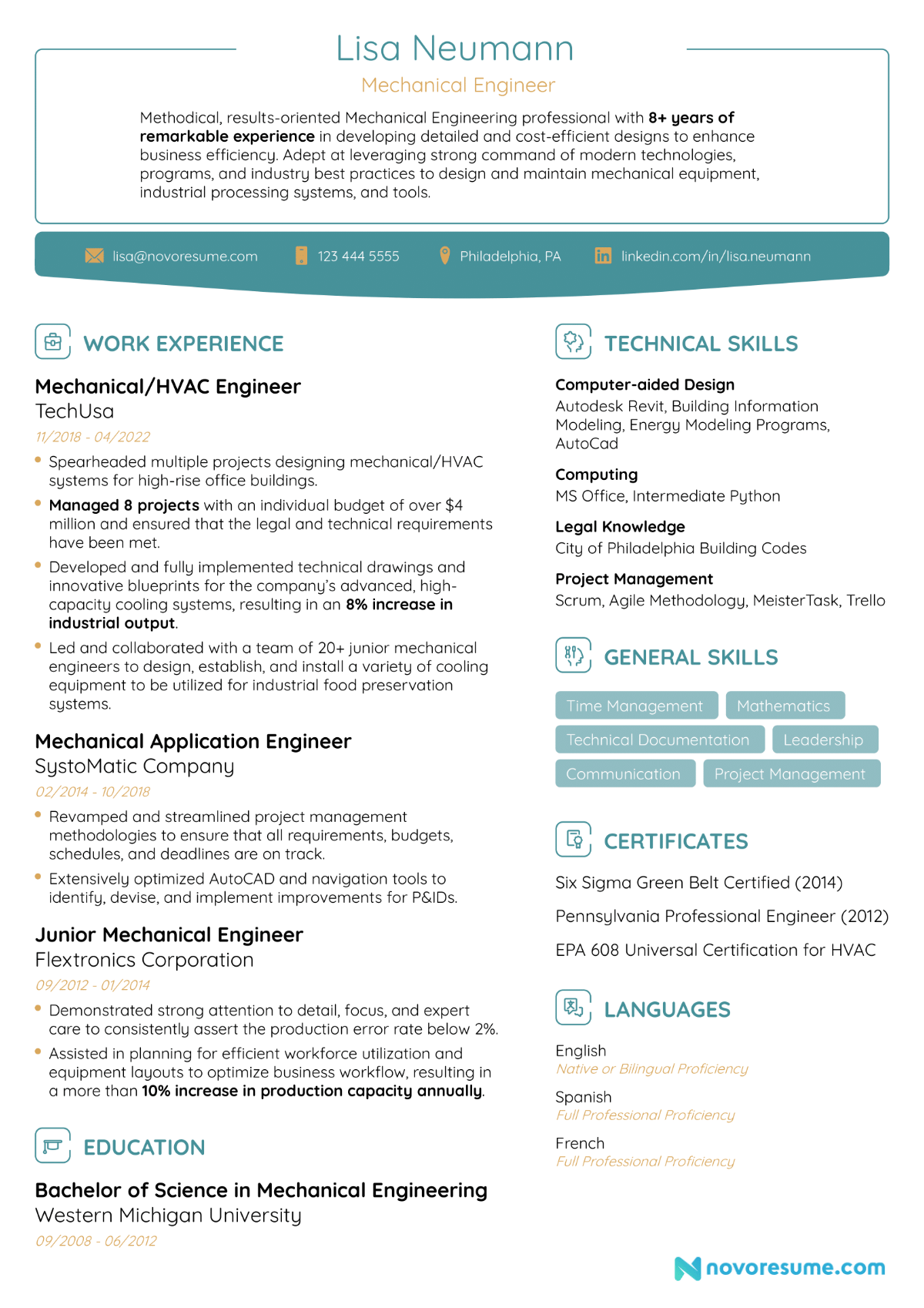
Check out our full guide to writing an engineering resume here.
#14. Computer Science Resume Example
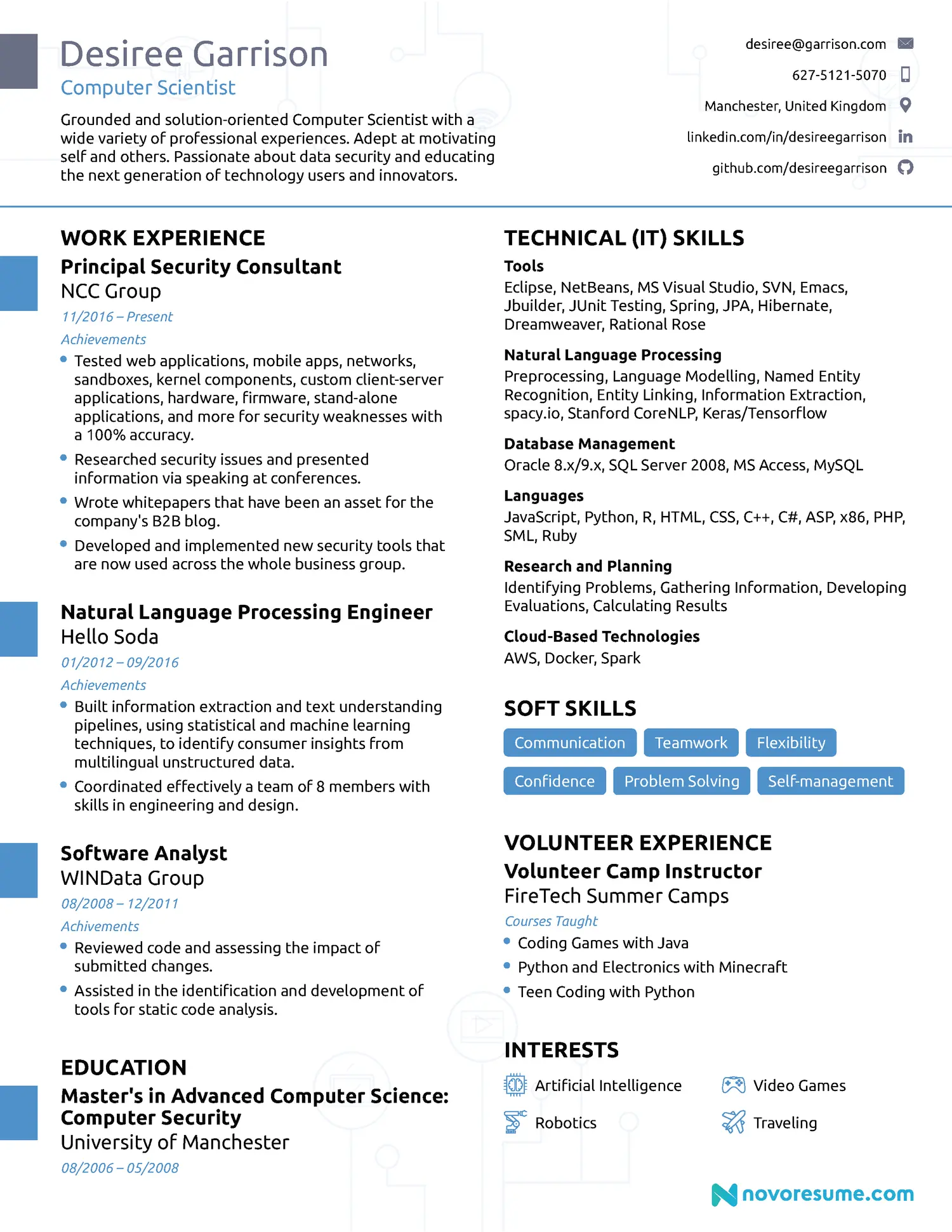
Check out our full guide to writing a computer science resume here.
#15. Architect Resume Example
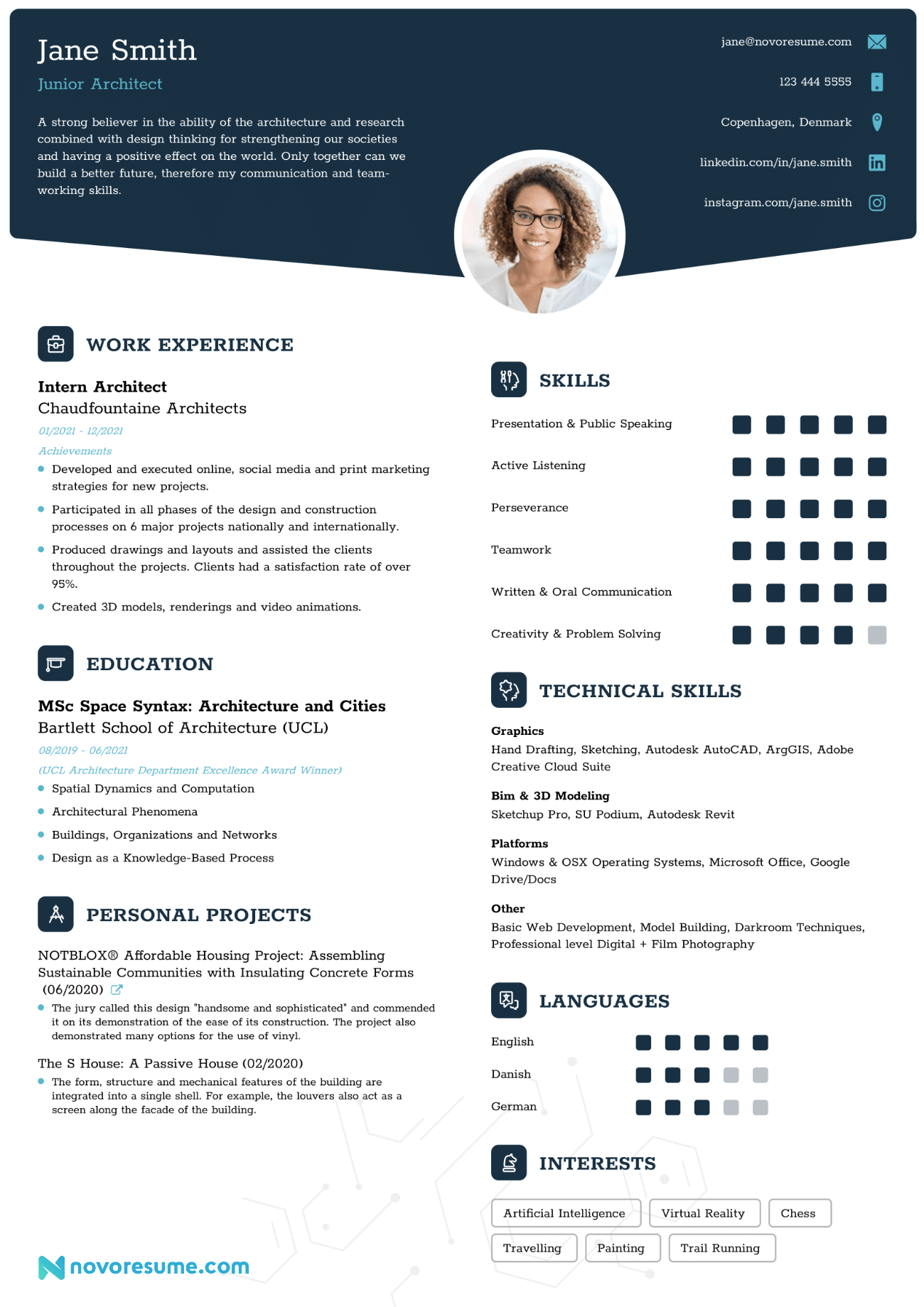
Check out our full guide to writing a data analyst resume here.
#17. Remote Job Resume Example
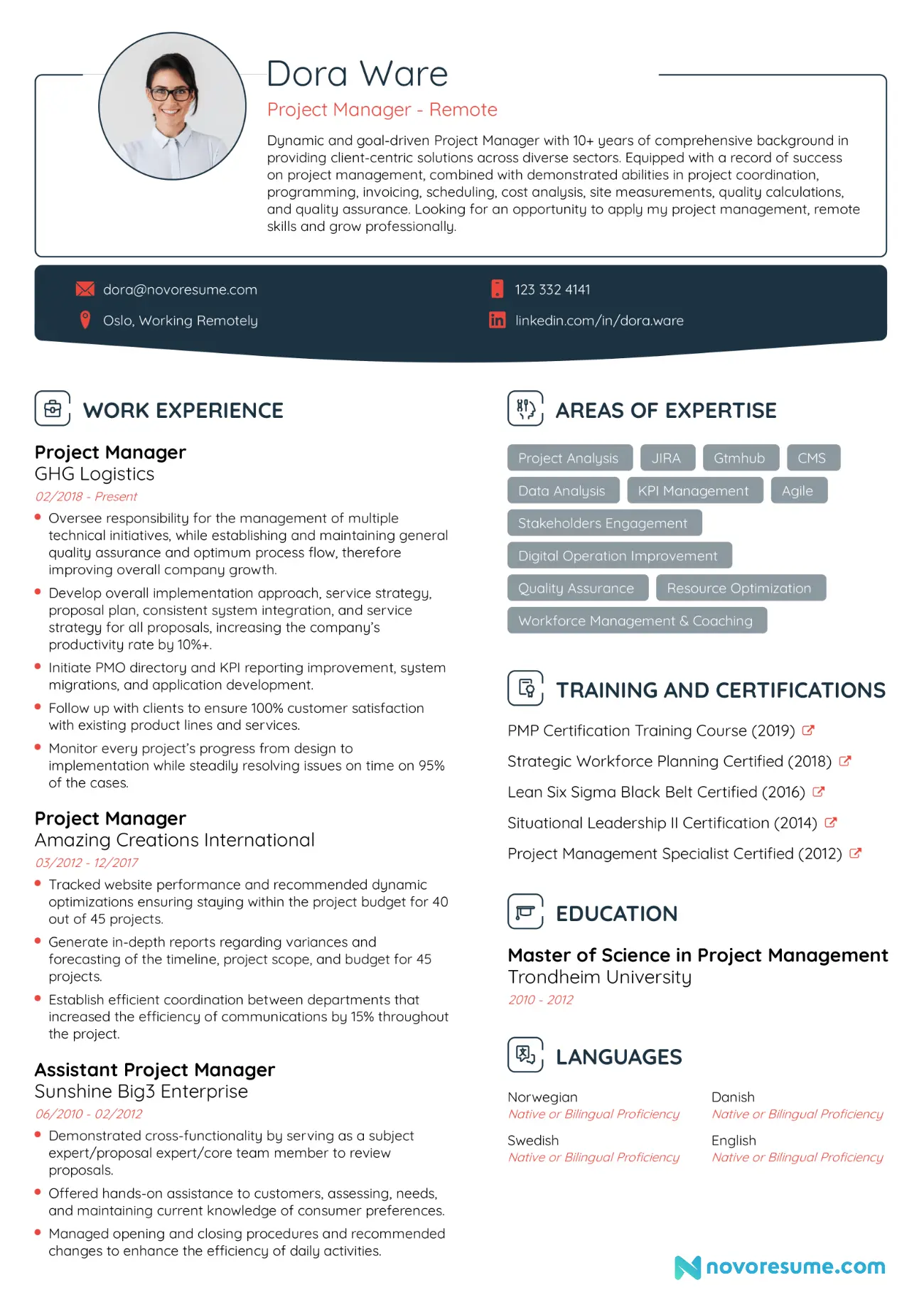
Check out our full guide to writing a remote job resume here.
#18. Sales Associate Resume Example
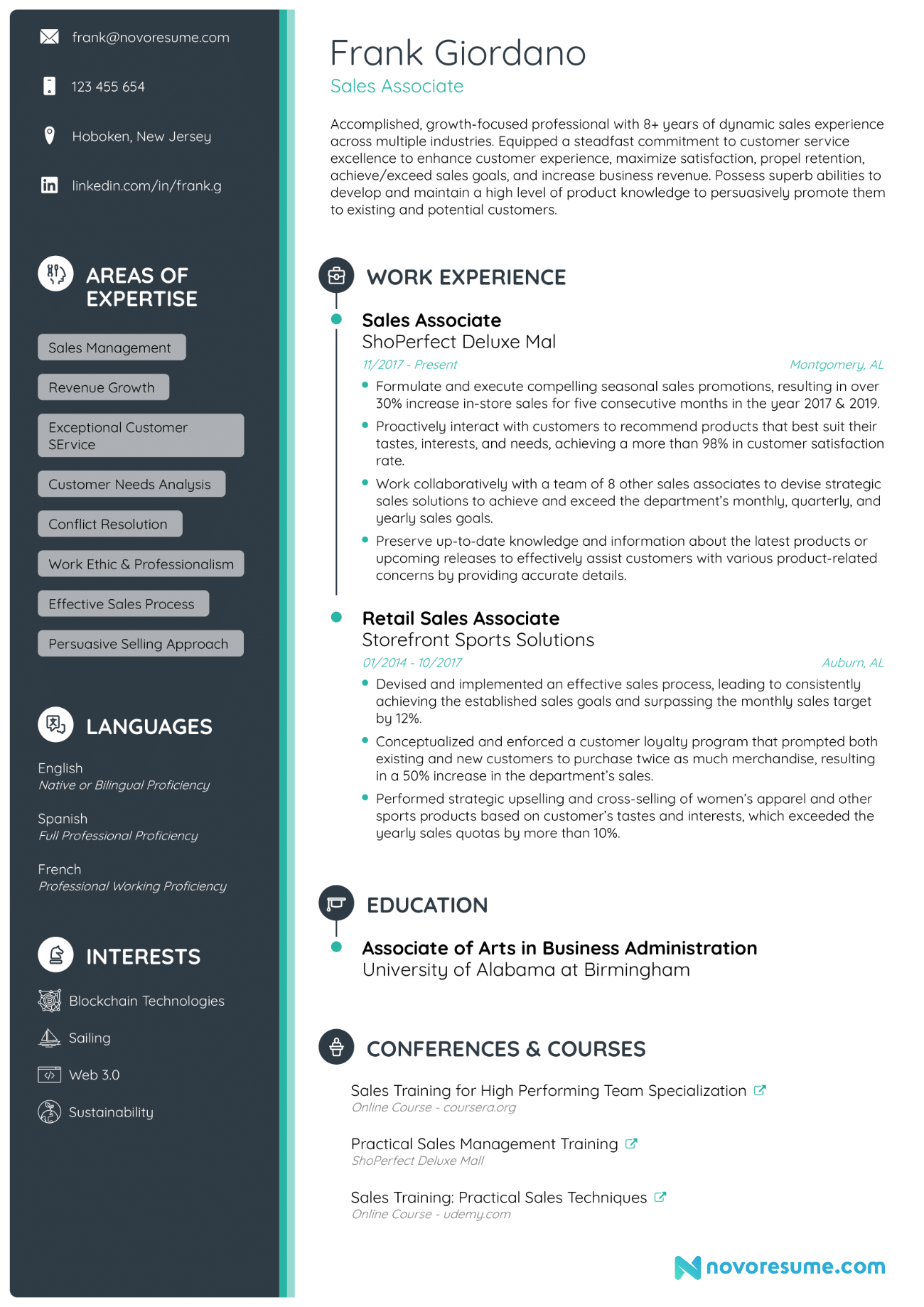
Check out our full guide to writing a sales associate resume here.
#19. Receptionist Resume Example
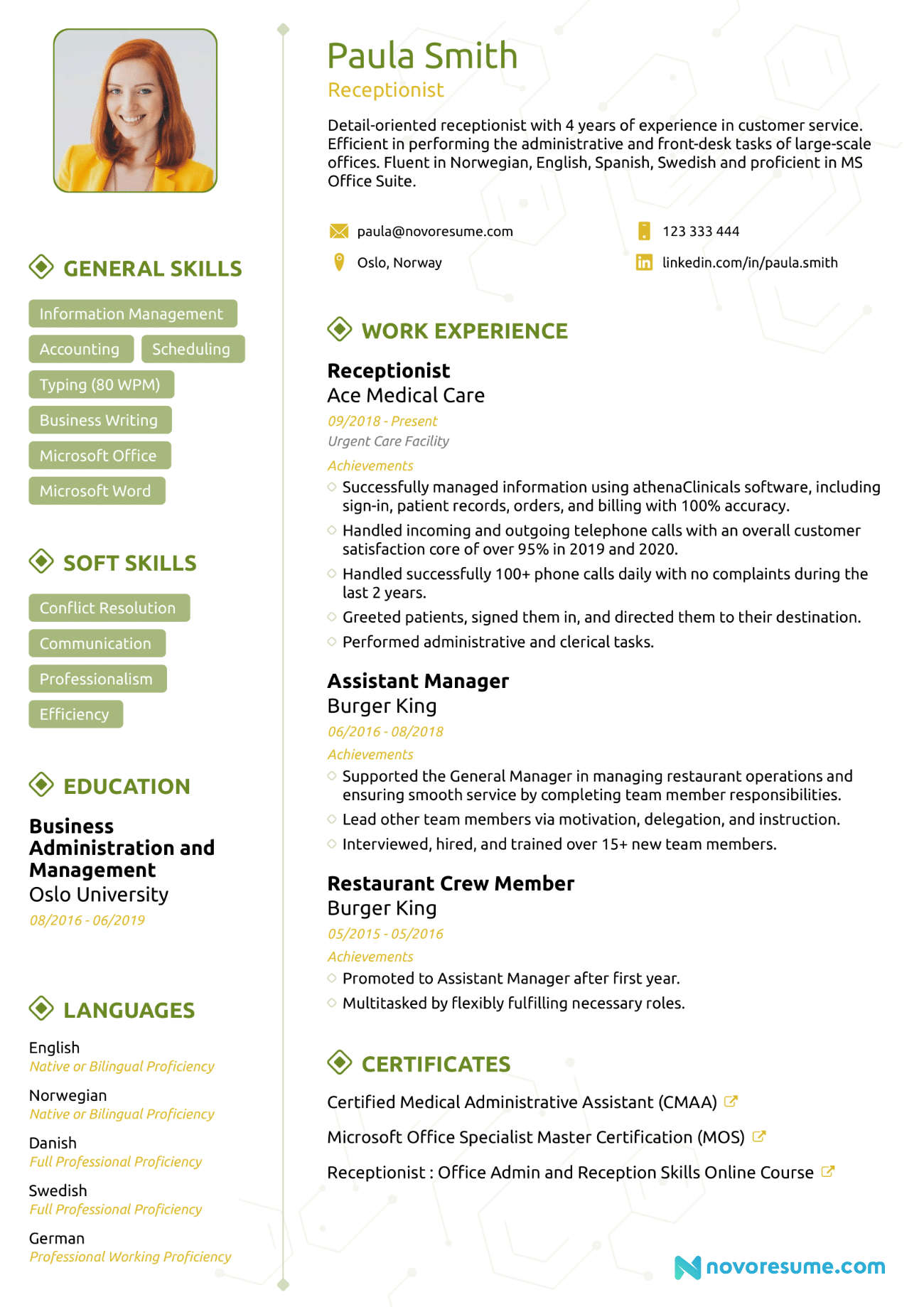
Check out our full guide to writing a receptionist resume here.
Want to see more examples? Check out our compilation of 80+ resume examples for different fields .
- Administrative Assistant Resume
- Bartender Resume
- DevOps Engineer Resume
- Executive Assistant Resume
- Flight Attendant Resume
- Graphic Designer Resume
- Paralegal Resume
- Pharmacist Resume
- Recruiter Resume
- Supervisor Resume
Next Steps After Your Resume
Now that we’ve covered everything you need to know about how to make a resume, it’s time to talk about the rest of your job application.
After all, your resume is only the first step in your job search. To land the job you deserve, you also need to write a captivating cover letter and ace that upcoming interview. Here’s how:
#1. How to Write a Convincing Cover Letter
The companion piece to every resume is the cover letter.
Most job-seekers flinch when they hear that they have to write a cover letter. What do you even mention in a cover letter, anyway? If you were good at writing cover letters, you’d be applying for a job as a writer !
In reality, though, writing a cover letter is very simple once you know its purpose.
Think of your cover letter as a direct message to the hiring manager. It’s your chance to briefly explain why you’re such an awesome fit for the position. And with a few cover letter tips to point you in the right direction, you’ll write the perfect cover letter for your job application.
Just follow this structure:
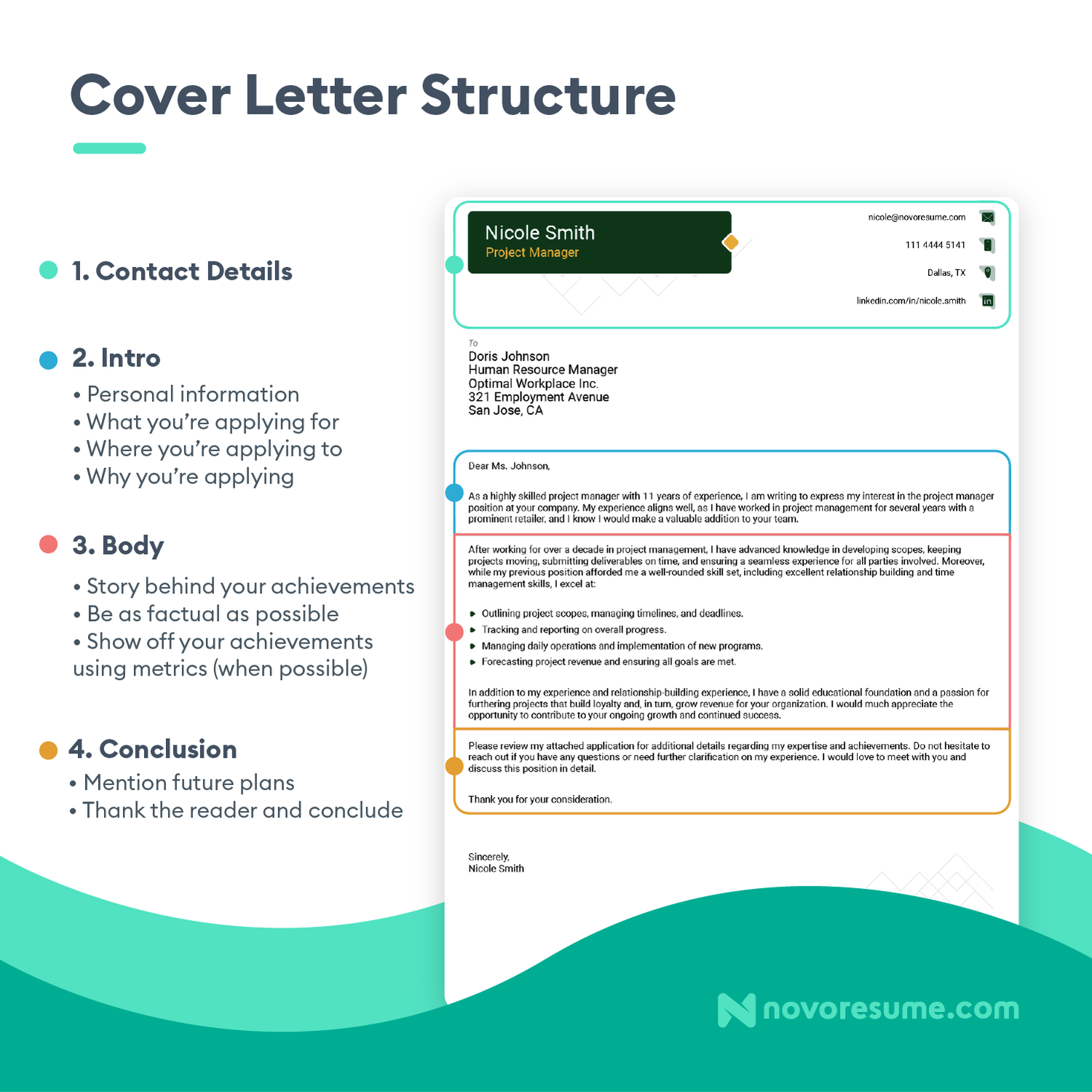
- Add the contact details. Include the same contact information as on your resume, plus additional contact details for the hiring manager, including their name, job title, the company’s name, and location.
- Introduce yourself. Start your cover letter by mentioning who you are, what your work experience is, and why you’re interested in the position. Mention a standout achievement or two, relevant skills, and what you’d like to do for the company you’re applying for.
- Explain why you’d excel at the job. Find the requirements in the job ad that you meet, and elaborate on how you fulfill the most important ones. Research the company so you know what you like about it, and mention it in your cover letter. Make sure to convey your enthusiasm for the job and confidence that you’ll be a great fit for their team.
- Wrap it up politely. Conclude your cover letter by recapping your key selling points and thanking the hiring manager for their time. Then add a call to action, such as “Please don’t hesitate to reach out to me at the provided phone number so that we can discuss my application in greater detail.” Then, add a closing line and follow it with your full name.
Sounds easy, right? Here’s a real-life example to drive the point home:
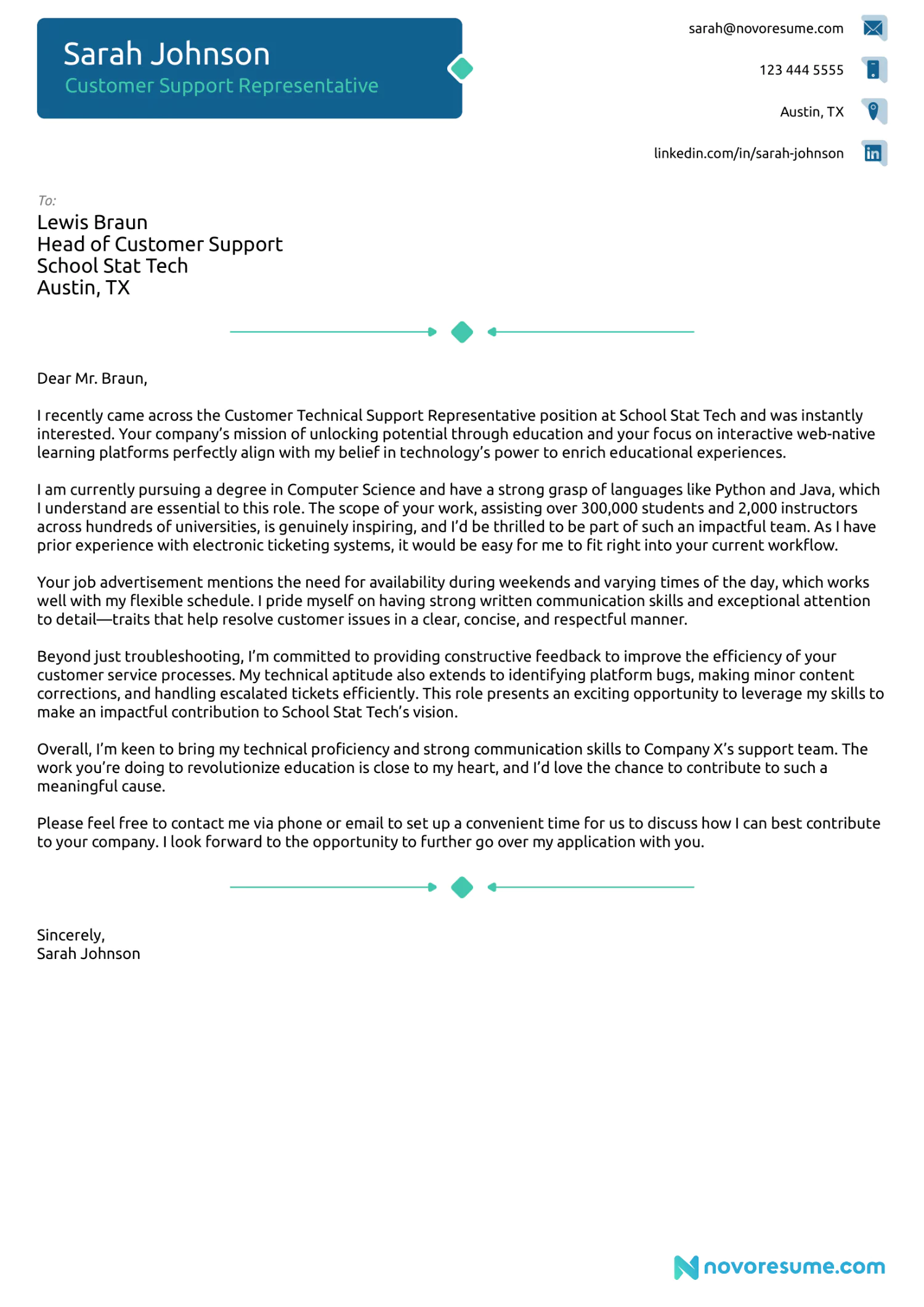
Do you need more help perfecting your cover letter? Learn what the most common cover letter mistakes are and check out cover letter examples for all professions here.
#2. How to Ace Your Next Interview
Once you’ve perfected both your resume and cover letter, there’s only one thing left.
It’s time for the final step—the dreaded job interview.
Whether you’re an extrovert or an introvert, you probably hate the interviewing process. No matter how experienced you are, it can be nerve-wracking. Sitting there while someone’s prodding into your past experiences and judging you isn’t fun.
But did you know that most interviewers ask the same questions?
That’s right—all you have to do is learn how to answer some of the most common interview questions, and you’ll be an interview away from landing your dream job!
Just check out our complete guide to the 35+ Job Interview Questions and Answers and learn how to ace your next interview.
FAQs on How to Make a Resume
Do you still have some questions about making a resume? Check out the answers to the most frequently asked questions below!
#1. What does a good resume look like in 2024?
For your resume to look good in 2024, make sure it’s organized and clean and isn’t longer than one page.
Be sure to include information that adds value to your application—leave out the focus on your relevant work experience and skills that you can back up, and list as many achievements as possible.
If you’re using a resume template, choose one based on your industry. Conservative industries like law, banking, and business require more traditional resume templates. But if you’re going for an industry like design, architecture, or marketing, you can go for a creative resume template .
Remote work is also big in 2024, so if that’s what you’re after, tailor your resume to match the job you want.
#2. How do you make a resume in Word?
The best way to create a resume in Word is to use a pre-designed Microsoft Word template. To access them, you should:
- Open MS Word
- Click “file” from the menu bar
- Select “new”
- Type “resume templates” in the search bar
That said, Word resume templates are generic, hard to personalize, and overall not very stylish.
Want a resume that looks good and is extremely easy to make? Check out resume templates to get started!
#3. How do I write a resume for my first job?
If you’re writing your first-ever resume for an entry-level position, the hiring manager won’t expect you to have any work experience.
However, you can make up for your lack of experience with your skills and academic achievements.
For example, you can take advantage of extracurricular activities, internships, volunteering experiences, and other non-professional experiences. You can use them to highlight the skills you’ve gained and what you’ve achieved so far.
So, your first job resume should have a resume objective, emphasize your education, and replace your work experience with any internships, volunteering, independent projects, or other experiences.
#4. How to make a resume on Google Docs?
You can make a resume on Google Docs by choosing one of their templates and filling it in on the go.
All you have to do is go to your Google Drive’s template gallery, choose your preferred template, fill in your information, and your Google Docs resume is ready to go!
That said, Google Docs templates aren’t the most user-friendly choice. You don’t have much flexibility with the layout and formatting isn’t that easy. For example, you tweak a section to the slightest, and the whole resume becomes a mess.
If you want an easier option, check out our resume builder !
#5. What kind of resume do employers prefer?
Typically, employers prefer one-page-long resumes that follow the reverse chronological format.
Hiring managers receive hundreds of resumes every day, so they don't have the time to read three-page resumes. Try one of our one-page resume templates so you don’t go over the recommended resume length.
Meanwhile, the reverse-chronological format is the most popular because it draws attention to your most recent jobs and professional achievements, which is the #1 most important thing hiring managers look at when evaluating a resume.
#6. How many jobs should you put on your resume?
You should only include relevant job positions on your resume.
This means that your work experience section should be tailored to the job you are applying for. If you’ve worked five different jobs and they can all add value to your current application, then you should include all five.
If, on the other hand, you’re applying for, say, a customer service position and some of your past jobs don’t have anything to do with customer service, you should skip them.
#7. Should I put my address on my resume?
You can put your location (city, state, or country) on your resume, but you don’t need to put your entire physical address.
Putting a physical address on a resume was the norm back when companies would contact you via mail. In today’s world, everyone communicates via email, which is why adding a correct and professional email address to your contact information section is far more important than putting your physical address.
So, just include your location or-–if you’re a remote worker—specify you prefer to work remotely by writing “working remotely from [location].”
#8. What information should I leave out of my resume?
As a general rule, you shouldn’t include your birthday or your headshot on your resume. This norm varies from country to country but it applies to the USA, Canada, and UK.
If you have plenty of achievements to list under your work experience, then you can leave your basic work responsibilities out of your resume.
In your education section, you should only include your highest and most recent degree. So, if you hold a Ph.D., you can list that and your Master’s degree and leave your Bachelor’s degree and high school diploma out.
Finally, leave out any skills that aren’t relevant to the job you’re applying for.
#9. Is a resume a CV?
Depending on where you are, a CV (Curriculum Vitae) and a resume might be completely different things.
In most of the world, though, including Europe and Asia, they are used interchangeably for the same document. Both CVs and resumes are one to two pages long, and list skills and experiences relevant to the position you’re applying for.
Sometimes more detailed resumes that go over one page are referred to as CVs. These are typically only used by senior professionals, executives, CEOs, etc.
In the USA, however, a CV is a completely different document. Typically, CVs are detailed and comprehensive documents that highlight your entire academic and professional history. They’re often used for academic, scientific, or research positions, which is why this type of CV can also be referred to as an academic CV.
You can create your CV using one of our CV templates !
#10. Should I write my own resume?
Yes, you should always write your own resume.
Your resume is your opportunity to show the hiring manager your communication, writing, and presentation skills . Employers also evaluate you based on how effectively you can convey information about yourself, and there’s no one that can represent you better than yourself.
Writing your own resume lets you introduce yourself authentically. You have the best understanding of your skills and experiences, and you can personalize them to make your resume stand out.
And, as a bonus, the experience of writing your resume yourself can be reflective and insightful, so it might help you understand your professional journey and career goals better.
#11. Can a resume be two pages?
Generally, we strongly recommend that your resume stick to one page.
Hiring managers go through hundreds of resumes every day, and keeping your resume to one page increases the odds that they’ll see your qualifications faster.
In some cases, like when you have a lot of relevant experience, your resume can go over two pages. But this exception is reserved for senior professionals with over a decade of relevant experience and tons of skills and achievements that simply can’t fit on one page.
#12. Is a simple resume okay?
Absolutely, a simple resume is often more than okay—it's preferable.
Before your resume even gets to the hiring manager, a complicated layout could get it rejected by the applicant tracking system (ATS). A simple resume template can help get your application straight to the hiring manager.
A clean layout can also make sure that your resume is easily readable and looks professional. This can focus the hiring manager's attention on your work experience and skills without excessive clutter or flashy colors to distract them.
Key Takeaways
And that’s a wrap!
If you’ve followed all of our advice until now, congrats! You’re probably an expert on how to make a resume.
To recap, let’s go through some of the most important lessons we’ve learned so far...
- Use the right resume builder to make the process as smooth as possible. You don’t want to mess around with formatting for hours before even starting to work on your resume!
- Focus on your achievements over responsibilities. This can help you stand out from all the other applicants, especially if you back your claims up with data.
- Include all the must-have sections, like the resume summary, work experience, education, and skills. Then leverage optional sections if you have leftover space.
- Tailor your resume for the job you’re applying for. Everything listed on your resume should be relevant to the specific job you’re applying for, and you should write a new resume for every new job application.
- Take the time to perfect your cover letter. It’s just as important as your resume, so make sure you pay as much attention to it!

To provide a safer experience, the best content and great communication, we use cookies. Learn how we use them for non-authenticated users.
Start a Resume Writing Business
Transforming Job Seekers' Notes into Tickets to Their Dream Jobs

RESUME WRITING BUSINESS
Related business ideas, discover your perfect domain, resume writing mini business plan, business idea: resume writing business, expected percent margin:, earnings expectations:, actions to hit those numbers:, pricing and services:, marketing and customer acquisition:, sales and customer experience:, business operations:, not what you had in mind here are more ideas, grab your business website name, step 1: determine if starting a resume writing business is right for you, breakdown of startup expenses, breakdown of ongoing expenses, examples of ways to make money, step 2: name your business, register your business, step 3: create a business plan, description of the business, services offered, target market, marketing plan, financial plan, management plan, step 4: obtain licenses and permits, obtaining licenses and permits, benefits of obtaining licenses and permits, step 5: choose a business structure, advantages and disadvantages of different business structures, tips for choosing a business structure, step 6: set up your business, setting up your business location, setting up your business finances, step 7: market your business, tips for marketing your business, step 8: hire employees, where to find employees, how to interview potential employees, how to train employees, step 9: grow your business, tips for growing your business, explore more categories, take the next steps.
- Career Blog
The Business Resume Guide: 10+ Samples & Examples for 2024

A business resume is an essential tool that can make or break a job seeker’s chances of landing their dream job. It serves as a reflection of their skills, qualifications, and experiences, which can convince potential employers that they are the right candidate for the job. Despite its significance, creating a business resume can be a daunting task, especially for those who are new to the workforce or changing careers.
The purpose of this article is to provide job seekers with a comprehensive guide to creating a compelling business resume. This article will explore various tips, tricks, and best practices to help job seekers craft a polished and professional business resume that stands out from the competition. Whether you are a seasoned professional or a recent graduate, this guide is designed to cater to your specific needs and provide you with the tools to create a strong business resume.
The article aims to provide a broad overview of everything job seekers need to know about crafting an effective resume, from choosing the right format to highlighting their skills, experiences, and achievements. In addition to discussing industry standards and best practices, the article will also provide 10+ real-life examples of successful business resumes.
The Business Resume Guide aims to serve as a go-to resource for job seekers looking to create or improve their business resume. By the end of this article, readers will have a clear understanding of what makes a great business resume and the tools to create one that showcases their strengths and experiences effectively.
Formatting and Design
To make your resume stand out from the competition, it’s important to pay attention to formatting and design. This section covers three key elements to ensure your resume makes a lasting impression: selecting the right font, choosing the right template, and creating a visually appealing layout.
A. Selecting the Right Font
The font you choose can have a significant impact on the overall look and feel of your resume. When selecting a font, keep in mind that it should be easy to read, professional, and consistent throughout the entire document.

There are a few classic font choices that are universally accepted in the business world, such as Times New Roman, Arial, and Calibri. However, if you want to stand out a bit more, consider using a font with a modern twist like Georgia, Helvetica, or Proxima Nova.
Regardless of the font you choose, ensure that it is no smaller than 11-point size and that the spacing is appropriate for easy reading.
B. Choosing the Right Template
The template you choose for your resume can have a significant impact on how it is perceived by recruiters and hiring managers. Templates can range from classic and conservative to modern and colorful, so it’s important to choose the right one based on the type of position you’re applying for and your personal style.
Consider using a template that reflects the industry you’re applying to, as some industries may favor certain designs or colors. For example, if you’re applying for a creative role, a template with a pop of color or unique design elements may be appropriate. However, if you’re applying for a more traditional role like accounting, a more conservative template may be favorable.
C. Creating a Visually Appealing Layout
Beyond selecting the right font and template, the overall layout of your resume plays a critical role in catching the eye of recruiters and hiring managers. A visually appealing layout should be easy to read, well-organized, and emphasize your key skills and experiences.
Consider breaking up blocks of text with bullet points or section headers to make it easier for the reader to scan. Utilize white space to ensure that the content is not too cluttered, and use a consistent color scheme and font throughout the document.
A visually appealing layout can make your resume stand out and increase your chances of landing an interview for your dream job.
Essential Elements of a Business Resume
A business resume is a document that highlights your professional accomplishments and showcases your skills and experience to potential employers. It’s important that your resume is well-organized and contains all the essential elements that recruiters and hiring managers expect to see. Here are the essential elements of a business resume:
A. Contact Information Your contact information should be listed at the top of your resume so that employers can quickly and easily get in touch with you. Make sure to include your full name, phone number, email address, and physical address. It’s also a good idea to list any relevant social media profiles or professional website.
B. Professional Summary Your professional summary is a brief statement that summarizes your experience, skills, and career goals. This section should be tailored to the specific job you’re applying for and highlight why you’re the best candidate for the role.
C. Work Experience The work experience section of your resume should include a list of your previous jobs, along with details about your responsibilities and accomplishments in each role. Organize your work experience in reverse chronological order, starting with your most recent position.
D. Education List your educational background, including your degree(s), major(s), and any relevant coursework or certifications. If you don’t have a college degree, you can still include any relevant education or training you’ve completed.

E. Skills Your skills section should list the specific skills and knowledge you’ve acquired over the course of your career. Be sure to include both hard skills and soft skills, as both are important for employers to know about.
F. Achievements This section should highlight your most significant achievements in your previous roles. Quantify your accomplishments where possible, using numbers and statistics to demonstrate your impact on the business.
G. Certifications and Licenses If you hold any relevant certifications or licenses, be sure to list them in this section. This can help to demonstrate your expertise and qualifications for the job.
H. Volunteering and Extracurricular Activities Include any relevant volunteering or extracurricular activities you’ve participated in, as these can demonstrate important skills and qualities like leadership, teamwork, and communication.
In order to make sure your business resume is effective, it’s important to tailor it to the specific job you’re applying for. Customize your resume to highlight your most relevant skills and experience for each job, and make sure to proofread your resume carefully to avoid any errors or typos. With these essential elements, you’ll be well on your way to creating a winning business resume that can help you get the job you want.
Tailoring Your Business Resume
When it comes to creating a business resume, it’s important to tailor it to the specific job and company you’re applying to. Here are some steps you can take to ensure your resume stands out from the rest:
A. Researching the Company
Before you start crafting your resume, it’s important to do some research on the company you’re applying to. This will help you get a better understanding of their mission, values, and culture. You can often find this information on their website, social media pages, or through company reviews online.
B. Identifying Key Traits and Skills Required by the Job
Once you have a better understanding of the company, you can then start identifying the specific traits and skills they’re looking for in their ideal candidate. The job posting will often give you a good indication of what they’re looking for, but you can also do some research on the industry and position to get a better idea.
C. Highlighting your Relevant Experiences and Accomplishments
Finally, it’s important to tailor your resume to match the specific job and company you’re applying to. This means highlighting your relevant experiences and accomplishments that demonstrate the traits and skills they’re looking for. Use concrete examples and data to showcase your achievements and how they align with the company’s needs.
In a competitive job market, tailoring your resume can make all the difference. By doing your research and highlighting your relevant experiences and accomplishments, you can increase your chances of landing your dream job in the business world.
Dos and Don’ts for Writing a Business Resume
When it comes to writing a business resume, there are certain dos and don’ts that you must keep in mind. A well-written business resume can be the key to landing your dream job, so it’s important to get it right. In this section, we will discuss the common mistakes to avoid, best practices for writing a business resume and tips for staying on track.
A. Common Mistakes to Avoid
Typos and grammatical errors: A business resume should be error-free. Typos and grammatical errors can make a bad impression on the hiring manager.
Being too generic: Avoid creating a generic business resume. Generic language and bullet points will make you blend in with hundreds of other applicants.
Lack of focus: Your business resume should be focused on your skills and experience that are relevant to the job you are applying for. Irrelevant information can make it hard for the hiring manager to understand your strengths.
Not using keywords: Many companies use applicant tracking systems (ATS) that scan resumes for specific keywords. Not using relevant keywords in your resume can lead to the resume being rejected by the ATS.
Listing responsibilities instead of accomplishments: Instead of listing job responsibilities, focus on accomplishments. Highlight what you achieved in your previous role and how it added value to the company.
B. Best Practices for Writing a Business Resume
Tailor your resume for the job: Customize your business resume to fit the specific job requirements. This will show the hiring manager that you have the necessary skills for the role.
Use bullet points: Use bullet points to make your resume easy to read. Be specific and concise with each bullet point.
Quantify your achievements: Use numbers to quantify your achievements. For example, instead of saying you increased sales, say you increased sales by 20%.
Use action verbs: Begin each bullet point with an action verb. Action verbs make your resume more engaging and show what you are capable of.
Keep it to one page: A business resume should be no longer than one page. Keep it concise and to the point.
C. Tips for Staying on Track
Create a strong opening statement: The opening statement is the first thing the hiring manager will read. Create a strong statement that will grab their attention.
Stay consistent: Use the same format throughout your business resume. This will make it easy for the hiring manager to read and understand.
Proofread: Proofread your business resume multiple times before submitting it. Ask a friend or family member to proofread it as well.
Focus on results: Highlight your results and how they contributed to the company’s success. This will show the hiring manager what you can bring to their company.
Dos and Don’ts for Formatting a Business Resume
When it comes to formatting a business resume, there are a few dos and don’ts that can help ensure your document looks professional and polished. In this section, we’ll cover some common formatting errors to avoid, best practices for formatting your resume, and tips for keeping your format consistent.
A. Avoiding Common Formatting Errors
One of the biggest mistakes job seekers make when formatting their resumes is using inconsistent fonts and formatting. To avoid this common error:
- Use one font throughout your resume. It’s best to choose a simple, easy-to-read font like Arial or Times New Roman.
- Keep your font size consistent. Use a font size between 10 and 12 points for the body of your resume and a slightly larger size for headings.
- Use bold, italics, and underlining sparingly. Only use these formatting options to highlight important information and make it stand out.
Another common formatting error is using too much white space or leaving too little white space. To strike a balance:
- Use margins of at least 0.5 inches on all sides of your resume.
- Use bullet points to break up large blocks of text.
- Use headings to organize your content and make it easier to read.
Finally, be sure to save your resume as a PDF file so that your formatting stays intact when you send it to potential employers. Word documents can sometimes be altered and lose their original formatting.
B. Best Practices for Formatting a Business Resume
Now that you know what formatting errors to avoid, let’s talk about some best practices for formatting a business resume:
- Use a professional email address. If your email address is quirky or inappropriate, potential employers might not take you seriously.
- Include a professional summary or objective statement at the beginning of your resume. This should be a brief, compelling statement that showcases your skills and experience.
- List your work experience in reverse chronological order, starting with your most recent job.
- Use measurable achievements to demonstrate your accomplishments at each job. For example, instead of saying “increased sales,” say “increased sales by 15% in Q1 2021.”
- Use keywords from job postings in your resume. This can help your resume get past applicant tracking systems (ATS) and into the hands of human hiring managers.
- Keep your resume to one or two pages. Unless you have a lot of relevant experience, you don’t need a longer resume.
C. Tips for Keeping Your Format Consistent
Consistency is key when it comes to formatting a business resume. Here are a few tips to help you keep your format consistent:
- Use a template. There are plenty of free resume templates available online that can help you ensure consistency in your formatting.
- Use headings consistently. For example, if you use “Work Experience” as a heading, use it consistently throughout your resume.
- Use the same formatting for each job listing.
The Business Resume Guide: 10+ Samples & Examples
Sample business resumes.
If you’re currently in the job market and embarking on a job hunt, having a great resume is key to making a good impression on potential employers. In this section, we’ve put together four sample business resumes that cover a range of positions and experience levels.
A. Entry-Level Business Resume Sample
If you’re just starting out in your business career, the entry-level business resume sample is for you. This resume emphasizes your education and any relevant internships or work experience you may have. It should highlight your skills and eagerness to learn and develop in your field.
B. Experienced Business Professional Resume Sample
For those who have a track record of success within their field, the experienced business professional resume sample is the way to go. This resume should demonstrate your previous business accomplishments, including any leadership positions you’ve held or projects you’ve managed. It should also showcase any specialized skills or certifications you’ve acquired throughout your career.
C. Business Development Manager Resume Sample
If your goal is to land a senior-level role in business development, the business development manager resume sample is the way to go. This resume should focus on your leadership experience, sales and marketing skills, and your ability to build and maintain relationships with clients.
D. Business Analyst Resume Sample
For those who are analytical and have a keen eye for detail, the business analyst resume sample is a great option. This resume should focus on your experience in analyzing data, problem-solving, and project management. It should also highlight any experience you have with software and technology tools relevant to your field.
No matter what stage of your career you’re in, the right business resume can make all the difference in landing your dream job. Use these sample resumes as a guide as you craft your own and tailor it to the specific job and company you’re applying to. Best of luck on your job hunt!
Business Resume Examples: Achievements and Accomplishments
When it comes to crafting an impressive business resume, highlighting your achievements and accomplishments can make all the difference. However, it’s important to do so in a way that effectively showcases your skills and experiences, without coming across as boastful or arrogant. Here are some tips for explaining your accomplishments on your business resume:
A. Explaining Your Accomplishments
First and foremost, it’s important to frame your accomplishments in a way that demonstrates their relevance to the job you’re applying for. Use specific examples and metrics to show how your actions contributed to specific positive outcomes, whether that be increased revenue, improved efficiency, or strengthened relationships with clients or partners.
Additionally, try to focus on accomplishments that demonstrate transferable skills, such as leadership, problem-solving, and communication. These are qualities that are highly in demand in the business world, and highlighting them can help set you apart from other candidates.
It’s also important to be concise and clear in your language, using active verbs to describe your actions and outcomes. Avoid buzzwords or vague terminology that might not be meaningful to the reader.
B. Examples of Accomplishments to Include on Your Business Resume
When it comes to specific examples of accomplishments to include on your business resume, there are a few key areas to consider:
1. Revenue growth
If you’ve played a role in increasing revenue for a previous employer, be sure to highlight this on your resume. This could include spearheading a successful marketing campaign, increasing sales through strategic partnerships or negotiations, or finding innovative ways to cut costs.
Example: “Led a team that launched a targeted email campaign resulting in 20% increase in revenue within six months.”
2. Process optimization
Streamlining processes and improving efficiency can have a significant impact on a company’s bottom line. If you’ve played a role in identifying and implementing process improvements, be sure to highlight this on your resume.
Example: “Developed and implemented a new project management system resulting in a 30% decrease in project timelines and a 15% increase in team productivity.”
3. Leadership and team building
Demonstrate your ability to lead and inspire a team by showcasing accomplishments that demonstrate your leadership skills. This could include successfully managing a team through a challenging project, mentoring and developing team members, or orchestrating successful team-building activities.
Example: “Led a cross-functional team of 10 in the successful launch of a new product line, resulting in $1M in sales within the first year.”
4. Client or partner relationships
Strong relationships with clients and partners are essential to success in many business roles. If you’ve played a role in building and managing relationships with key stakeholders, be sure to highlight this on your resume.
Example: “Negotiated and secured a multi-year contract with a key client, resulting in a 25% increase in annual revenue.
Business Resume Examples: Skills and Qualifications
When crafting your business resume, it’s important to highlight your skills and qualifications that are most relevant to the position you are applying for. In this section, we’ll discuss how to identify these skills and provide some examples to help you include them on your resume.
A. Identifying Your Skills and Qualifications
To identify your skills and qualifications, start by thoroughly reviewing the job description and requirements. Look for specific skills or qualifications that the employer is seeking, such as proficiency in certain software programs, experience managing teams or budgets, or a particular degree or certification.
Next, think about the skills and qualifications that you possess that align with those requirements. Make a list of these skills, along with any others that may be relevant to the position, such as strong communication skills, problem-solving abilities, or leadership experience.
Remember to also consider transferable skills – those that may not be directly related to the job requirements, but that showcase your abilities in areas such as time management, organization, or adaptability.
B. Examples of Skills and Qualifications to Include on Your Business Resume
Here are some examples of skills and qualifications that you may want to include on your business resume, along with the types of positions or industries where they may be particularly relevant:
Project management: This skill is valuable in a wide range of business roles, from marketing and advertising to finance and operations. Be sure to highlight your experience managing projects, including your ability to coordinate timelines, resources, and stakeholders.
Data analysis: Many business positions require the ability to work with data to inform decision-making. If you have experience analyzing data using tools such as Excel or SQL, be sure to list this skill on your resume.
Customer service: If you are applying for a sales or client-facing role, highlighting your ability to provide excellent customer service can set you apart from other candidates. Examples may include experience handling customer complaints, responding to inquiries, or maintaining client relationships.
Leadership: Whether you are applying to manage a team or simply to demonstrate your potential as a future leader, highlighting your leadership experience is important. Examples may include managing a project team, leading a group or committee, or mentoring others.
Industry-specific knowledge: Depending on the industry or niche you are applying for, specialized knowledge may be critical to your success in the role. For example, a candidate for a healthcare administration position may want to highlight their knowledge of HIPAA regulations, while someone applying for a position in tech may want to showcase their understanding of programming languages.
Remember, the key is to identify the skills and qualifications that are most relevant to the position and industry, and to highlight them in a way that sets you apart from other candidates. With the right combination of skills and experience, you can create a powerful business resume that demonstrates why you are the best fit for the job.
Cover Letters for Business Resumes
A. introduction to cover letters.
A cover letter is a formal letter attached to a resume that serves as an introduction of a job applicant to a potential employer. It is an essential tool for job seekers as it provides a platform to highlight their qualifications and interest in a particular job. A cover letter should be concise, well-written, and tailored to the job description.
B. The Essential Elements of a Good Cover Letter
A good cover letter should consist of the following essential elements:
1. Introduction
The introduction should be captivating and should create a positive first impression. It is essential to start with a brief statement about the job you are applying for and why you are the best fit for the position.
The body should explain your qualifications and relevant experiences. It is important to highlight your skills and achievements that fit the job description. You may also explain how your experiences can contribute to the growth of the company.
In the closing, you should express your interest in the company and the job position. You may also request an interview or meeting to discuss your qualifications further.
C. Sample Cover Letters for Business Resumes
To help you create an effective cover letter, here are some sample cover letters for business resumes:
- Cover Letter for Business Development Manager
- Cover Letter for Financial Analyst
- Cover Letter for Marketing Manager
- Cover Letter for Sales Executive
- Cover Letter for Human Resources Manager
These sample cover letters demonstrate how to incorporate the essential elements of a good cover letter while tailoring it to each job description. Remember to also customize each cover letter to the company and its culture.
A well-crafted cover letter can greatly improve your chances of getting noticed by potential employers. It is an opportunity to showcase your qualifications and interest in a particular job. Use the tips provided and the sample cover letters to create a compelling cover letter that best represents you and your qualifications.
Proofreading and Editing Your Business Resume
As you work on creating a strong business resume that highlights your skills, experience, and achievements, it’s important to remember that even the smallest mistake can make a big difference in how you’re perceived by potential employers. To help you avoid common typos and errors, and make sure your resume is polished and professional, here are some tips for proofreading and editing your business resume.
A. Common Typos and Errors to Watch Out For
Spelling mistakes: Even one spelling mistake can undermine your credibility and attention to detail. Double-check the spelling of words, especially industry-specific terms and job titles.
Grammatical errors: Poor grammar can also harm your professional image. Pay special attention to subject-verb agreement, verb tenses, and punctuation.
Formatting inconsistencies: Consistency in formatting, font sizes, and bullet-point styles will help give your resume a polished and professional look.
Incorrect contact information: Make sure your phone number, email address, and other contact information are accurate and up-to-date.
False or misleading information: Never include false or misleading information on your resume. This can be grounds for disqualification or dismissal later in the hiring process.
B. Best Practices for Proofreading and Editing Your Business Resume
Take a break before proofreading: To catch mistakes, take a break from your resume before proofreading. Come back to it with fresh eyes and a clear head.
Use a checklist: Create a checklist of common mistakes that you’re prone to make, and go through each item on the checklist to ensure you’ve addressed it in your resume.
Read your resume out loud: By reading your resume out loud, you’ll be able to catch errors that might not be apparent when reading silently.
Have someone else review it: Ask a friend, family member, or colleague to review your resume. A fresh set of eyes can catch mistakes you might have missed.
Look for consistency and clarity: Make sure your resume is consistent in formatting, tone, and voice. Also, ensure that your resume is easy to read, with clear and concise language that effectively communicates your skills and accomplishments.
Proofreading and editing your business resume is a crucial step in creating a strong professional image and demonstrating attention to detail. By avoiding common typos and errors and following best practices, you can ensure that your resume is polished, professional, and reflects your qualifications and achievements.
Related Articles
- Information Technology (IT) Cover Letter: Samples & Tips
- Tricky Interview Questions and How to Answer Them in 2023
- Warehouse Packer Resume: Top Examples & Guide 2023
- Top Organizational Skills to Include on Your Resume in 2023
- The Best 10 Customer Service Jobs for 2023
Rate this article
0 / 5. Reviews: 0

More from ResumeHead


IMAGES
COMMENTS
Learn the steps to start a profitable resume writing service, from skill and certification to marketing and pricing. Find out the industry trends, challenges, and opportunities for resume writers.
Simple Marketing Ideas. Local Workshops: Organize workshops in community centers on 'Resume Building 101'. Social Media Presence: Regular posts, tips, and client testimonials on platforms like LinkedIn. Join and Engage in Online Groups: Like local job-seeking groups or professional forums. Collaborate with Bloggers: Write guest posts on career-focused blogs offering resume tips.
Learn the pros and cons of starting a resume writing business, the steps to follow and the challenges to overcome. Find out how to get certified, market your services and distinguish yourself from the competition.
Learn how to launch a resume writing business in 14 steps, from market research and competitive analysis to marketing and customer focus. Find out the costs, benefits, and challenges of this lucrative and growing industry.
Learn how to write a resume that gets you an interview with this comprehensive guide. Find out the best resume format, layout, tips, examples, and more.
RESUME WRITING MINI BUSINESS PLAN. This a quick reality check to help you identify the strengths and weaknesses of your business concept before you dive in. Business Idea: Resume Writing Business Expected Percent Margin: Gross Margin: 85-90%; Net Profit Margin: 30-50%. Earnings Expectations: Daily Earnings: $100 - $300; Weekly Earnings: $500 ...
Learn how to start a resume writing business with our 11+ step guide. From branding to marketing, we cover it all. Find out the market analysis, pricing, equipment, insurance, and more tips for your resume writing business.
Learn how to write a business resume that showcases your skills, experience, and achievements. Browse 9 resume examples for different business roles and get tips on format, summary, and skills.
Learn how to create a compelling business resume that showcases your skills, qualifications, and experiences. Find out the essential elements, formatting, design, and tailoring tips, as well as 10+ real-life examples of successful business resumes.
For those looking to start their own resume writing business, the #1 Resume Writing Business Plan Template & Guidebook is the ultimate resource. Jam-packed with actionable advice, this comprehensive guide will help you map out the right business plan, hone your craft, market yourself effectively, and grow your client base. ... It is a good idea ...